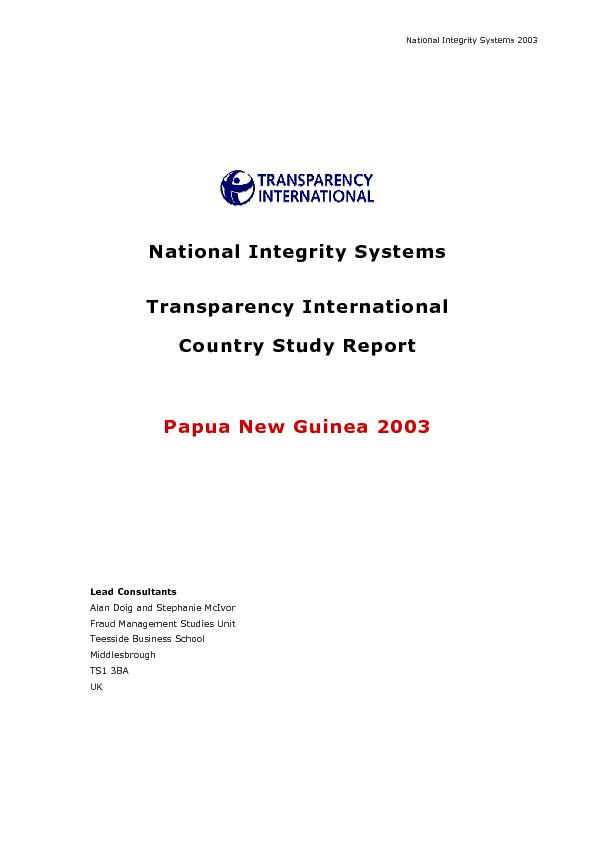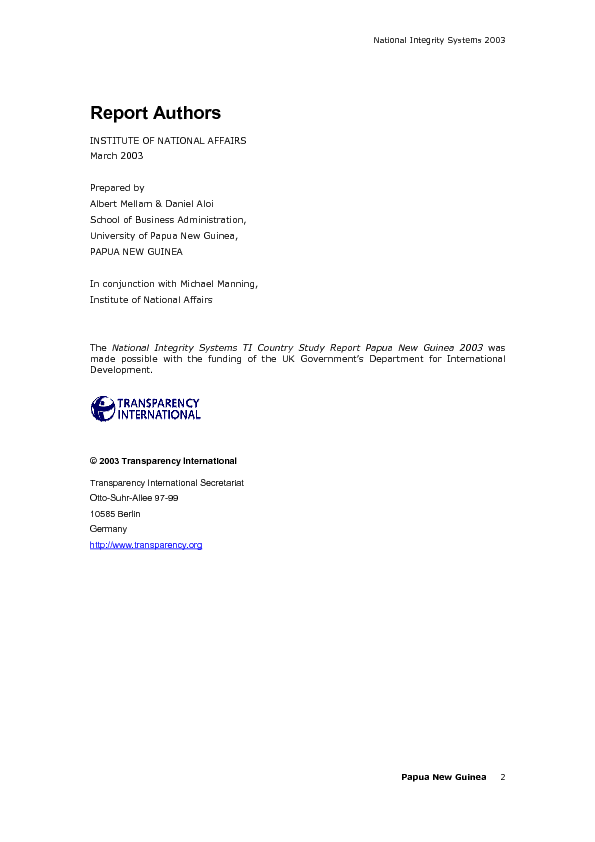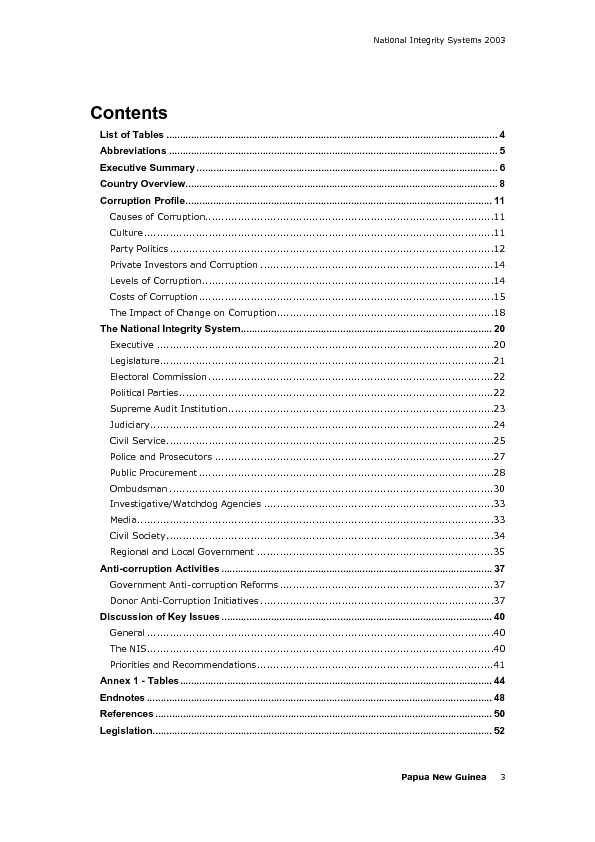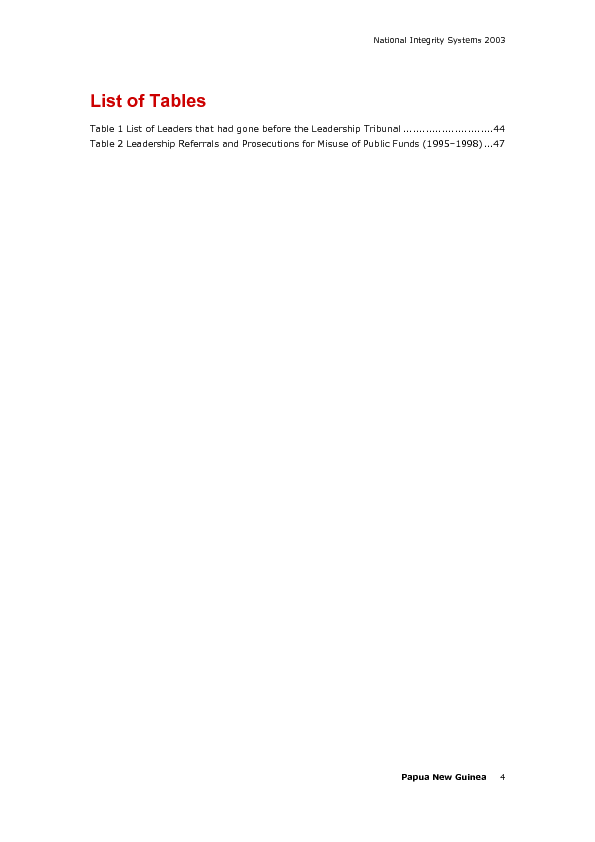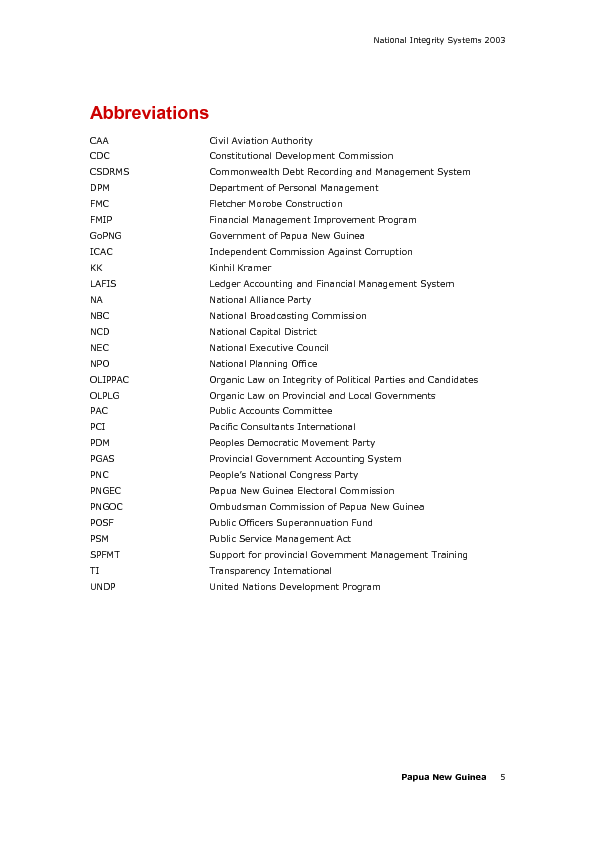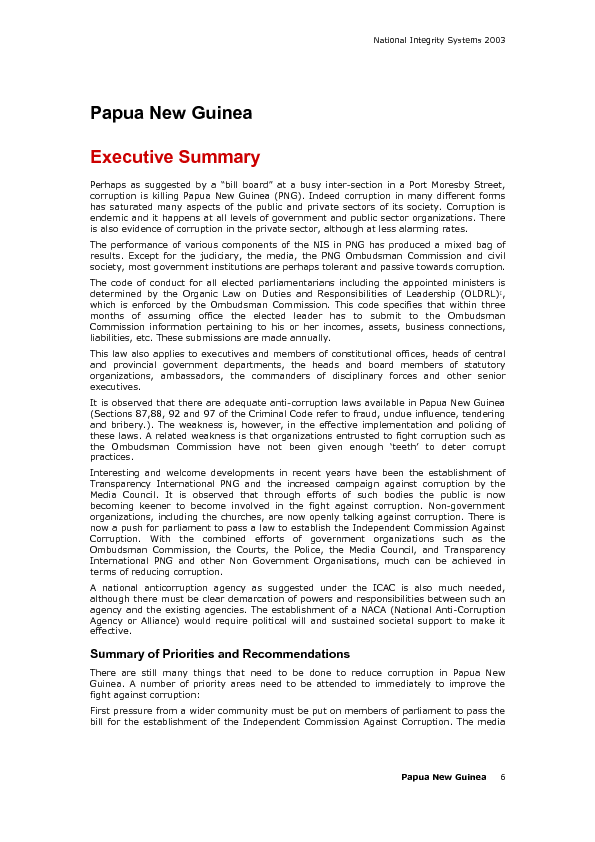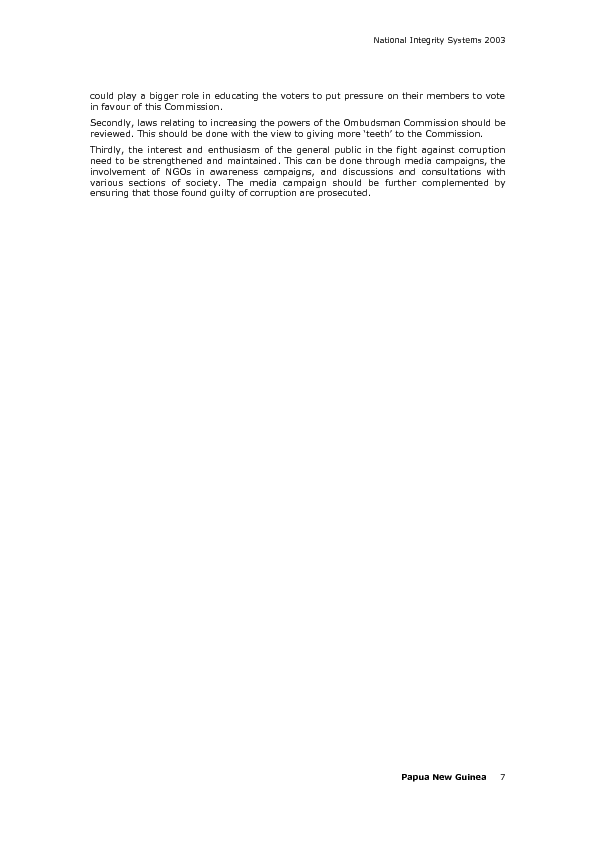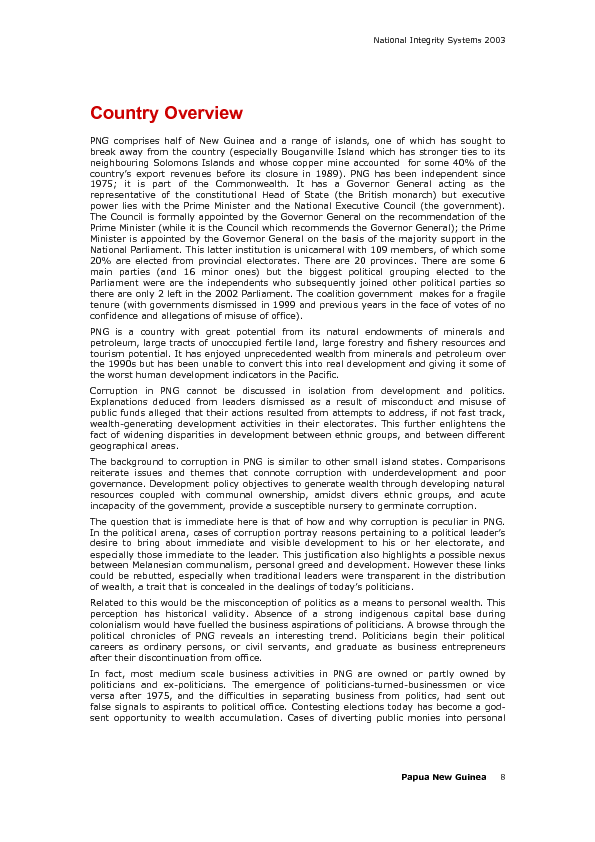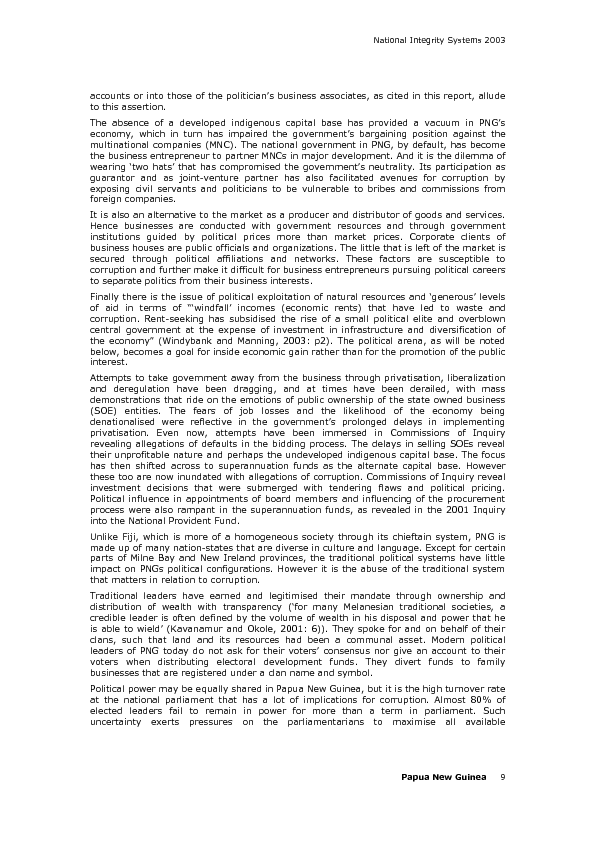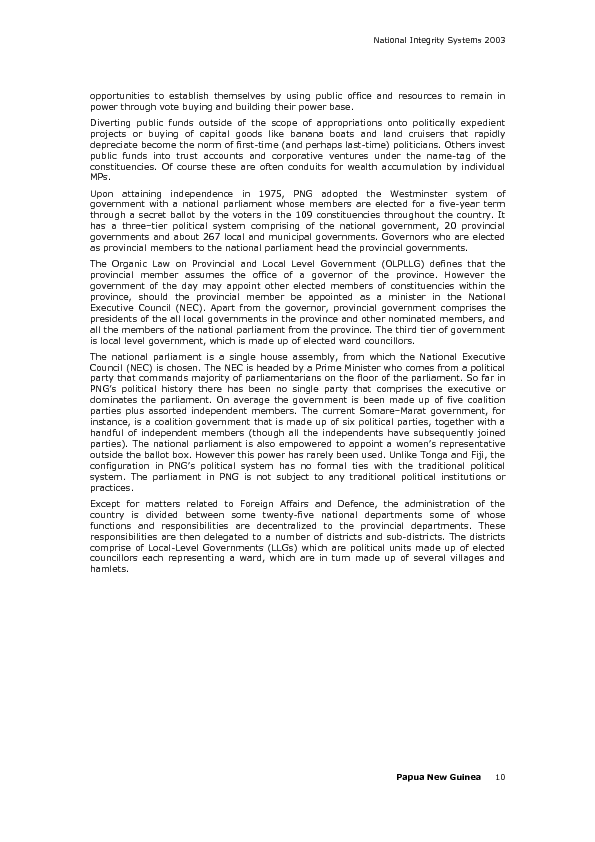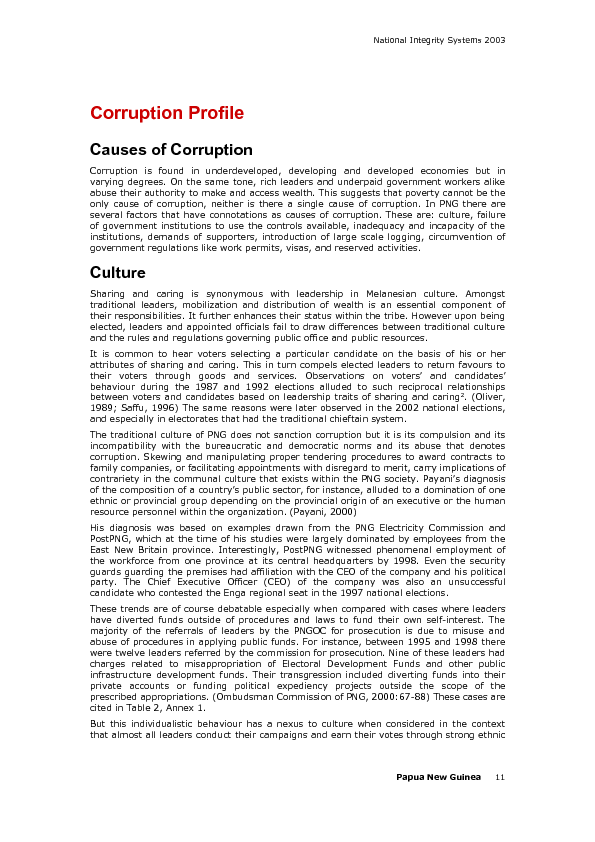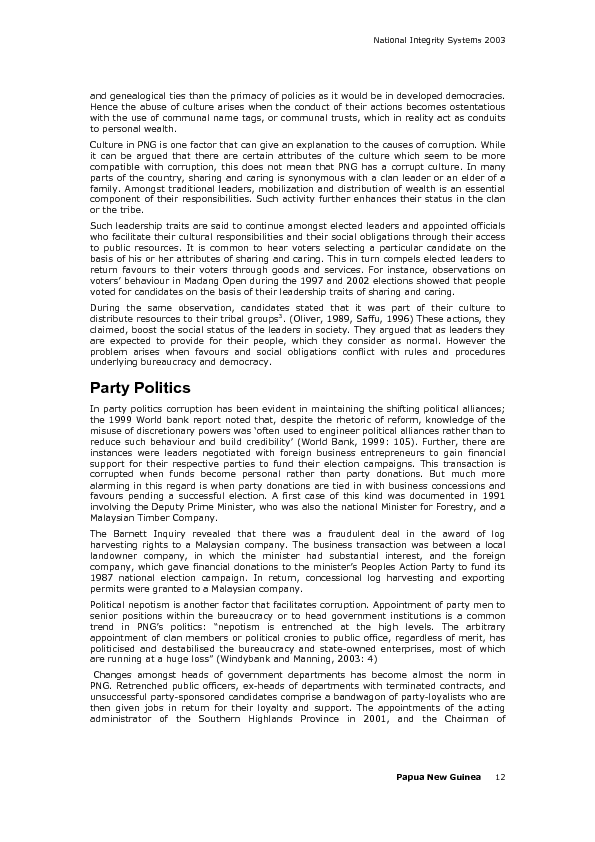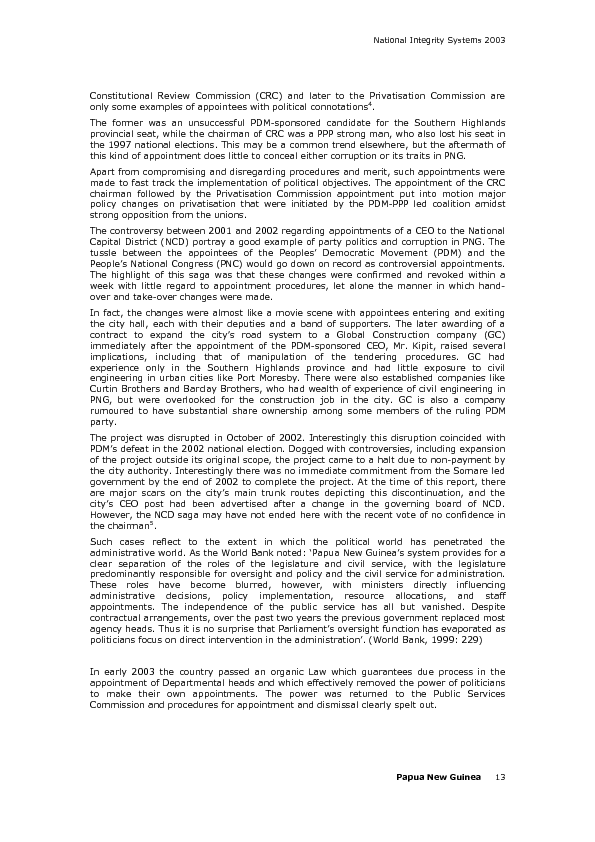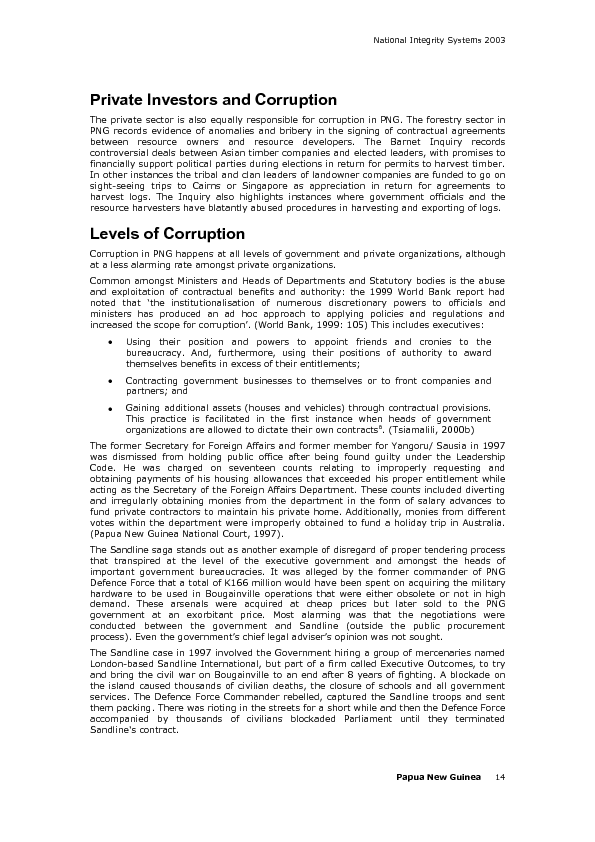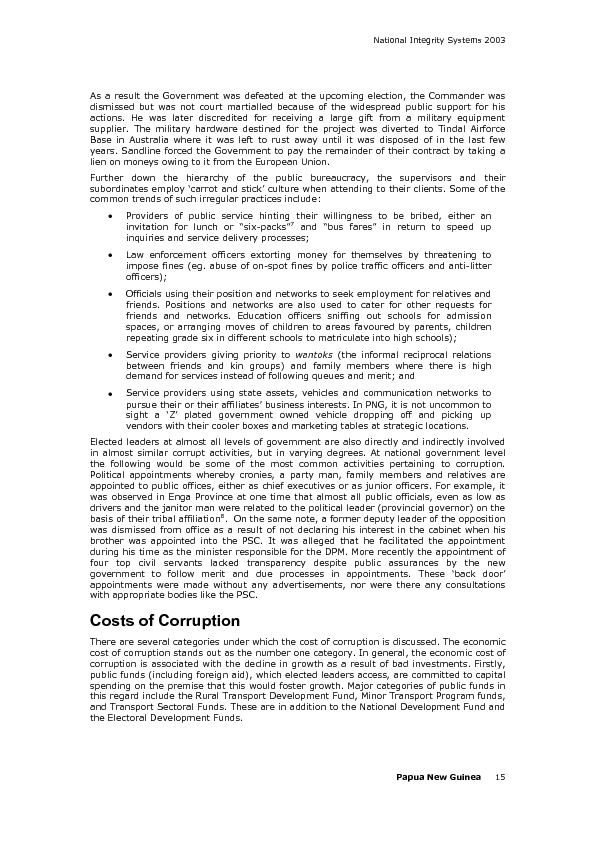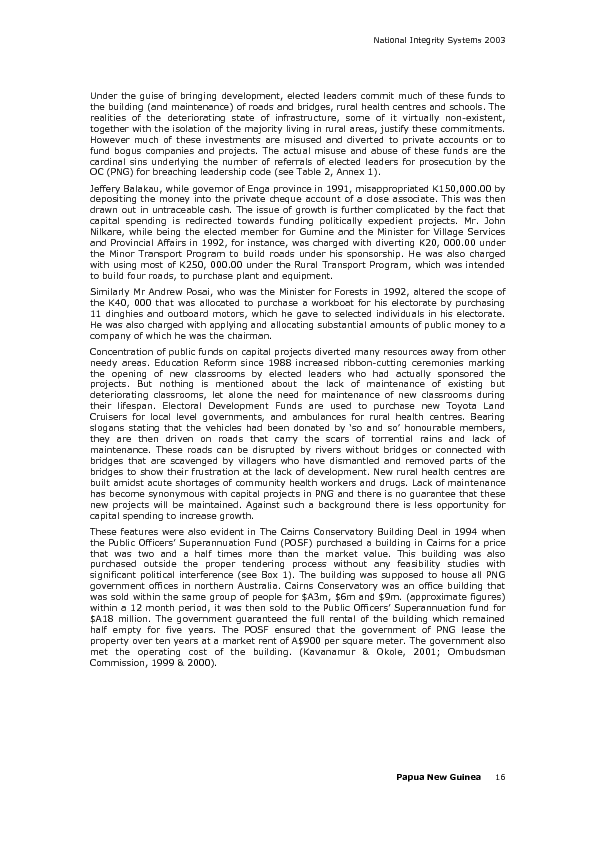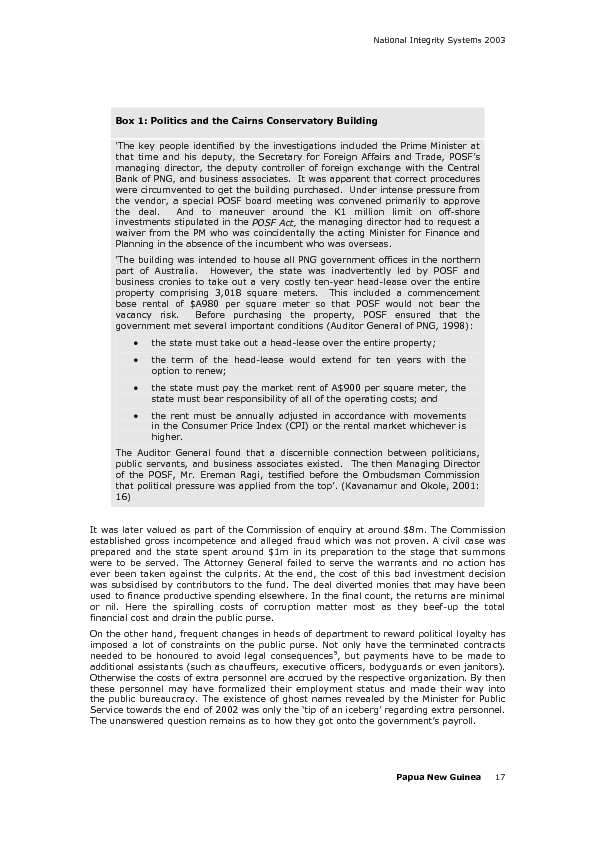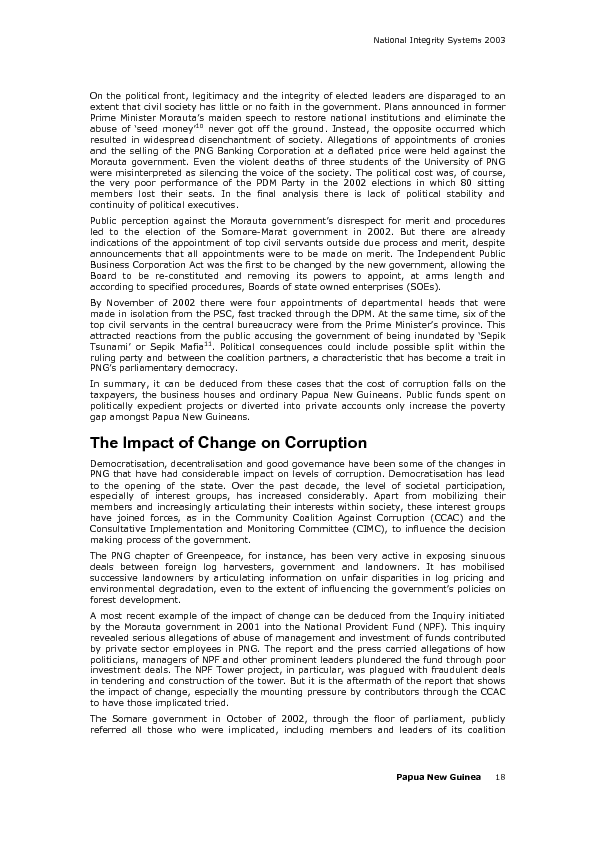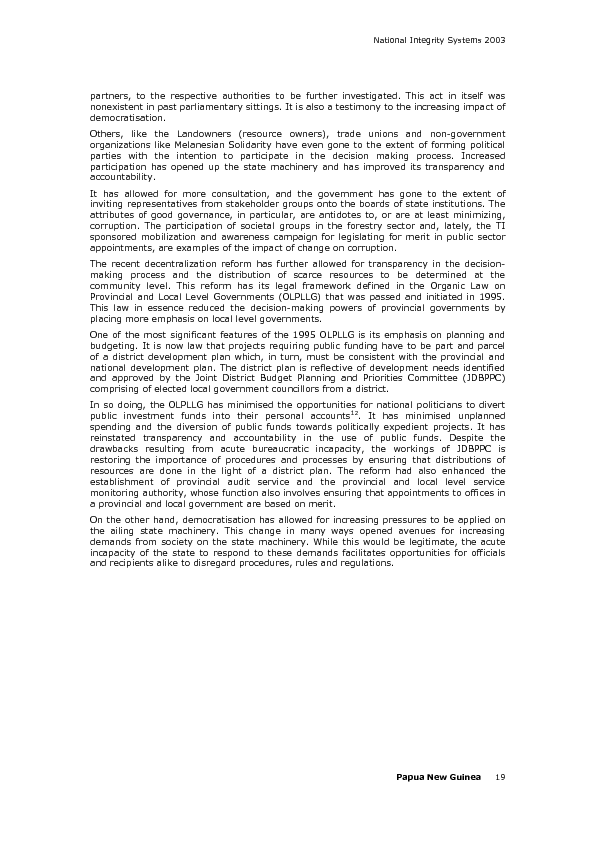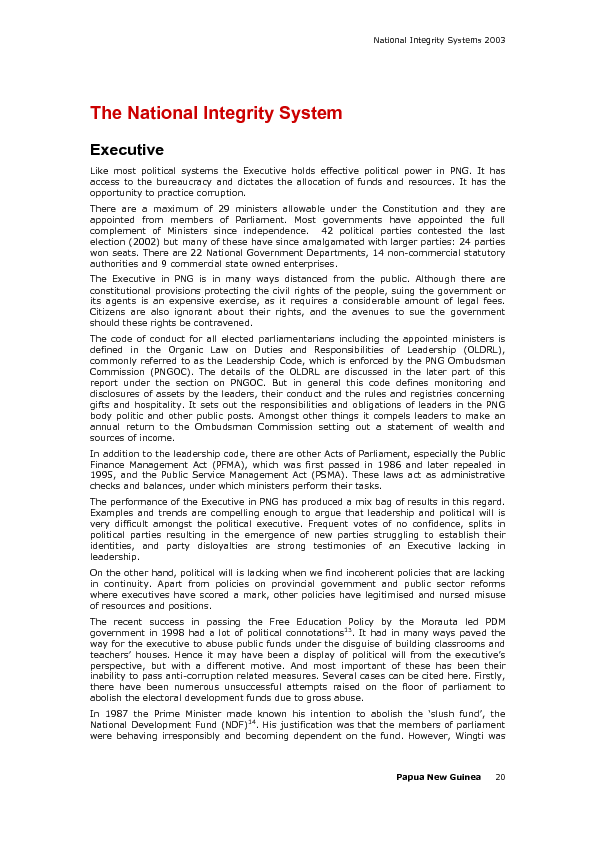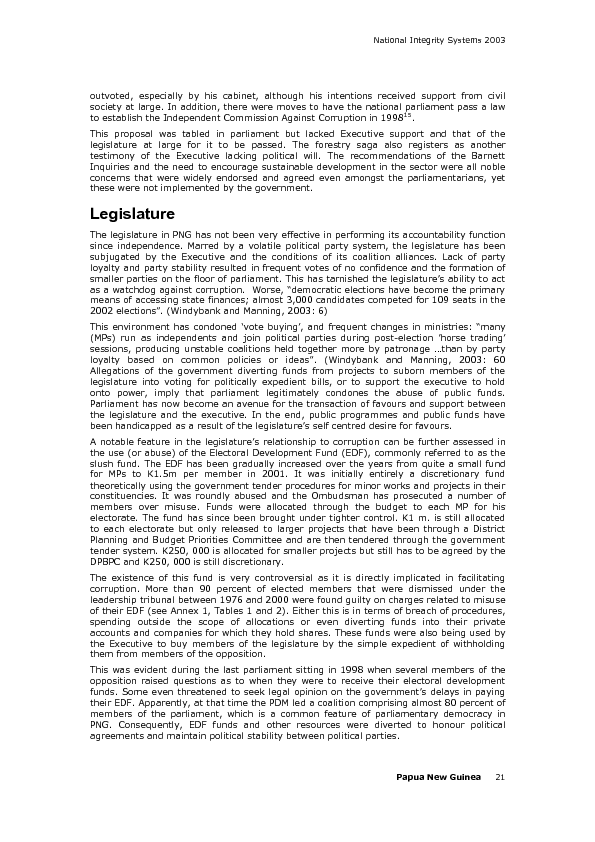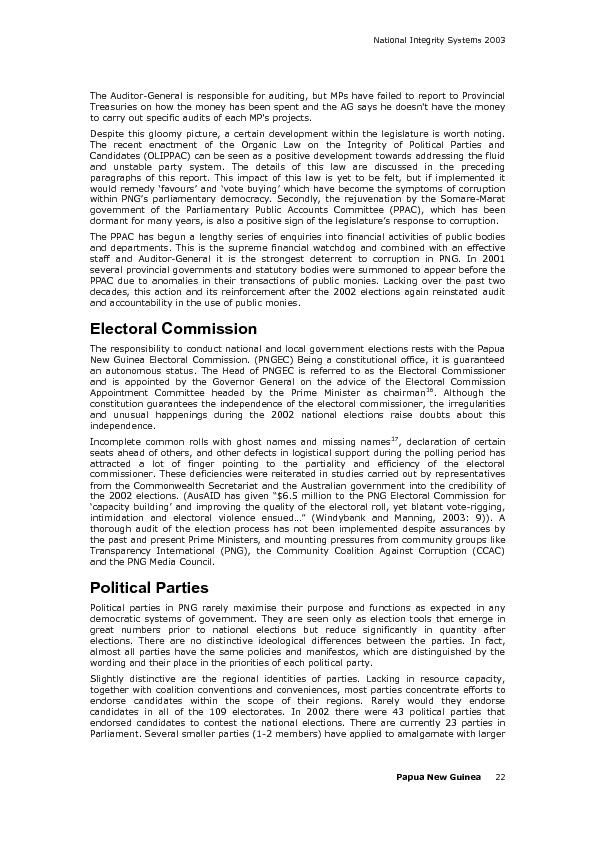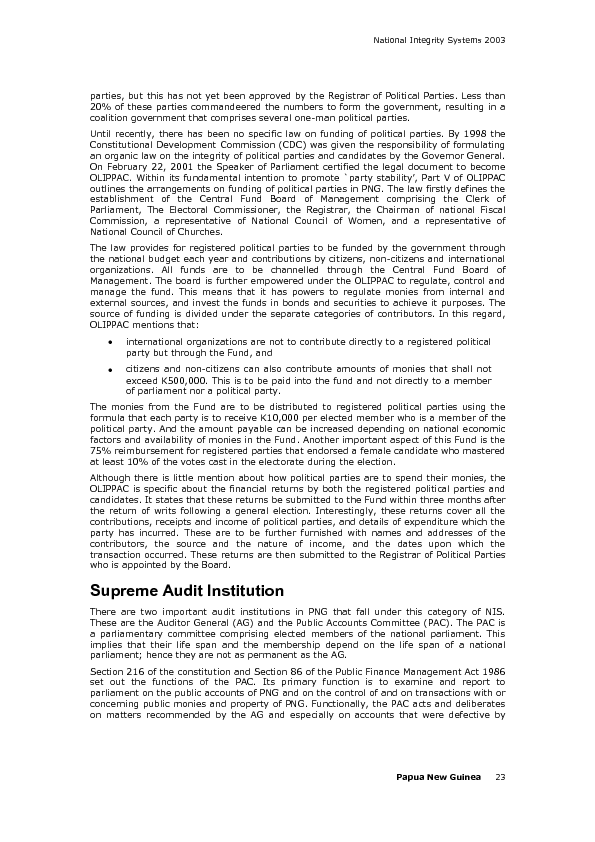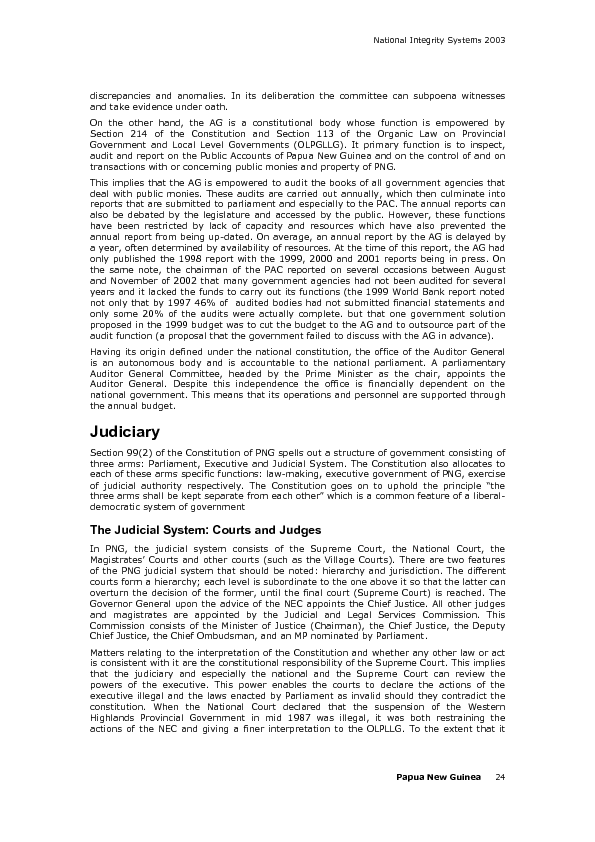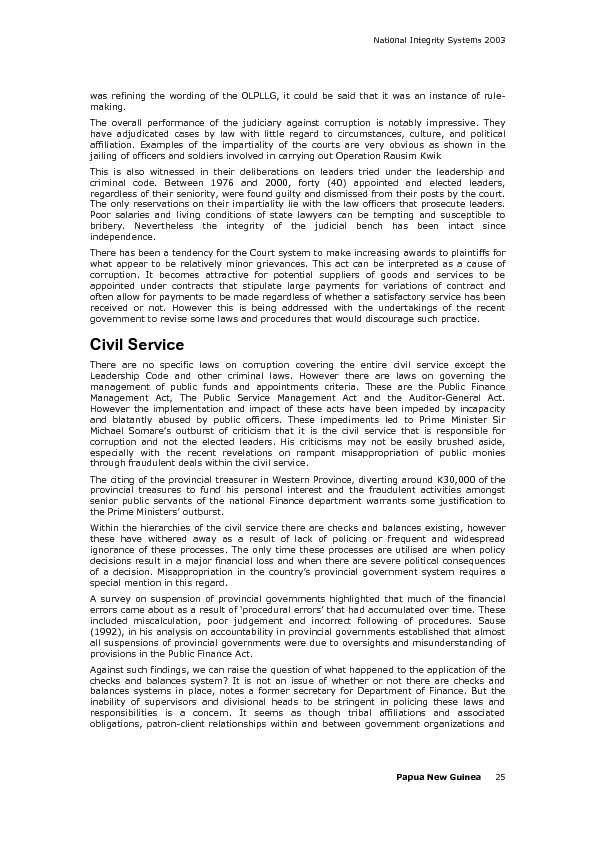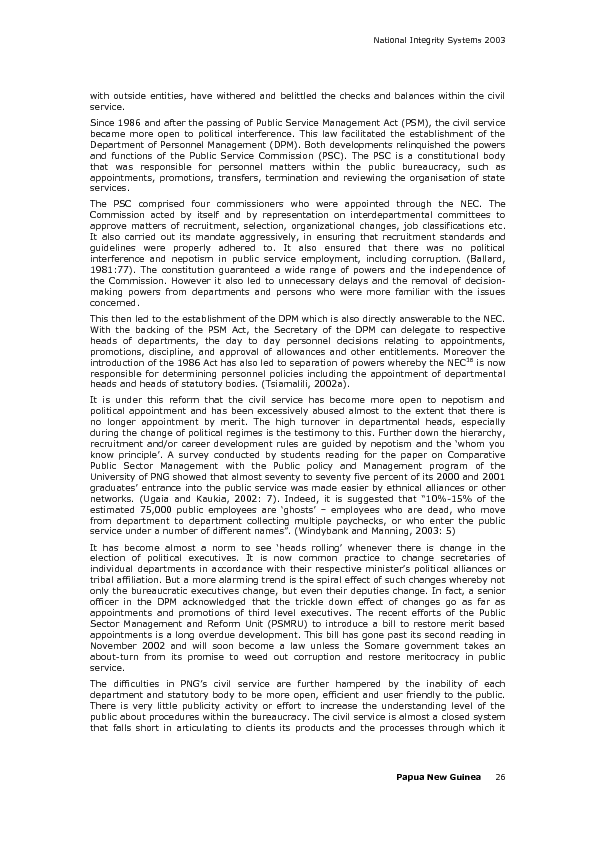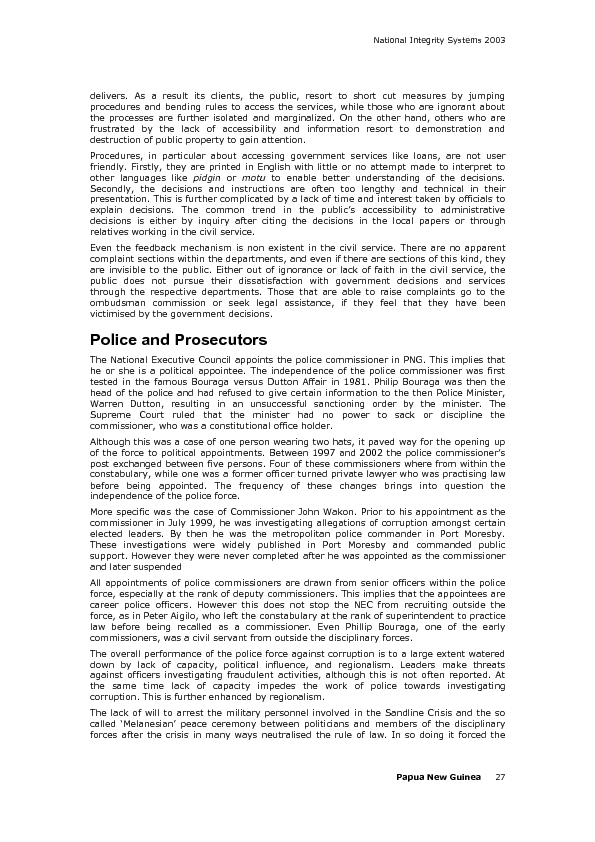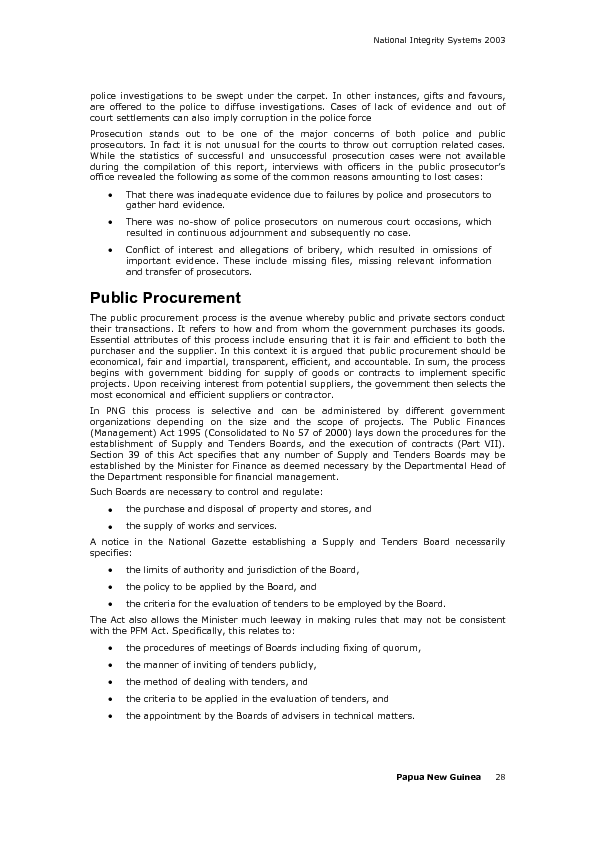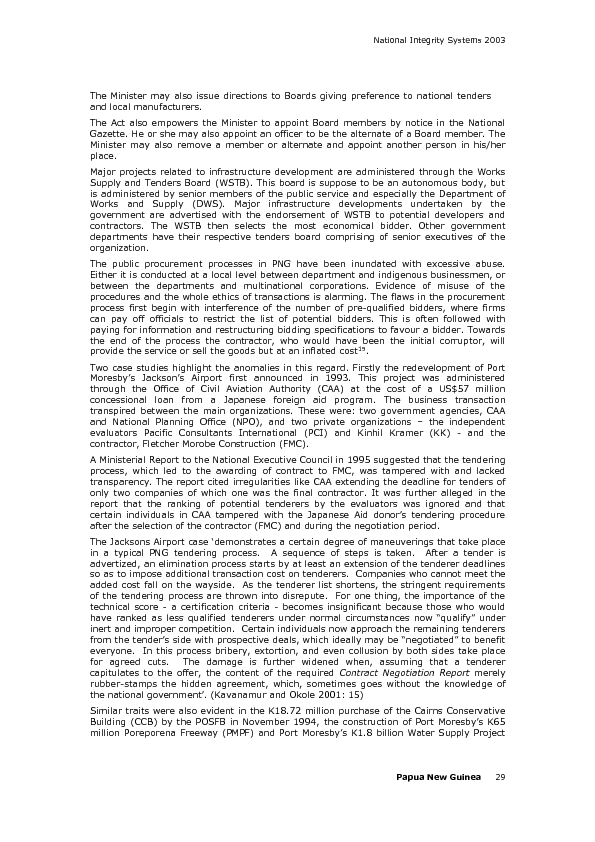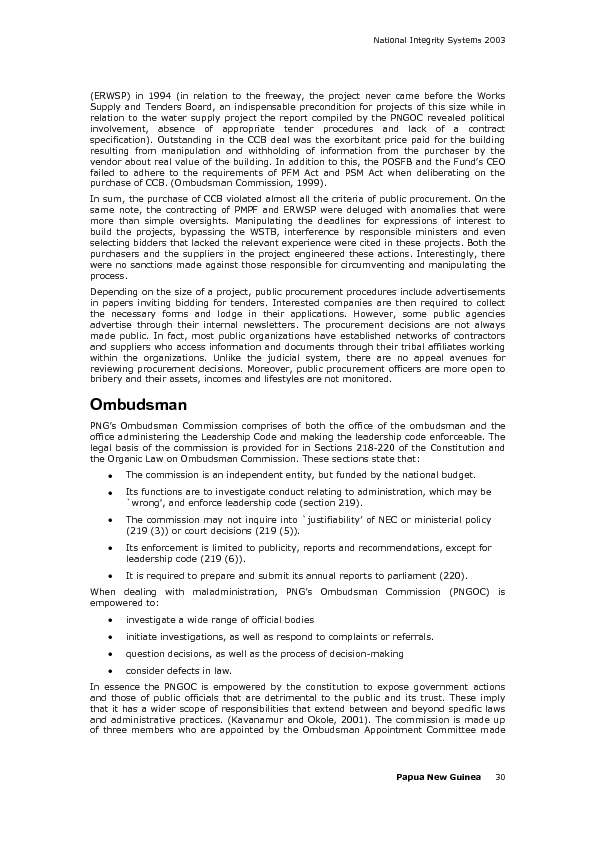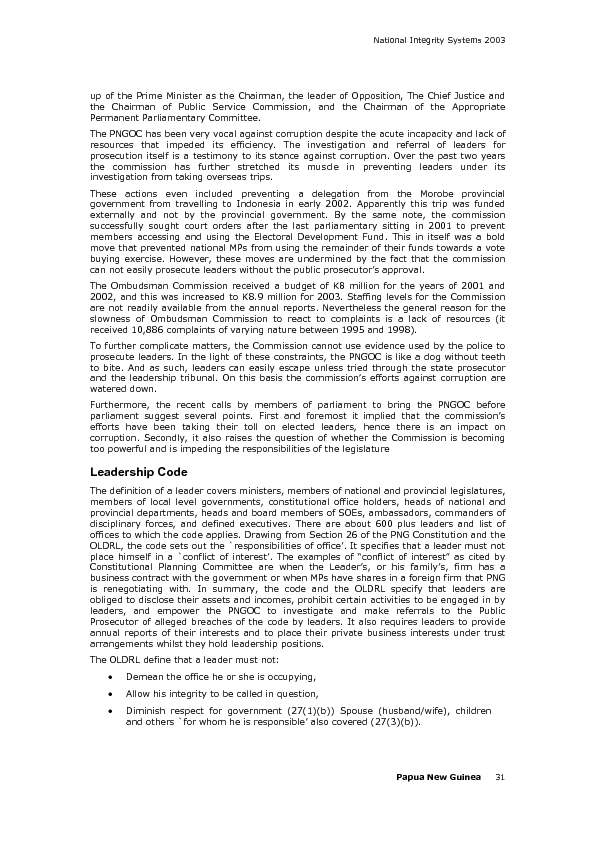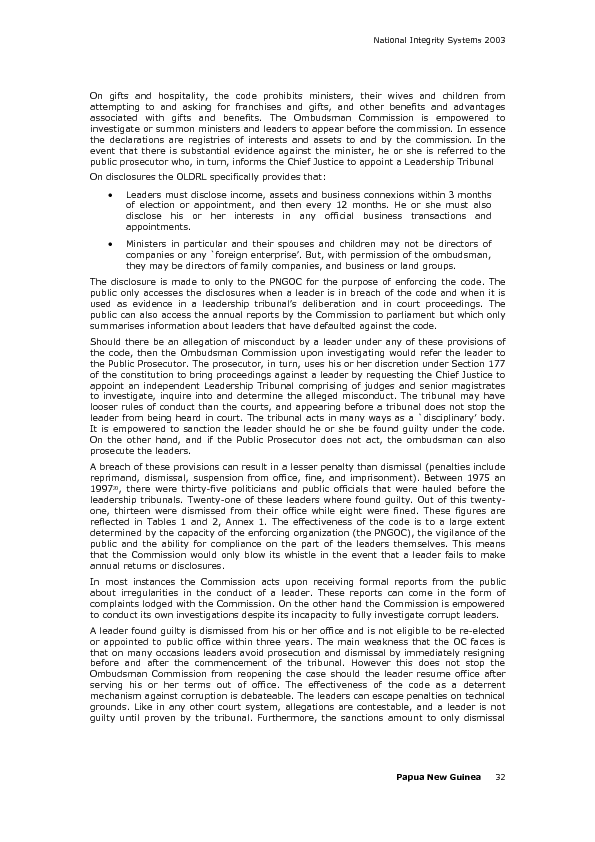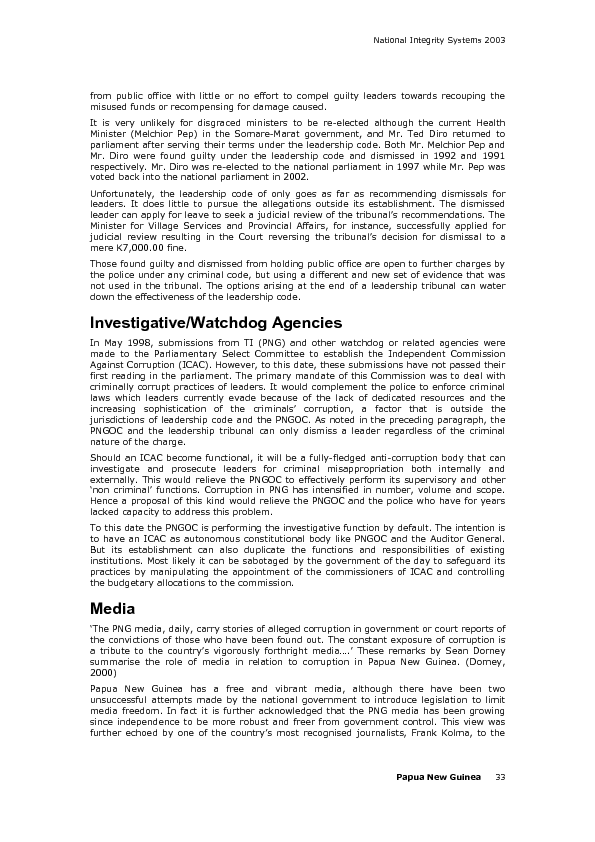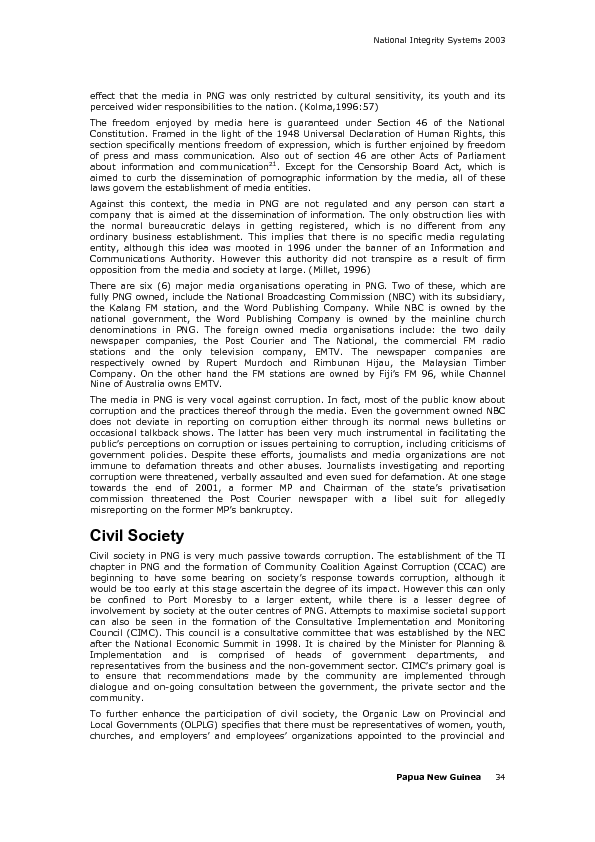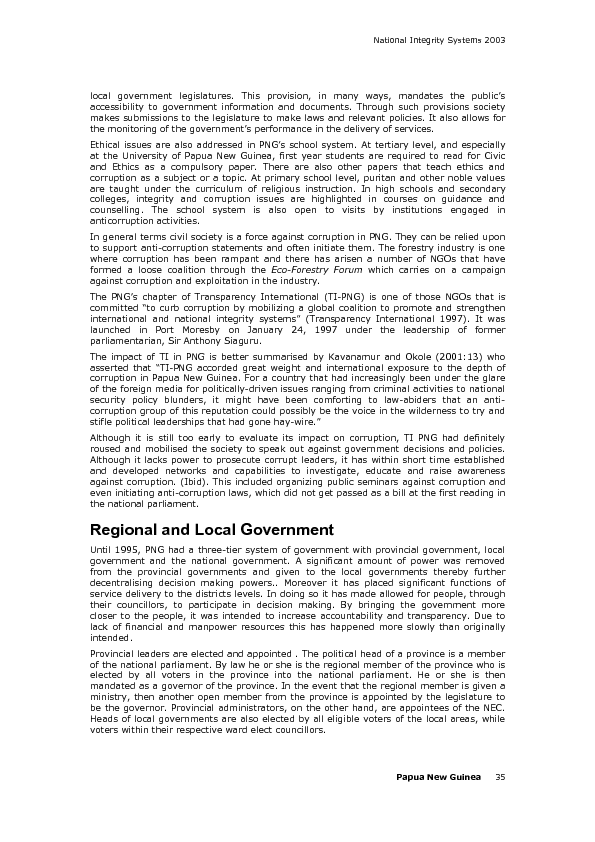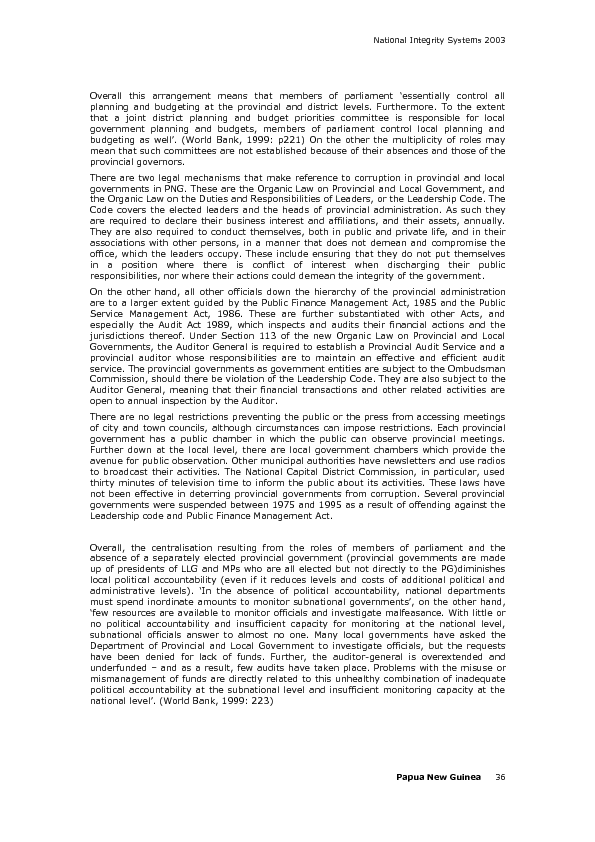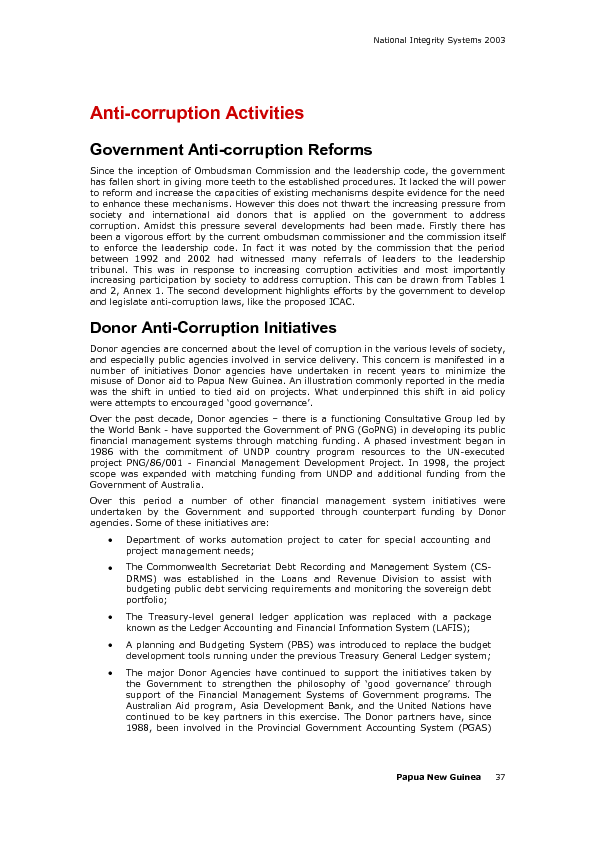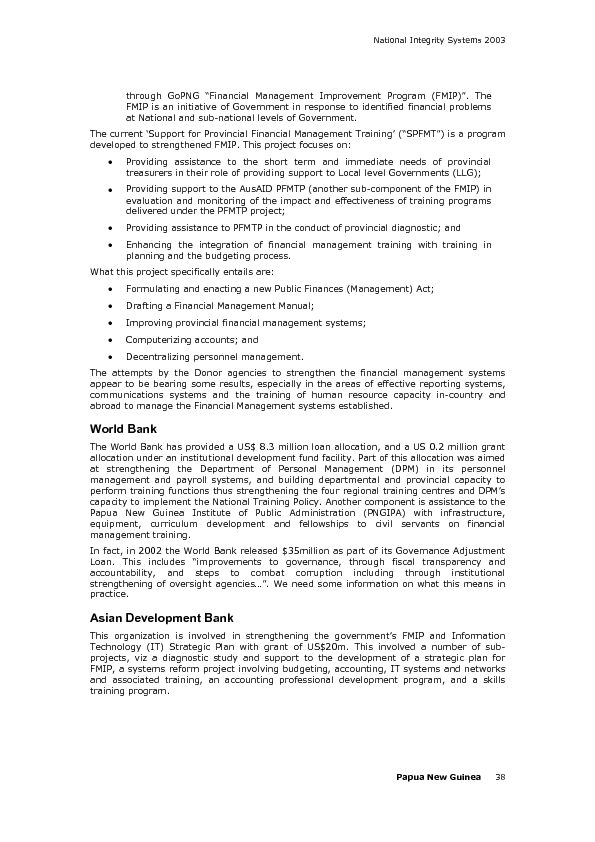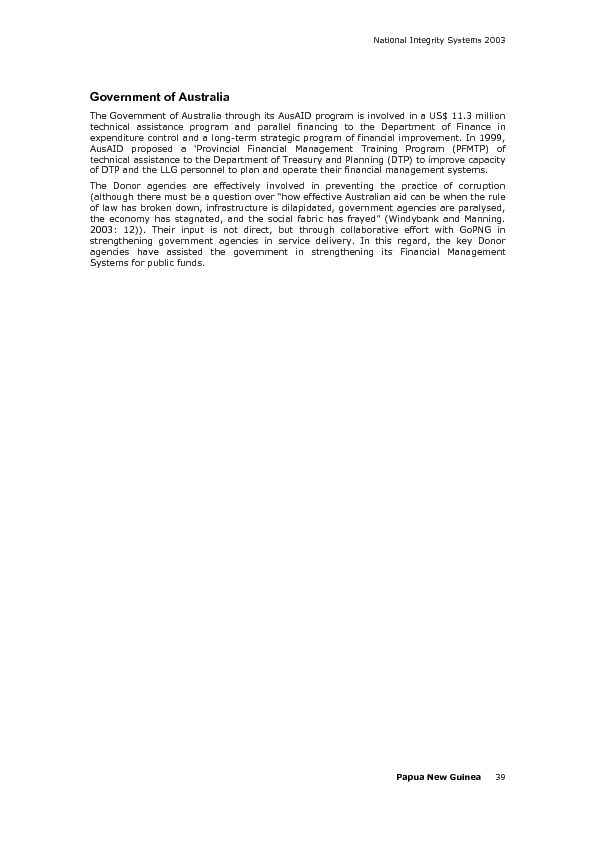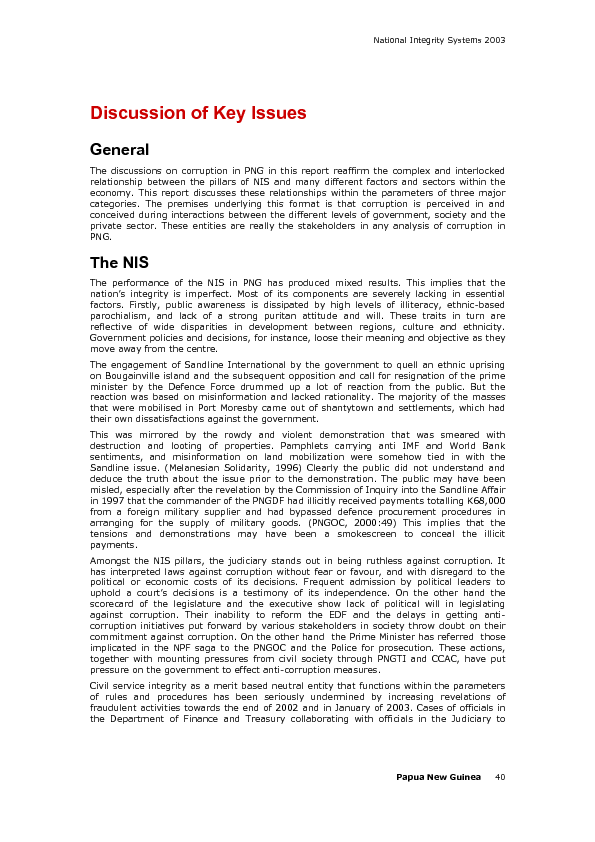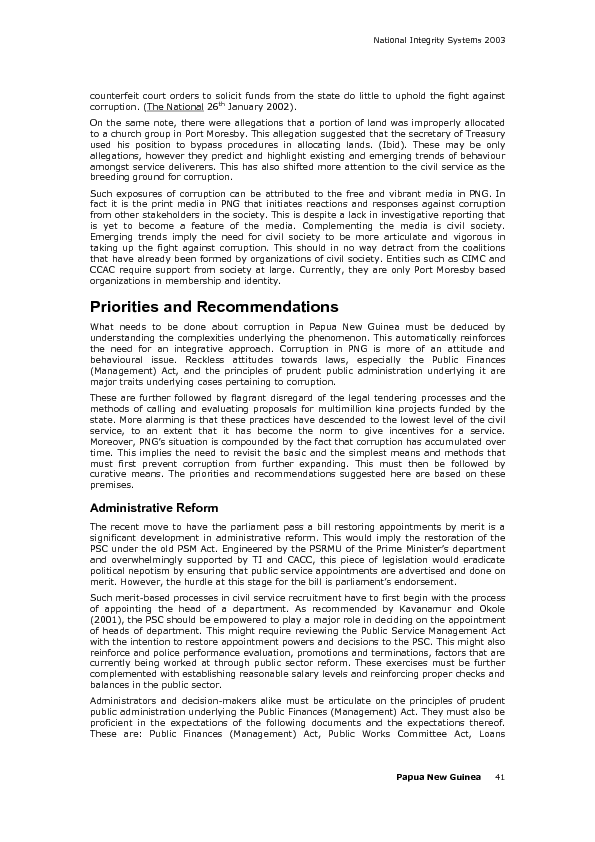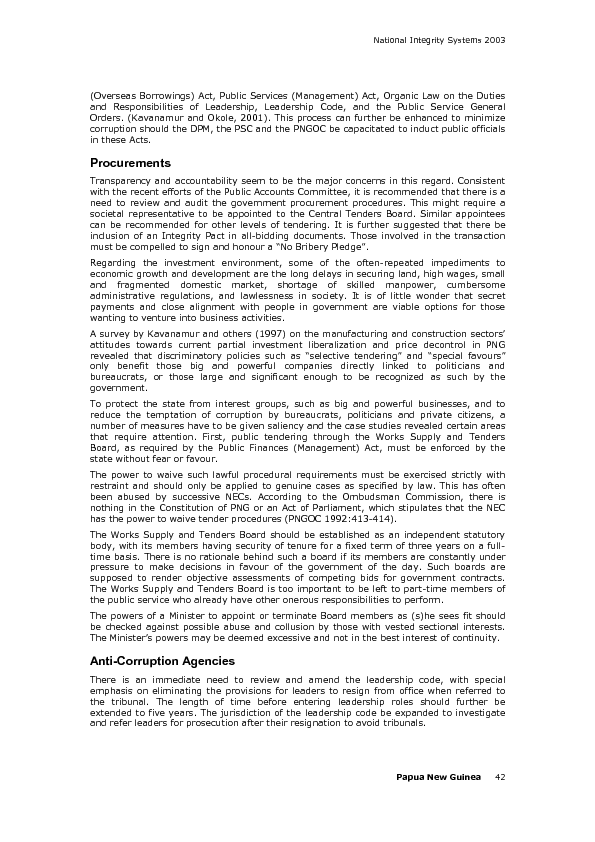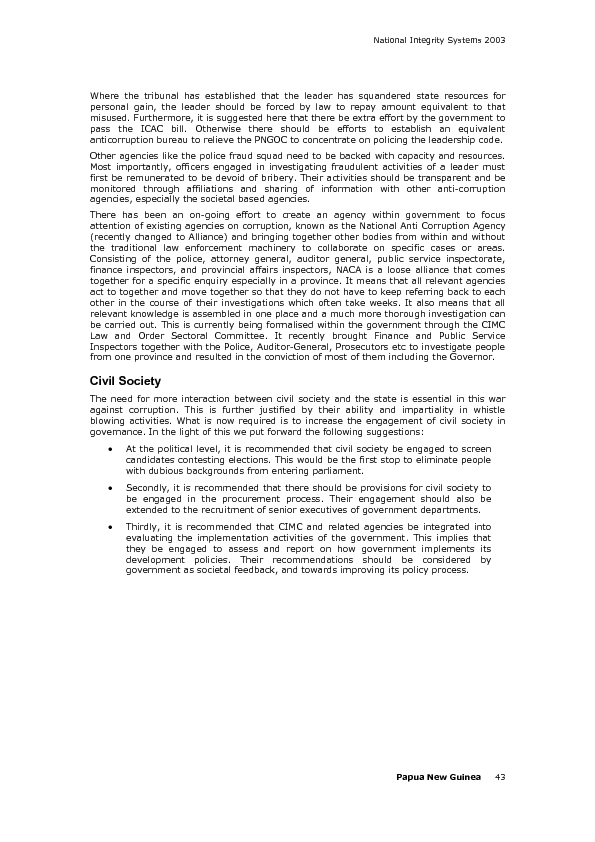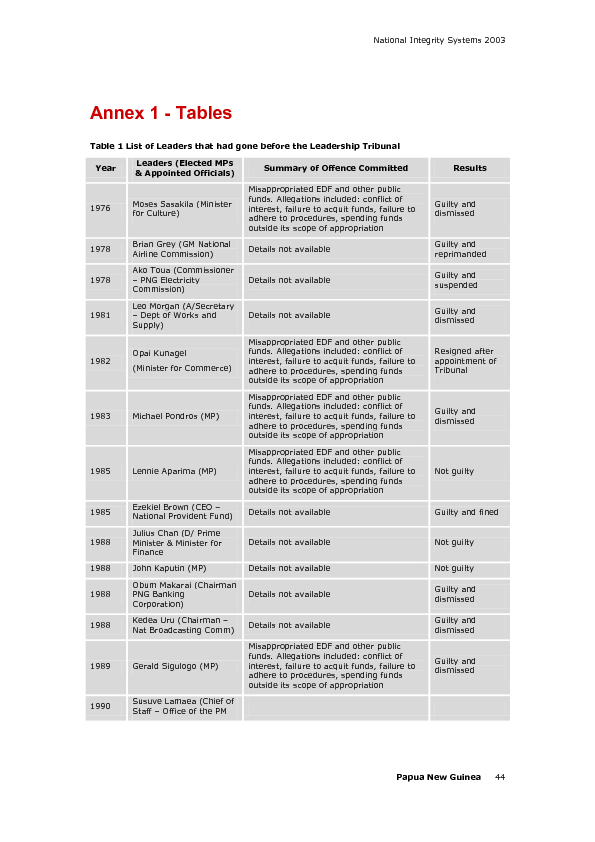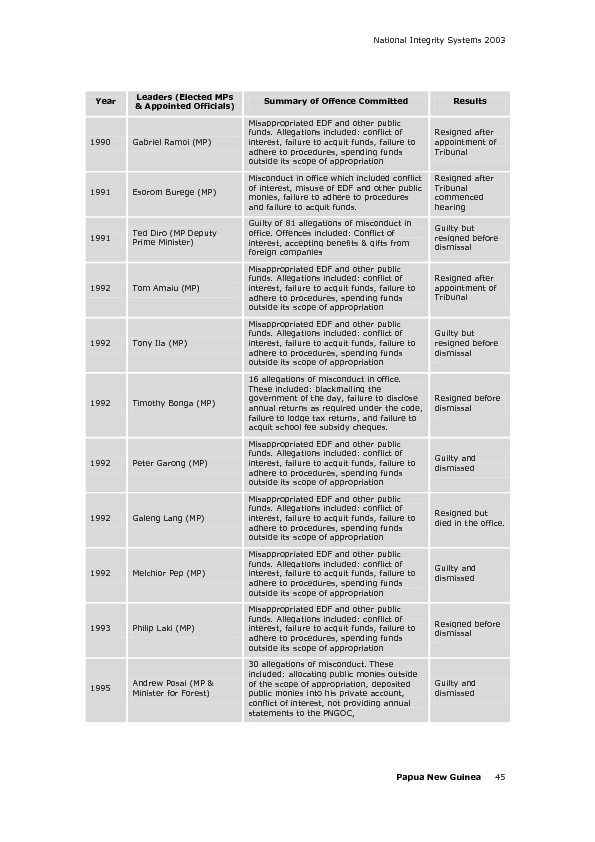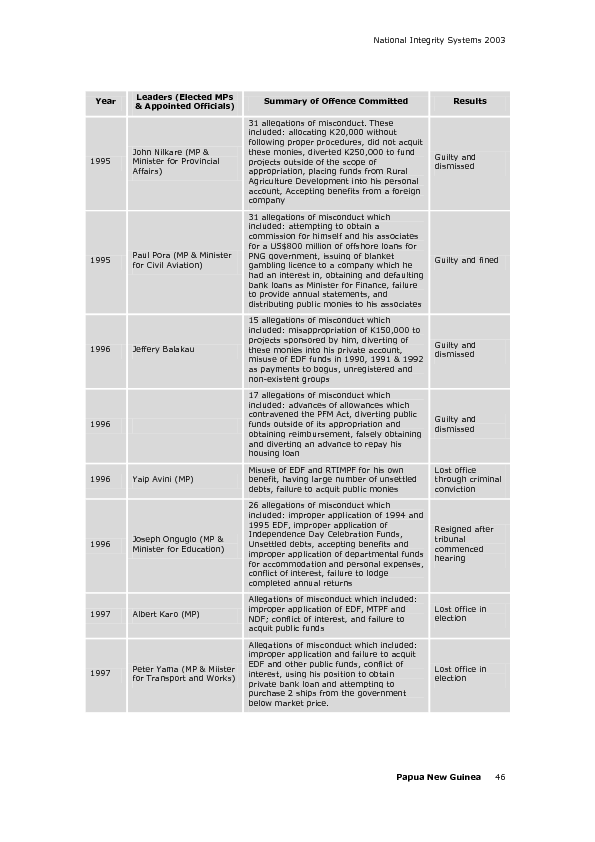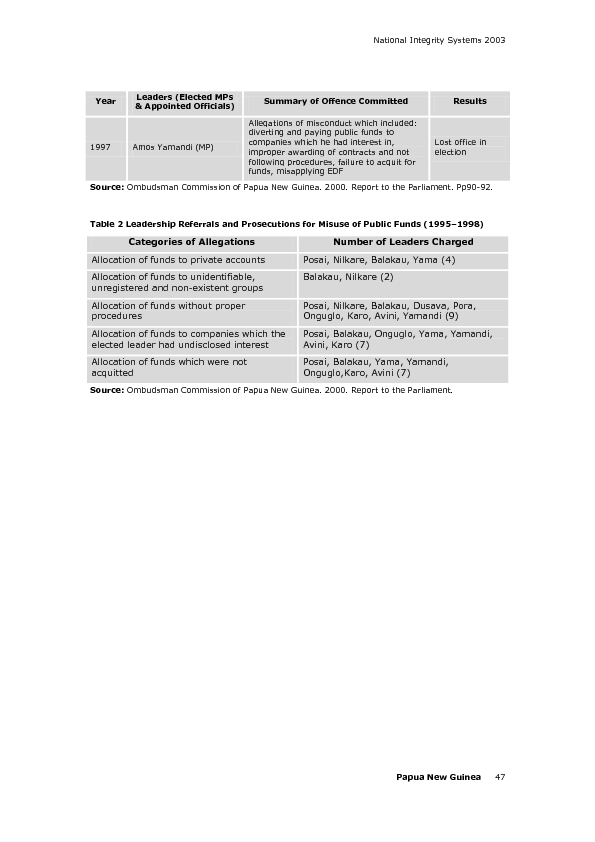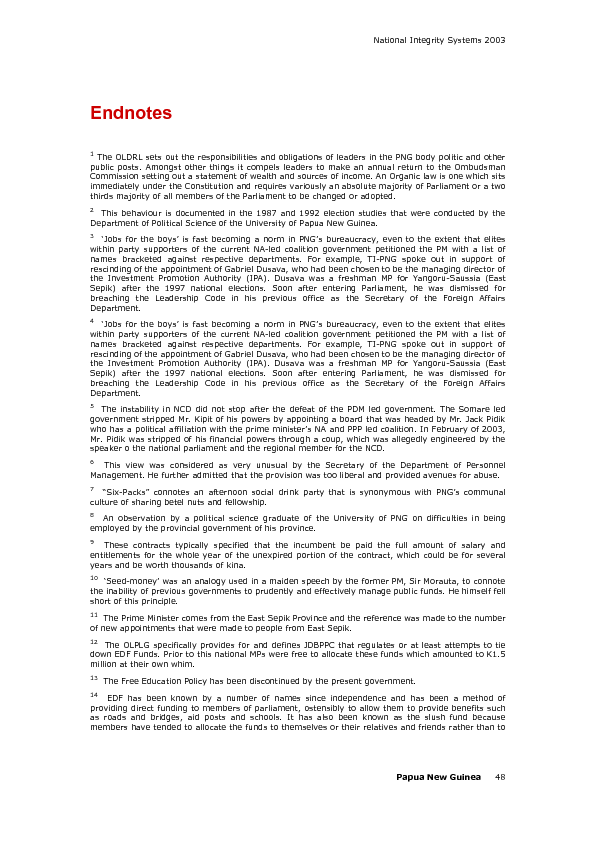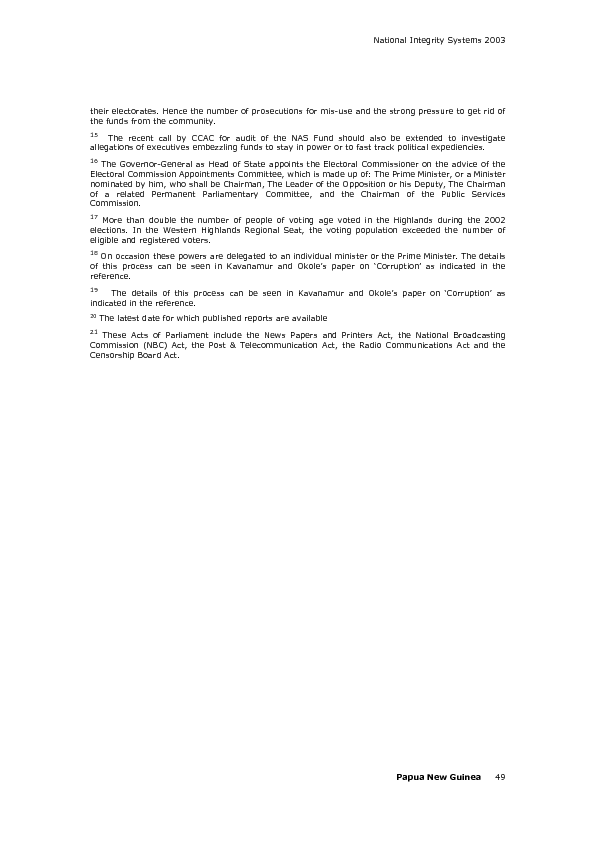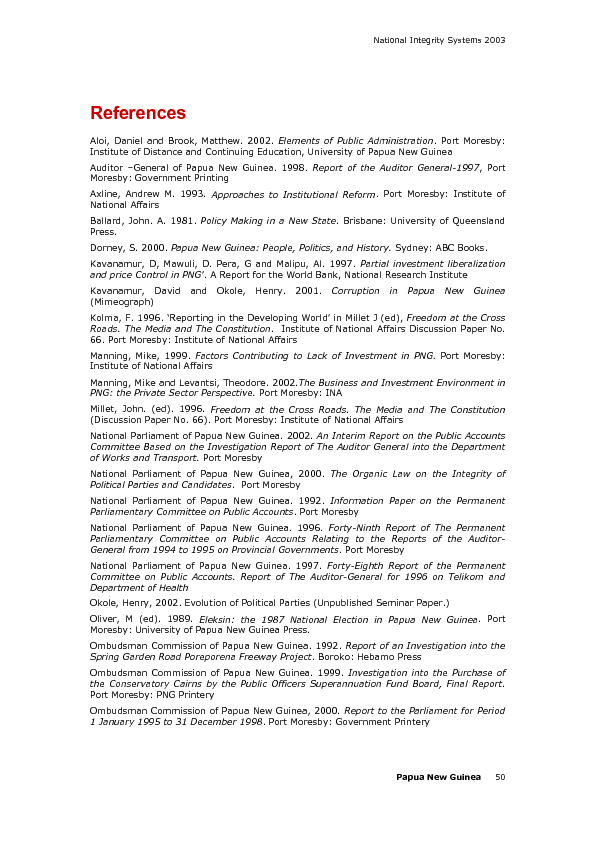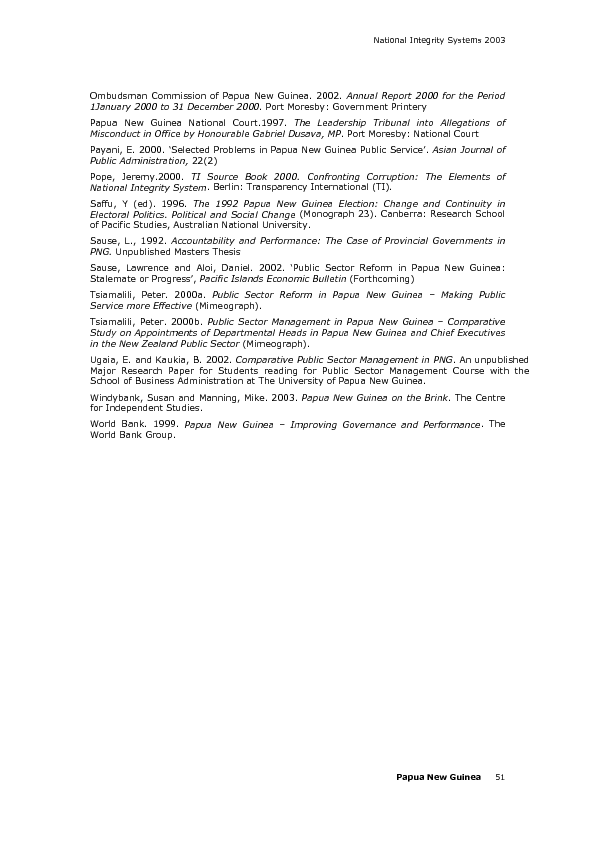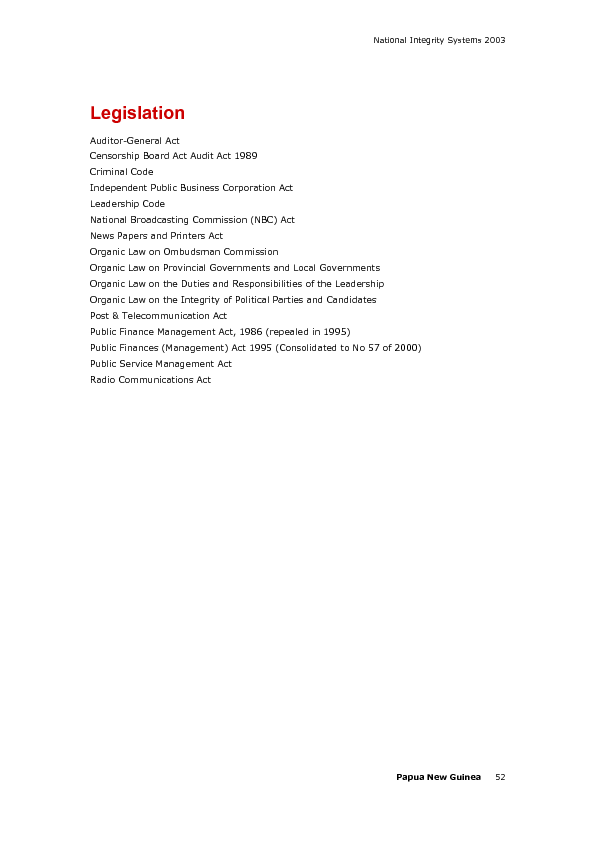Country Study Report for Papua New Guinea 2003
Mentions of people and company names in this document
It is not suggested or implied that simply because a person, company or other entity is mentioned in the documents in the database that they have broken the law or otherwise acted improperly. Read our full disclaimer
Document content
-
National Integrity Systems 2003
National Integrity Systems
Transparency International
Country Study Report
Papua New Guinea 2003
Lead Consultants
Alan Doig and Stephanie McIvor
Fraud Management Studies Unit
Teesside Business School
Middlesbrough
TS1 3BA
UK -
Page 2 of 52
-
National Integrity Systems 2003
Report Authors
INSTITUTE OF NATIONAL AFFAIRS
March 2003Prepared by
Albert Mellam & Daniel Aloi
School of Business Administration,
University of Papua New Guinea,
PAPUA NEW GUINEAIn conjunction with Michael Manning,
Institute of National AffairsThe National Integrity Systems TI Country Study Report Papua New Guinea 2003 was
made possible with the funding of the UK Government’s Department for International
Development.© 2003 Transparency International
Transparency International Secretariat
Otto-Suhr-Allee 97-99
10585 Berlin
Germany
http://www.transparency.orgPapua New Guinea 2
-
Page 3 of 52
-
National Integrity Systems 2003
Contents
List of Tables ………………………………………………………………………………………………………… 4
Abbreviations ……………………………………………………………………………………………………….. 5
Executive Summary ………………………………………………………………………………………………. 6
Country Overview………………………………………………………………………………………………….. 8
Corruption Profile………………………………………………………………………………………………… 11
Causes of Corruption……………………………………………………………………………..11
Culture………………………………………………………………………………………………11
Party Politics ……………………………………………………………………………………….12
Private Investors and Corruption ………………………………………………………………14
Levels of Corruption………………………………………………………………………………14
Costs of Corruption ……………………………………………………………………………….15
The Impact of Change on Corruption………………………………………………………….18
The National Integrity System………………………………………………………………………………. 20
Executive …………………………………………………………………………………………..20
Legislature………………………………………………………………………………………….21
Electoral Commission …………………………………………………………………………….22
Political Parties…………………………………………………………………………………….22
Supreme Audit Institution……………………………………………………………………….23
Judiciary…………………………………………………………………………………………….24
Civil Service………………………………………………………………………………………..25
Police and Prosecutors …………………………………………………………………………..27
Public Procurement ……………………………………………………………………………….28
Ombudsman ……………………………………………………………………………………….30
Investigative/Watchdog Agencies ……………………………………………………………..33
Media………………………………………………………………………………………………..33
Civil Society………………………………………………………………………………………..34
Regional and Local Government ……………………………………………………………….35
Anti-corruption Activities …………………………………………………………………………………….. 37
Government Anti-corruption Reforms …………………………………………………………37
Donor Anti-Corruption Initiatives ………………………………………………………………37
Discussion of Key Issues …………………………………………………………………………………….. 40
General ……………………………………………………………………………………………..40
The NIS……………………………………………………………………………………………..40
Priorities and Recommendations ……………………………………………………………….41
Annex 1 – Tables ………………………………………………………………………………………………….. 44
Endnotes …………………………………………………………………………………………………………….. 48
References ………………………………………………………………………………………………………….. 50
Legislation…………………………………………………………………………………………………………… 52Papua New Guinea 3
-
Page 4 of 52
-
National Integrity Systems 2003
List of Tables
Table 1 List of Leaders that had gone before the Leadership Tribunal ……………………….44
Table 2 Leadership Referrals and Prosecutions for Misuse of Public Funds (1995–1998) …47Papua New Guinea 4
-
Page 5 of 52
-
National Integrity Systems 2003
Abbreviations
CAA Civil Aviation Authority
CDC Constitutional Development Commission
CSDRMS Commonwealth Debt Recording and Management System
DPM Department of Personal Management
FMC Fletcher Morobe Construction
FMIP Financial Management Improvement Program
GoPNG Government of Papua New Guinea
ICAC Independent Commission Against Corruption
KK Kinhil Kramer
LAFIS Ledger Accounting and Financial Management System
NA National Alliance Party
NBC National Broadcasting Commission
NCD National Capital District
NEC National Executive Council
NPO National Planning Office
OLIPPAC Organic Law on Integrity of Political Parties and Candidates
OLPLG Organic Law on Provincial and Local Governments
PAC Public Accounts Committee
PCI Pacific Consultants International
PDM Peoples Democratic Movement Party
PGAS Provincial Government Accounting System
PNC People’s National Congress Party
PNGEC Papua New Guinea Electoral Commission
PNGOC Ombudsman Commission of Papua New Guinea
POSF Public Officers Superannuation Fund
PSM Public Service Management Act
SPFMT Support for provincial Government Management Training
TI Transparency International
UNDP United Nations Development ProgramPapua New Guinea 5
-
Page 6 of 52
-
National Integrity Systems 2003
Papua New Guinea
Executive Summary
Perhaps as suggested by a “bill board” at a busy inter-section in a Port Moresby Street,
corruption is killing Papua New Guinea (PNG). Indeed corruption in many different forms
has saturated many aspects of the public and private sectors of its society. Corruption is
endemic and it happens at all levels of government and public sector organizations. There
is also evidence of corruption in the private sector, although at less alarming rates.
The performance of various components of the NIS in PNG has produced a mixed bag of
results. Except for the judiciary, the media, the PNG Ombudsman Commission and civil
society, most government institutions are perhaps tolerant and passive towards corruption.
The code of conduct for all elected parliamentarians including the appointed ministers is
determined by the Organic Law on Duties and Responsibilities of Leadership (OLDRL)1,
which is enforced by the Ombudsman Commission. This code specifies that within three
months of assuming office the elected leader has to submit to the Ombudsman
Commission information pertaining to his or her incomes, assets, business connections,
liabilities, etc. These submissions are made annually.
This law also applies to executives and members of constitutional offices, heads of central
and provincial government departments, the heads and board members of statutory
organizations, ambassadors, the commanders of disciplinary forces and other senior
executives.
It is observed that there are adequate anti-corruption laws available in Papua New Guinea
(Sections 87,88, 92 and 97 of the Criminal Code refer to fraud, undue influence, tendering
and bribery.). The weakness is, however, in the effective implementation and policing of
these laws. A related weakness is that organizations entrusted to fight corruption such as
the Ombudsman Commission have not been given enough ‘teeth’ to deter corrupt
practices.
Interesting and welcome developments in recent years have been the establishment of
Transparency International PNG and the increased campaign against corruption by the
Media Council. It is observed that through efforts of such bodies the public is now
becoming keener to become involved in the fight against corruption. Non-government
organizations, including the churches, are now openly talking against corruption. There is
now a push for parliament to pass a law to establish the Independent Commission Against
Corruption. With the combined efforts of government organizations such as the
Ombudsman Commission, the Courts, the Police, the Media Council, and Transparency
International PNG and other Non Government Organisations, much can be achieved in
terms of reducing corruption.
A national anticorruption agency as suggested under the ICAC is also much needed,
although there must be clear demarcation of powers and responsibilities between such an
agency and the existing agencies. The establishment of a NACA (National Anti-Corruption
Agency or Alliance) would require political will and sustained societal support to make it
effective.Summary of Priorities and Recommendations
There are still many things that need to be done to reduce corruption in Papua New
Guinea. A number of priority areas need to be attended to immediately to improve the
fight against corruption:
First pressure from a wider community must be put on members of parliament to pass the
bill for the establishment of the Independent Commission Against Corruption. The mediaPapua New Guinea 6
-
Page 7 of 52
-
National Integrity Systems 2003
could play a bigger role in educating the voters to put pressure on their members to vote
in favour of this Commission.
Secondly, laws relating to increasing the powers of the Ombudsman Commission should be
reviewed. This should be done with the view to giving more ‘teeth’ to the Commission.
Thirdly, the interest and enthusiasm of the general public in the fight against corruption
need to be strengthened and maintained. This can be done through media campaigns, the
involvement of NGOs in awareness campaigns, and discussions and consultations with
various sections of society. The media campaign should be further complemented by
ensuring that those found guilty of corruption are prosecuted.Papua New Guinea 7
-
Page 8 of 52
-
National Integrity Systems 2003
Country Overview
PNG comprises half of New Guinea and a range of islands, one of which has sought to
break away from the country (especially Bouganville Island which has stronger ties to its
neighbouring Solomons Islands and whose copper mine accounted for some 40% of the
country’s export revenues before its closure in 1989). PNG has been independent since
1975; it is part of the Commonwealth. It has a Governor General acting as the
representative of the constitutional Head of State (the British monarch) but executive
power lies with the Prime Minister and the National Executive Council (the government).
The Council is formally appointed by the Governor General on the recommendation of the
Prime Minister (while it is the Council which recommends the Governor General); the Prime
Minister is appointed by the Governor General on the basis of the majority support in the
National Parliament. This latter institution is unicameral with 109 members, of which some
20% are elected from provincial electorates. There are 20 provinces. There are some 6
main parties (and 16 minor ones) but the biggest political grouping elected to the
Parliament were are the independents who subsequently joined other political parties so
there are only 2 left in the 2002 Parliament. The coalition government makes for a fragile
tenure (with governments dismissed in 1999 and previous years in the face of votes of no
confidence and allegations of misuse of office).
PNG is a country with great potential from its natural endowments of minerals and
petroleum, large tracts of unoccupied fertile land, large forestry and fishery resources and
tourism potential. It has enjoyed unprecedented wealth from minerals and petroleum over
the 1990s but has been unable to convert this into real development and giving it some of
the worst human development indicators in the Pacific.
Corruption in PNG cannot be discussed in isolation from development and politics.
Explanations deduced from leaders dismissed as a result of misconduct and misuse of
public funds alleged that their actions resulted from attempts to address, if not fast track,
wealth-generating development activities in their electorates. This further enlightens the
fact of widening disparities in development between ethnic groups, and between different
geographical areas.
The background to corruption in PNG is similar to other small island states. Comparisons
reiterate issues and themes that connote corruption with underdevelopment and poor
governance. Development policy objectives to generate wealth through developing natural
resources coupled with communal ownership, amidst divers ethnic groups, and acute
incapacity of the government, provide a susceptible nursery to germinate corruption.
The question that is immediate here is that of how and why corruption is peculiar in PNG.
In the political arena, cases of corruption portray reasons pertaining to a political leader’s
desire to bring about immediate and visible development to his or her electorate, and
especially those immediate to the leader. This justification also highlights a possible nexus
between Melanesian communalism, personal greed and development. However these links
could be rebutted, especially when traditional leaders were transparent in the distribution
of wealth, a trait that is concealed in the dealings of today’s politicians.
Related to this would be the misconception of politics as a means to personal wealth. This
perception has historical validity. Absence of a strong indigenous capital base during
colonialism would have fuelled the business aspirations of politicians. A browse through the
political chronicles of PNG reveals an interesting trend. Politicians begin their political
careers as ordinary persons, or civil servants, and graduate as business entrepreneurs
after their discontinuation from office.
In fact, most medium scale business activities in PNG are owned or partly owned by
politicians and ex-politicians. The emergence of politicians-turned-businessmen or vice
versa after 1975, and the difficulties in separating business from politics, had sent out
false signals to aspirants to political office. Contesting elections today has become a god-
sent opportunity to wealth accumulation. Cases of diverting public monies into personalPapua New Guinea 8
-
Page 9 of 52
-
National Integrity Systems 2003
accounts or into those of the politician’s business associates, as cited in this report, allude
to this assertion.
The absence of a developed indigenous capital base has provided a vacuum in PNG’s
economy, which in turn has impaired the government’s bargaining position against the
multinational companies (MNC). The national government in PNG, by default, has become
the business entrepreneur to partner MNCs in major development. And it is the dilemma of
wearing ‘two hats’ that has compromised the government’s neutrality. Its participation as
guarantor and as joint-venture partner has also facilitated avenues for corruption by
exposing civil servants and politicians to be vulnerable to bribes and commissions from
foreign companies.
It is also an alternative to the market as a producer and distributor of goods and services.
Hence businesses are conducted with government resources and through government
institutions guided by political prices more than market prices. Corporate clients of
business houses are public officials and organizations. The little that is left of the market is
secured through political affiliations and networks. These factors are susceptible to
corruption and further make it difficult for business entrepreneurs pursuing political careers
to separate politics from their business interests.
Finally there is the issue of political exploitation of natural resources and ‘generous’ levels
of aid in terms of “‘windfall’ incomes (economic rents) that have led to waste and
corruption. Rent-seeking has subsidised the rise of a small political elite and overblown
central government at the expense of investment in infrastructure and diversification of
the economy” (Windybank and Manning, 2003: p2). The political arena, as will be noted
below, becomes a goal for inside economic gain rather than for the promotion of the public
interest.
Attempts to take government away from the business through privatisation, liberalization
and deregulation have been dragging, and at times have been derailed, with mass
demonstrations that ride on the emotions of public ownership of the state owned business
(SOE) entities. The fears of job losses and the likelihood of the economy being
denationalised were reflective in the government’s prolonged delays in implementing
privatisation. Even now, attempts have been immersed in Commissions of Inquiry
revealing allegations of defaults in the bidding process. The delays in selling SOEs reveal
their unprofitable nature and perhaps the undeveloped indigenous capital base. The focus
has then shifted across to superannuation funds as the alternate capital base. However
these too are now inundated with allegations of corruption. Commissions of Inquiry reveal
investment decisions that were submerged with tendering flaws and political pricing.
Political influence in appointments of board members and influencing of the procurement
process were also rampant in the superannuation funds, as revealed in the 2001 Inquiry
into the National Provident Fund.
Unlike Fiji, which is more of a homogeneous society through its chieftain system, PNG is
made up of many nation-states that are diverse in culture and language. Except for certain
parts of Milne Bay and New Ireland provinces, the traditional political systems have little
impact on PNGs political configurations. However it is the abuse of the traditional system
that matters in relation to corruption.
Traditional leaders have earned and legitimised their mandate through ownership and
distribution of wealth with transparency (‘for many Melanesian traditional societies, a
credible leader is often defined by the volume of wealth in his disposal and power that he
is able to wield’ (Kavanamur and Okole, 2001: 6)). They spoke for and on behalf of their
clans, such that land and its resources had been a communal asset. Modern political
leaders of PNG today do not ask for their voters’ consensus nor give an account to their
voters when distributing electoral development funds. They divert funds to family
businesses that are registered under a clan name and symbol.
Political power may be equally shared in Papua New Guinea, but it is the high turnover rate
at the national parliament that has a lot of implications for corruption. Almost 80% of
elected leaders fail to remain in power for more than a term in parliament. Such
uncertainty exerts pressures on the parliamentarians to maximise all availablePapua New Guinea 9
-
Page 10 of 52
-
National Integrity Systems 2003
opportunities to establish themselves by using public office and resources to remain in
power through vote buying and building their power base.
Diverting public funds outside of the scope of appropriations onto politically expedient
projects or buying of capital goods like banana boats and land cruisers that rapidly
depreciate become the norm of first-time (and perhaps last-time) politicians. Others invest
public funds into trust accounts and corporative ventures under the name-tag of the
constituencies. Of course these are often conduits for wealth accumulation by individual
MPs.
Upon attaining independence in 1975, PNG adopted the Westminster system of
government with a national parliament whose members are elected for a five-year term
through a secret ballot by the voters in the 109 constituencies throughout the country. It
has a three–tier political system comprising of the national government, 20 provincial
governments and about 267 local and municipal governments. Governors who are elected
as provincial members to the national parliament head the provincial governments.
The Organic Law on Provincial and Local Level Government (OLPLLG) defines that the
provincial member assumes the office of a governor of the province. However the
government of the day may appoint other elected members of constituencies within the
province, should the provincial member be appointed as a minister in the National
Executive Council (NEC). Apart from the governor, provincial government comprises the
presidents of the all local governments in the province and other nominated members, and
all the members of the national parliament from the province. The third tier of government
is local level government, which is made up of elected ward councillors.
The national parliament is a single house assembly, from which the National Executive
Council (NEC) is chosen. The NEC is headed by a Prime Minister who comes from a political
party that commands majority of parliamentarians on the floor of the parliament. So far in
PNG’s political history there has been no single party that comprises the executive or
dominates the parliament. On average the government is been made up of five coalition
parties plus assorted independent members. The current Somare–Marat government, for
instance, is a coalition government that is made up of six political parties, together with a
handful of independent members (though all the independents have subsequently joined
parties). The national parliament is also empowered to appoint a women’s representative
outside the ballot box. However this power has rarely been used. Unlike Tonga and Fiji, the
configuration in PNG’s political system has no formal ties with the traditional political
system. The parliament in PNG is not subject to any traditional political institutions or
practices.
Except for matters related to Foreign Affairs and Defence, the administration of the
country is divided between some twenty-five national departments some of whose
functions and responsibilities are decentralized to the provincial departments. These
responsibilities are then delegated to a number of districts and sub-districts. The districts
comprise of Local-Level Governments (LLGs) which are political units made up of elected
councillors each representing a ward, which are in turn made up of several villages and
hamlets.Papua New Guinea 10
-
Page 11 of 52
-
National Integrity Systems 2003
Corruption Profile
Causes of Corruption
Corruption is found in underdeveloped, developing and developed economies but in
varying degrees. On the same tone, rich leaders and underpaid government workers alike
abuse their authority to make and access wealth. This suggests that poverty cannot be the
only cause of corruption, neither is there a single cause of corruption. In PNG there are
several factors that have connotations as causes of corruption. These are: culture, failure
of government institutions to use the controls available, inadequacy and incapacity of the
institutions, demands of supporters, introduction of large scale logging, circumvention of
government regulations like work permits, visas, and reserved activities.Culture
Sharing and caring is synonymous with leadership in Melanesian culture. Amongst
traditional leaders, mobilization and distribution of wealth is an essential component of
their responsibilities. It further enhances their status within the tribe. However upon being
elected, leaders and appointed officials fail to draw differences between traditional culture
and the rules and regulations governing public office and public resources.
It is common to hear voters selecting a particular candidate on the basis of his or her
attributes of sharing and caring. This in turn compels elected leaders to return favours to
their voters through goods and services. Observations on voters’ and candidates’
behaviour during the 1987 and 1992 elections alluded to such reciprocal relationships
between voters and candidates based on leadership traits of sharing and caring2. (Oliver,
1989; Saffu, 1996) The same reasons were later observed in the 2002 national elections,
and especially in electorates that had the traditional chieftain system.
The traditional culture of PNG does not sanction corruption but it is its compulsion and its
incompatibility with the bureaucratic and democratic norms and its abuse that denotes
corruption. Skewing and manipulating proper tendering procedures to award contracts to
family companies, or facilitating appointments with disregard to merit, carry implications of
contrariety in the communal culture that exists within the PNG society. Payani’s diagnosis
of the composition of a country’s public sector, for instance, alluded to a domination of one
ethnic or provincial group depending on the provincial origin of an executive or the human
resource personnel within the organization. (Payani, 2000)
His diagnosis was based on examples drawn from the PNG Electricity Commission and
PostPNG, which at the time of his studies were largely dominated by employees from the
East New Britain province. Interestingly, PostPNG witnessed phenomenal employment of
the workforce from one province at its central headquarters by 1998. Even the security
guards guarding the premises had affiliation with the CEO of the company and his political
party. The Chief Executive Officer (CEO) of the company was also an unsuccessful
candidate who contested the Enga regional seat in the 1997 national elections.
These trends are of course debatable especially when compared with cases where leaders
have diverted funds outside of procedures and laws to fund their own self-interest. The
majority of the referrals of leaders by the PNGOC for prosecution is due to misuse and
abuse of procedures in applying public funds. For instance, between 1995 and 1998 there
were twelve leaders referred by the commission for prosecution. Nine of these leaders had
charges related to misappropriation of Electoral Development Funds and other public
infrastructure development funds. Their transgression included diverting funds into their
private accounts or funding political expediency projects outside the scope of the
prescribed appropriations. (Ombudsman Commission of PNG, 2000:67-88) These cases are
cited in Table 2, Annex 1.
But this individualistic behaviour has a nexus to culture when considered in the context
that almost all leaders conduct their campaigns and earn their votes through strong ethnicPapua New Guinea 11
-
Page 12 of 52
-
National Integrity Systems 2003
and genealogical ties than the primacy of policies as it would be in developed democracies.
Hence the abuse of culture arises when the conduct of their actions becomes ostentatious
with the use of communal name tags, or communal trusts, which in reality act as conduits
to personal wealth.
Culture in PNG is one factor that can give an explanation to the causes of corruption. While
it can be argued that there are certain attributes of the culture which seem to be more
compatible with corruption, this does not mean that PNG has a corrupt culture. In many
parts of the country, sharing and caring is synonymous with a clan leader or an elder of a
family. Amongst traditional leaders, mobilization and distribution of wealth is an essential
component of their responsibilities. Such activity further enhances their status in the clan
or the tribe.
Such leadership traits are said to continue amongst elected leaders and appointed officials
who facilitate their cultural responsibilities and their social obligations through their access
to public resources. It is common to hear voters selecting a particular candidate on the
basis of his or her attributes of sharing and caring. This in turn compels elected leaders to
return favours to their voters through goods and services. For instance, observations on
voters’ behaviour in Madang Open during the 1997 and 2002 elections showed that people
voted for candidates on the basis of their leadership traits of sharing and caring.
During the same observation, candidates stated that it was part of their culture to
distribute resources to their tribal groups3. (Oliver, 1989, Saffu, 1996) These actions, they
claimed, boost the social status of the leaders in society. They argued that as leaders they
are expected to provide for their people, which they consider as normal. However the
problem arises when favours and social obligations conflict with rules and procedures
underlying bureaucracy and democracy.Party Politics
In party politics corruption has been evident in maintaining the shifting political alliances;
the 1999 World bank report noted that, despite the rhetoric of reform, knowledge of the
misuse of discretionary powers was ‘often used to engineer political alliances rather than to
reduce such behaviour and build credibility’ (World Bank, 1999: 105). Further, there are
instances were leaders negotiated with foreign business entrepreneurs to gain financial
support for their respective parties to fund their election campaigns. This transaction is
corrupted when funds become personal rather than party donations. But much more
alarming in this regard is when party donations are tied in with business concessions and
favours pending a successful election. A first case of this kind was documented in 1991
involving the Deputy Prime Minister, who was also the national Minister for Forestry, and a
Malaysian Timber Company.
The Barnett Inquiry revealed that there was a fraudulent deal in the award of log
harvesting rights to a Malaysian company. The business transaction was between a local
landowner company, in which the minister had substantial interest, and the foreign
company, which gave financial donations to the minister’s Peoples Action Party to fund its
1987 national election campaign. In return, concessional log harvesting and exporting
permits were granted to a Malaysian company.
Political nepotism is another factor that facilitates corruption. Appointment of party men to
senior positions within the bureaucracy or to head government institutions is a common
trend in PNG’s politics: “nepotism is entrenched at the high levels. The arbitrary
appointment of clan members or political cronies to public office, regardless of merit, has
politicised and destabilised the bureaucracy and state-owned enterprises, most of which
are running at a huge loss” (Windybank and Manning, 2003: 4)
Changes amongst heads of government departments has become almost the norm in
PNG. Retrenched public officers, ex-heads of departments with terminated contracts, and
unsuccessful party-sponsored candidates comprise a bandwagon of party-loyalists who are
then given jobs in return for their loyalty and support. The appointments of the acting
administrator of the Southern Highlands Province in 2001, and the Chairman ofPapua New Guinea 12
-
Page 13 of 52
-
National Integrity Systems 2003
Constitutional Review Commission (CRC) and later to the Privatisation Commission are
only some examples of appointees with political connotations4.
The former was an unsuccessful PDM-sponsored candidate for the Southern Highlands
provincial seat, while the chairman of CRC was a PPP strong man, who also lost his seat in
the 1997 national elections. This may be a common trend elsewhere, but the aftermath of
this kind of appointment does little to conceal either corruption or its traits in PNG.
Apart from compromising and disregarding procedures and merit, such appointments were
made to fast track the implementation of political objectives. The appointment of the CRC
chairman followed by the Privatisation Commission appointment put into motion major
policy changes on privatisation that were initiated by the PDM-PPP led coalition amidst
strong opposition from the unions.
The controversy between 2001 and 2002 regarding appointments of a CEO to the National
Capital District (NCD) portray a good example of party politics and corruption in PNG. The
tussle between the appointees of the Peoples’ Democratic Movement (PDM) and the
People’s National Congress (PNC) would go down on record as controversial appointments.
The highlight of this saga was that these changes were confirmed and revoked within a
week with little regard to appointment procedures, let alone the manner in which hand-
over and take-over changes were made.
In fact, the changes were almost like a movie scene with appointees entering and exiting
the city hall, each with their deputies and a band of supporters. The later awarding of a
contract to expand the city’s road system to a Global Construction company (GC)
immediately after the appointment of the PDM-sponsored CEO, Mr. Kipit, raised several
implications, including that of manipulation of the tendering procedures. GC had
experience only in the Southern Highlands province and had little exposure to civil
engineering in urban cities like Port Moresby. There were also established companies like
Curtin Brothers and Barclay Brothers, who had wealth of experience of civil engineering in
PNG, but were overlooked for the construction job in the city. GC is also a company
rumoured to have substantial share ownership among some members of the ruling PDM
party.
The project was disrupted in October of 2002. Interestingly this disruption coincided with
PDM’s defeat in the 2002 national election. Dogged with controversies, including expansion
of the project outside its original scope, the project came to a halt due to non-payment by
the city authority. Interestingly there was no immediate commitment from the Somare led
government by the end of 2002 to complete the project. At the time of this report, there
are major scars on the city’s main trunk routes depicting this discontinuation, and the
city’s CEO post had been advertised after a change in the governing board of NCD.
However, the NCD saga may have not ended here with the recent vote of no confidence in
the chairman5.
Such cases reflect to the extent in which the political world has penetrated the
administrative world. As the World Bank noted: ‘Papua New Guinea’s system provides for a
clear separation of the roles of the legislature and civil service, with the legislature
predominantly responsible for oversight and policy and the civil service for administration.
These roles have become blurred, however, with ministers directly influencing
administrative decisions, policy implementation, resource allocations, and staff
appointments. The independence of the public service has all but vanished. Despite
contractual arrangements, over the past two years the previous government replaced most
agency heads. Thus it is no surprise that Parliament’s oversight function has evaporated as
politicians focus on direct intervention in the administration’. (World Bank, 1999: 229)In early 2003 the country passed an organic Law which guarantees due process in the
appointment of Departmental heads and which effectively removed the power of politicians
to make their own appointments. The power was returned to the Public Services
Commission and procedures for appointment and dismissal clearly spelt out.Papua New Guinea 13
-
Page 14 of 52
-
National Integrity Systems 2003
Private Investors and Corruption
The private sector is also equally responsible for corruption in PNG. The forestry sector in
PNG records evidence of anomalies and bribery in the signing of contractual agreements
between resource owners and resource developers. The Barnet Inquiry records
controversial deals between Asian timber companies and elected leaders, with promises to
financially support political parties during elections in return for permits to harvest timber.
In other instances the tribal and clan leaders of landowner companies are funded to go on
sight-seeing trips to Cairns or Singapore as appreciation in return for agreements to
harvest logs. The Inquiry also highlights instances where government officials and the
resource harvesters have blatantly abused procedures in harvesting and exporting of logs.Levels of Corruption
Corruption in PNG happens at all levels of government and private organizations, although
at a less alarming rate amongst private organizations.
Common amongst Ministers and Heads of Departments and Statutory bodies is the abuse
and exploitation of contractual benefits and authority: the 1999 World Bank report had
noted that ‘the institutionalisation of numerous discretionary powers to officials and
ministers has produced an ad hoc approach to applying policies and regulations and
increased the scope for corruption’. (World Bank, 1999: 105) This includes executives:
• Using their position and powers to appoint friends and cronies to the
bureaucracy. And, furthermore, using their positions of authority to award
themselves benefits in excess of their entitlements;
• Contracting government businesses to themselves or to front companies and
partners; and
• Gaining additional assets (houses and vehicles) through contractual provisions.
This practice is facilitated in the first instance when heads of government
organizations are allowed to dictate their own contracts6. (Tsiamalili, 2000b)
The former Secretary for Foreign Affairs and former member for Yangoru/ Sausia in 1997
was dismissed from holding public office after being found guilty under the Leadership
Code. He was charged on seventeen counts relating to improperly requesting and
obtaining payments of his housing allowances that exceeded his proper entitlement while
acting as the Secretary of the Foreign Affairs Department. These counts included diverting
and irregularly obtaining monies from the department in the form of salary advances to
fund private contractors to maintain his private home. Additionally, monies from different
votes within the department were improperly obtained to fund a holiday trip in Australia.
(Papua New Guinea National Court, 1997).
The Sandline saga stands out as another example of disregard of proper tendering process
that transpired at the level of the executive government and amongst the heads of
important government bureaucracies. It was alleged by the former commander of PNG
Defence Force that a total of K166 million would have been spent on acquiring the military
hardware to be used in Bougainville operations that were either obsolete or not in high
demand. These arsenals were acquired at cheap prices but later sold to the PNG
government at an exorbitant price. Most alarming was that the negotiations were
conducted between the government and Sandline (outside the public procurement
process). Even the government’s chief legal adviser’s opinion was not sought.
The Sandline case in 1997 involved the Government hiring a group of mercenaries named
London-based Sandline International, but part of a firm called Executive Outcomes, to try
and bring the civil war on Bougainville to an end after 8 years of fighting. A blockade on
the island caused thousands of civilian deaths, the closure of schools and all government
services. The Defence Force Commander rebelled, captured the Sandline troops and sent
them packing. There was rioting in the streets for a short while and then the Defence Force
accompanied by thousands of civilians blockaded Parliament until they terminated
Sandline’s contract.Papua New Guinea 14
-
Page 15 of 52
-
National Integrity Systems 2003
As a result the Government was defeated at the upcoming election, the Commander was
dismissed but was not court martialled because of the widespread public support for his
actions. He was later discredited for receiving a large gift from a military equipment
supplier. The military hardware destined for the project was diverted to Tindal Airforce
Base in Australia where it was left to rust away until it was disposed of in the last few
years. Sandline forced the Government to pay the remainder of their contract by taking a
lien on moneys owing to it from the European Union.
Further down the hierarchy of the public bureaucracy, the supervisors and their
subordinates employ ‘carrot and stick’ culture when attending to their clients. Some of the
common trends of such irregular practices include:
• Providers of public service hinting their willingness to be bribed, either an
invitation for lunch or “six-packs”7 and “bus fares” in return to speed up
inquiries and service delivery processes;
• Law enforcement officers extorting money for themselves by threatening to
impose fines (eg. abuse of on-spot fines by police traffic officers and anti-litter
officers);
• Officials using their position and networks to seek employment for relatives and
friends. Positions and networks are also used to cater for other requests for
friends and networks. Education officers sniffing out schools for admission
spaces, or arranging moves of children to areas favoured by parents, children
repeating grade six in different schools to matriculate into high schools);
• Service providers giving priority to wantoks (the informal reciprocal relations
between friends and kin groups) and family members where there is high
demand for services instead of following queues and merit; and
• Service providers using state assets, vehicles and communication networks to
pursue their or their affiliates’ business interests. In PNG, it is not uncommon to
sight a ‘Z’ plated government owned vehicle dropping off and picking up
vendors with their cooler boxes and marketing tables at strategic locations.
Elected leaders at almost all levels of government are also directly and indirectly involved
in almost similar corrupt activities, but in varying degrees. At national government level
the following would be some of the most common activities pertaining to corruption.
Political appointments whereby cronies, a party man, family members and relatives are
appointed to public offices, either as chief executives or as junior officers. For example, it
was observed in Enga Province at one time that almost all public officials, even as low as
drivers and the janitor man were related to the political leader (provincial governor) on the
basis of their tribal affiliation8. On the same note, a former deputy leader of the opposition
was dismissed from office as a result of not declaring his interest in the cabinet when his
brother was appointed into the PSC. It was alleged that he facilitated the appointment
during his time as the minister responsible for the DPM. More recently the appointment of
four top civil servants lacked transparency despite public assurances by the new
government to follow merit and due processes in appointments. These ‘back door’
appointments were made without any advertisements, nor were there any consultations
with appropriate bodies like the PSC.Costs of Corruption
There are several categories under which the cost of corruption is discussed. The economic
cost of corruption stands out as the number one category. In general, the economic cost of
corruption is associated with the decline in growth as a result of bad investments. Firstly,
public funds (including foreign aid), which elected leaders access, are committed to capital
spending on the premise that this would foster growth. Major categories of public funds in
this regard include the Rural Transport Development Fund, Minor Transport Program funds,
and Transport Sectoral Funds. These are in addition to the National Development Fund and
the Electoral Development Funds.Papua New Guinea 15
-
Page 16 of 52
-
National Integrity Systems 2003
Under the guise of bringing development, elected leaders commit much of these funds to
the building (and maintenance) of roads and bridges, rural health centres and schools. The
realities of the deteriorating state of infrastructure, some of it virtually non-existent,
together with the isolation of the majority living in rural areas, justify these commitments.
However much of these investments are misused and diverted to private accounts or to
fund bogus companies and projects. The actual misuse and abuse of these funds are the
cardinal sins underlying the number of referrals of elected leaders for prosecution by the
OC (PNG) for breaching leadership code (see Table 2, Annex 1).
Jeffery Balakau, while governor of Enga province in 1991, misappropriated K150,000.00 by
depositing the money into the private cheque account of a close associate. This was then
drawn out in untraceable cash. The issue of growth is further complicated by the fact that
capital spending is redirected towards funding politically expedient projects. Mr. John
Nilkare, while being the elected member for Gumine and the Minister for Village Services
and Provincial Affairs in 1992, for instance, was charged with diverting K20, 000.00 under
the Minor Transport Program to build roads under his sponsorship. He was also charged
with using most of K250, 000.00 under the Rural Transport Program, which was intended
to build four roads, to purchase plant and equipment.
Similarly Mr Andrew Posai, who was the Minister for Forests in 1992, altered the scope of
the K40, 000 that was allocated to purchase a workboat for his electorate by purchasing
11 dinghies and outboard motors, which he gave to selected individuals in his electorate.
He was also charged with applying and allocating substantial amounts of public money to a
company of which he was the chairman.
Concentration of public funds on capital projects diverted many resources away from other
needy areas. Education Reform since 1988 increased ribbon-cutting ceremonies marking
the opening of new classrooms by elected leaders who had actually sponsored the
projects. But nothing is mentioned about the lack of maintenance of existing but
deteriorating classrooms, let alone the need for maintenance of new classrooms during
their lifespan. Electoral Development Funds are used to purchase new Toyota Land
Cruisers for local level governments, and ambulances for rural health centres. Bearing
slogans stating that the vehicles had been donated by ‘so and so’ honourable members,
they are then driven on roads that carry the scars of torrential rains and lack of
maintenance. These roads can be disrupted by rivers without bridges or connected with
bridges that are scavenged by villagers who have dismantled and removed parts of the
bridges to show their frustration at the lack of development. New rural health centres are
built amidst acute shortages of community health workers and drugs. Lack of maintenance
has become synonymous with capital projects in PNG and there is no guarantee that these
new projects will be maintained. Against such a background there is less opportunity for
capital spending to increase growth.
These features were also evident in The Cairns Conservatory Building Deal in 1994 when
the Public Officers’ Superannuation Fund (POSF) purchased a building in Cairns for a price
that was two and a half times more than the market value. This building was also
purchased outside the proper tendering process without any feasibility studies with
significant political interference (see Box 1). The building was supposed to house all PNG
government offices in northern Australia. Cairns Conservatory was an office building that
was sold within the same group of people for $A3m, $6m and $9m. (approximate figures)
within a 12 month period, it was then sold to the Public Officers’ Superannuation fund for
$A18 million. The government guaranteed the full rental of the building which remained
half empty for five years. The POSF ensured that the government of PNG lease the
property over ten years at a market rent of A$900 per square meter. The government also
met the operating cost of the building. (Kavanamur & Okole, 2001; Ombudsman
Commission, 1999 & 2000).Papua New Guinea 16
-
Page 17 of 52
-
National Integrity Systems 2003
Box 1: Politics and the Cairns Conservatory Building
‘The key people identified by the investigations included the Prime Minister at
that time and his deputy, the Secretary for Foreign Affairs and Trade, POSF’s
managing director, the deputy controller of foreign exchange with the Central
Bank of PNG, and business associates. It was apparent that correct procedures
were circumvented to get the building purchased. Under intense pressure from
the vendor, a special POSF board meeting was convened primarily to approve
the deal. And to maneuver around the K1 million limit on off-shore
investments stipulated in the POSF Act, the managing director had to request a
waiver from the PM who was coincidentally the acting Minister for Finance and
Planning in the absence of the incumbent who was overseas.
‘The building was intended to house all PNG government offices in the northern
part of Australia. However, the state was inadvertently led by POSF and
business cronies to take out a very costly ten-year head-lease over the entire
property comprising 3,018 square meters. This included a commencement
base rental of $A980 per square meter so that POSF would not bear the
vacancy risk. Before purchasing the property, POSF ensured that the
government met several important conditions (Auditor General of PNG, 1998):
• the state must take out a head-lease over the entire property;
• the term of the head-lease would extend for ten years with the
option to renew;
• the state must pay the market rent of A$900 per square meter, the
state must bear responsibility of all of the operating costs; and
• the rent must be annually adjusted in accordance with movements
in the Consumer Price Index (CPI) or the rental market whichever is
higher.
The Auditor General found that a discernible connection between politicians,
public servants, and business associates existed. The then Managing Director
of the POSF, Mr. Ereman Ragi, testified before the Ombudsman Commission
that political pressure was applied from the top’. (Kavanamur and Okole, 2001:
16)It was later valued as part of the Commission of enquiry at around $8m. The Commission
established gross incompetence and alleged fraud which was not proven. A civil case was
prepared and the state spent around $1m in its preparation to the stage that summons
were to be served. The Attorney General failed to serve the warrants and no action has
ever been taken against the culprits. At the end, the cost of this bad investment decision
was subsidised by contributors to the fund. The deal diverted monies that may have been
used to finance productive spending elsewhere. In the final count, the returns are minimal
or nil. Here the spiralling costs of corruption matter most as they beef-up the total
financial cost and drain the public purse.
On the other hand, frequent changes in heads of department to reward political loyalty has
imposed a lot of constraints on the public purse. Not only have the terminated contracts
needed to be honoured to avoid legal consequences9, but payments have to be made to
additional assistants (such as chauffeurs, executive officers, bodyguards or even janitors).
Otherwise the costs of extra personnel are accrued by the respective organization. By then
these personnel may have formalized their employment status and made their way into
the public bureaucracy. The existence of ghost names revealed by the Minister for Public
Service towards the end of 2002 was only the ‘tip of an iceberg’ regarding extra personnel.
The unanswered question remains as to how they got onto the government’s payroll.Papua New Guinea 17
-
Page 18 of 52
-
National Integrity Systems 2003
On the political front, legitimacy and the integrity of elected leaders are disparaged to an
extent that civil society has little or no faith in the government. Plans announced in former
Prime Minister Morauta’s maiden speech to restore national institutions and eliminate the
abuse of ‘seed money’10 never got off the ground. Instead, the opposite occurred which
resulted in widespread disenchantment of society. Allegations of appointments of cronies
and the selling of the PNG Banking Corporation at a deflated price were held against the
Morauta government. Even the violent deaths of three students of the University of PNG
were misinterpreted as silencing the voice of the society. The political cost was, of course,
the very poor performance of the PDM Party in the 2002 elections in which 80 sitting
members lost their seats. In the final analysis there is lack of political stability and
continuity of political executives.
Public perception against the Morauta government’s disrespect for merit and procedures
led to the election of the Somare-Marat government in 2002. But there are already
indications of the appointment of top civil servants outside due process and merit, despite
announcements that all appointments were to be made on merit. The Independent Public
Business Corporation Act was the first to be changed by the new government, allowing the
Board to be re-constituted and removing its powers to appoint, at arms length and
according to specified procedures, Boards of state owned enterprises (SOEs).
By November of 2002 there were four appointments of departmental heads that were
made in isolation from the PSC, fast tracked through the DPM. At the same time, six of the
top civil servants in the central bureaucracy were from the Prime Minister’s province. This
attracted reactions from the public accusing the government of being inundated by ‘Sepik
Tsunami’ or Sepik Mafia11. Political consequences could include possible split within the
ruling party and between the coalition partners, a characteristic that has become a trait in
PNG’s parliamentary democracy.
In summary, it can be deduced from these cases that the cost of corruption falls on the
taxpayers, the business houses and ordinary Papua New Guineans. Public funds spent on
politically expedient projects or diverted into private accounts only increase the poverty
gap amongst Papua New Guineans.The Impact of Change on Corruption
Democratisation, decentralisation and good governance have been some of the changes in
PNG that have had considerable impact on levels of corruption. Democratisation has lead
to the opening of the state. Over the past decade, the level of societal participation,
especially of interest groups, has increased considerably. Apart from mobilizing their
members and increasingly articulating their interests within society, these interest groups
have joined forces, as in the Community Coalition Against Corruption (CCAC) and the
Consultative Implementation and Monitoring Committee (CIMC), to influence the decision
making process of the government.
The PNG chapter of Greenpeace, for instance, has been very active in exposing sinuous
deals between foreign log harvesters, government and landowners. It has mobilised
successive landowners by articulating information on unfair disparities in log pricing and
environmental degradation, even to the extent of influencing the government’s policies on
forest development.
A most recent example of the impact of change can be deduced from the Inquiry initiated
by the Morauta government in 2001 into the National Provident Fund (NPF). This inquiry
revealed serious allegations of abuse of management and investment of funds contributed
by private sector employees in PNG. The report and the press carried allegations of how
politicians, managers of NPF and other prominent leaders plundered the fund through poor
investment deals. The NPF Tower project, in particular, was plagued with fraudulent deals
in tendering and construction of the tower. But it is the aftermath of the report that shows
the impact of change, especially the mounting pressure by contributors through the CCAC
to have those implicated tried.
The Somare government in October of 2002, through the floor of parliament, publicly
referred all those who were implicated, including members and leaders of its coalitionPapua New Guinea 18
-
Page 19 of 52
-
National Integrity Systems 2003
partners, to the respective authorities to be further investigated. This act in itself was
nonexistent in past parliamentary sittings. It is also a testimony to the increasing impact of
democratisation.
Others, like the Landowners (resource owners), trade unions and non-government
organizations like Melanesian Solidarity have even gone to the extent of forming political
parties with the intention to participate in the decision making process. Increased
participation has opened up the state machinery and has improved its transparency and
accountability.
It has allowed for more consultation, and the government has gone to the extent of
inviting representatives from stakeholder groups onto the boards of state institutions. The
attributes of good governance, in particular, are antidotes to, or are at least minimizing,
corruption. The participation of societal groups in the forestry sector and, lately, the TI
sponsored mobilization and awareness campaign for legislating for merit in public sector
appointments, are examples of the impact of change on corruption.
The recent decentralization reform has further allowed for transparency in the decision-
making process and the distribution of scarce resources to be determined at the
community level. This reform has its legal framework defined in the Organic Law on
Provincial and Local Level Governments (OLPLLG) that was passed and initiated in 1995.
This law in essence reduced the decision-making powers of provincial governments by
placing more emphasis on local level governments.
One of the most significant features of the 1995 OLPLLG is its emphasis on planning and
budgeting. It is now law that projects requiring public funding have to be part and parcel
of a district development plan which, in turn, must be consistent with the provincial and
national development plan. The district plan is reflective of development needs identified
and approved by the Joint District Budget Planning and Priorities Committee (JDBPPC)
comprising of elected local government councillors from a district.
In so doing, the OLPLLG has minimised the opportunities for national politicians to divert
public investment funds into their personal accounts12. It has minimised unplanned
spending and the diversion of public funds towards politically expedient projects. It has
reinstated transparency and accountability in the use of public funds. Despite the
drawbacks resulting from acute bureaucratic incapacity, the workings of JDBPPC is
restoring the importance of procedures and processes by ensuring that distributions of
resources are done in the light of a district plan. The reform had also enhanced the
establishment of provincial audit service and the provincial and local level service
monitoring authority, whose function also involves ensuring that appointments to offices in
a provincial and local government are based on merit.
On the other hand, democratisation has allowed for increasing pressures to be applied on
the ailing state machinery. This change in many ways opened avenues for increasing
demands from society on the state machinery. While this would be legitimate, the acute
incapacity of the state to respond to these demands facilitates opportunities for officials
and recipients alike to disregard procedures, rules and regulations.Papua New Guinea 19
-
Page 20 of 52
-
National Integrity Systems 2003
The National Integrity System
Executive
Like most political systems the Executive holds effective political power in PNG. It has
access to the bureaucracy and dictates the allocation of funds and resources. It has the
opportunity to practice corruption.
There are a maximum of 29 ministers allowable under the Constitution and they are
appointed from members of Parliament. Most governments have appointed the full
complement of Ministers since independence. 42 political parties contested the last
election (2002) but many of these have since amalgamated with larger parties: 24 parties
won seats. There are 22 National Government Departments, 14 non-commercial statutory
authorities and 9 commercial state owned enterprises.
The Executive in PNG is in many ways distanced from the public. Although there are
constitutional provisions protecting the civil rights of the people, suing the government or
its agents is an expensive exercise, as it requires a considerable amount of legal fees.
Citizens are also ignorant about their rights, and the avenues to sue the government
should these rights be contravened.
The code of conduct for all elected parliamentarians including the appointed ministers is
defined in the Organic Law on Duties and Responsibilities of Leadership (OLDRL),
commonly referred to as the Leadership Code, which is enforced by the PNG Ombudsman
Commission (PNGOC). The details of the OLDRL are discussed in the later part of this
report under the section on PNGOC. But in general this code defines monitoring and
disclosures of assets by the leaders, their conduct and the rules and registries concerning
gifts and hospitality. It sets out the responsibilities and obligations of leaders in the PNG
body politic and other public posts. Amongst other things it compels leaders to make an
annual return to the Ombudsman Commission setting out a statement of wealth and
sources of income.
In addition to the leadership code, there are other Acts of Parliament, especially the Public
Finance Management Act (PFMA), which was first passed in 1986 and later repealed in
1995, and the Public Service Management Act (PSMA). These laws act as administrative
checks and balances, under which ministers perform their tasks.
The performance of the Executive in PNG has produced a mix bag of results in this regard.
Examples and trends are compelling enough to argue that leadership and political will is
very difficult amongst the political executive. Frequent votes of no confidence, splits in
political parties resulting in the emergence of new parties struggling to establish their
identities, and party disloyalties are strong testimonies of an Executive lacking in
leadership.
On the other hand, political will is lacking when we find incoherent policies that are lacking
in continuity. Apart from policies on provincial government and public sector reforms
where executives have scored a mark, other policies have legitimised and nursed misuse
of resources and positions.
The recent success in passing the Free Education Policy by the Morauta led PDM
government in 1998 had a lot of political connotations13. It had in many ways paved the
way for the executive to abuse public funds under the disguise of building classrooms and
teachers’ houses. Hence it may have been a display of political will from the executive’s
perspective, but with a different motive. And most important of these has been their
inability to pass anti-corruption related measures. Several cases can be cited here. Firstly,
there have been numerous unsuccessful attempts raised on the floor of parliament to
abolish the electoral development funds due to gross abuse.
In 1987 the Prime Minister made known his intention to abolish the ‘slush fund’, the
National Development Fund (NDF)14. His justification was that the members of parliament
were behaving irresponsibly and becoming dependent on the fund. However, Wingti wasPapua New Guinea 20
-
Page 21 of 52
-
National Integrity Systems 2003
outvoted, especially by his cabinet, although his intentions received support from civil
society at large. In addition, there were moves to have the national parliament pass a law
to establish the Independent Commission Against Corruption in 199815.
This proposal was tabled in parliament but lacked Executive support and that of the
legislature at large for it to be passed. The forestry saga also registers as another
testimony of the Executive lacking political will. The recommendations of the Barnett
Inquiries and the need to encourage sustainable development in the sector were all noble
concerns that were widely endorsed and agreed even amongst the parliamentarians, yet
these were not implemented by the government.Legislature
The legislature in PNG has not been very effective in performing its accountability function
since independence. Marred by a volatile political party system, the legislature has been
subjugated by the Executive and the conditions of its coalition alliances. Lack of party
loyalty and party stability resulted in frequent votes of no confidence and the formation of
smaller parties on the floor of parliament. This has tarnished the legislature’s ability to act
as a watchdog against corruption. Worse, “democratic elections have become the primary
means of accessing state finances; almost 3,000 candidates competed for 109 seats in the
2002 elections”. (Windybank and Manning, 2003: 6)
This environment has condoned ‘vote buying’, and frequent changes in ministries: “many
(MPs) run as independents and join political parties during post-election ’horse trading’
sessions, producing unstable coalitions held together more by patronage …than by party
loyalty based on common policies or ideas”. (Windybank and Manning, 2003: 60
Allegations of the government diverting funds from projects to suborn members of the
legislature into voting for politically expedient bills, or to support the executive to hold
onto power, imply that parliament legitimately condones the abuse of public funds.
Parliament has now become an avenue for the transaction of favours and support between
the legislature and the executive. In the end, public programmes and public funds have
been handicapped as a result of the legislature’s self centred desire for favours.
A notable feature in the legislature’s relationship to corruption can be further assessed in
the use (or abuse) of the Electoral Development Fund (EDF), commonly referred to as the
slush fund. The EDF has been gradually increased over the years from quite a small fund
for MPs to K1.5m per member in 2001. It was initially entirely a discretionary fund
theoretically using the government tender procedures for minor works and projects in their
constituencies. It was roundly abused and the Ombudsman has prosecuted a number of
members over misuse. Funds were allocated through the budget to each MP for his
electorate. The fund has since been brought under tighter control. K1 m. is still allocated
to each electorate but only released to larger projects that have been through a District
Planning and Budget Priorities Committee and are then tendered through the government
tender system. K250, 000 is allocated for smaller projects but still has to be agreed by the
DPBPC and K250, 000 is still discretionary.
The existence of this fund is very controversial as it is directly implicated in facilitating
corruption. More than 90 percent of elected members that were dismissed under the
leadership tribunal between 1976 and 2000 were found guilty on charges related to misuse
of their EDF (see Annex 1, Tables 1 and 2). Either this is in terms of breach of procedures,
spending outside the scope of allocations or even diverting funds into their private
accounts and companies for which they hold shares. These funds were also being used by
the Executive to buy members of the legislature by the simple expedient of withholding
them from members of the opposition.
This was evident during the last parliament sitting in 1998 when several members of the
opposition raised questions as to when they were to receive their electoral development
funds. Some even threatened to seek legal opinion on the government’s delays in paying
their EDF. Apparently, at that time the PDM led a coalition comprising almost 80 percent of
members of the parliament, which is a common feature of parliamentary democracy in
PNG. Consequently, EDF funds and other resources were diverted to honour political
agreements and maintain political stability between political parties.Papua New Guinea 21
-
Page 22 of 52
-
National Integrity Systems 2003
The Auditor-General is responsible for auditing, but MPs have failed to report to Provincial
Treasuries on how the money has been spent and the AG says he doesn’t have the money
to carry out specific audits of each MP’s projects.
Despite this gloomy picture, a certain development within the legislature is worth noting.
The recent enactment of the Organic Law on the Integrity of Political Parties and
Candidates (OLIPPAC) can be seen as a positive development towards addressing the fluid
and unstable party system. The details of this law are discussed in the preceding
paragraphs of this report. This impact of this law is yet to be felt, but if implemented it
would remedy ‘favours’ and ‘vote buying’ which have become the symptoms of corruption
within PNG’s parliamentary democracy. Secondly, the rejuvenation by the Somare-Marat
government of the Parliamentary Public Accounts Committee (PPAC), which has been
dormant for many years, is also a positive sign of the legislature’s response to corruption.
The PPAC has begun a lengthy series of enquiries into financial activities of public bodies
and departments. This is the supreme financial watchdog and combined with an effective
staff and Auditor-General it is the strongest deterrent to corruption in PNG. In 2001
several provincial governments and statutory bodies were summoned to appear before the
PPAC due to anomalies in their transactions of public monies. Lacking over the past two
decades, this action and its reinforcement after the 2002 elections again reinstated audit
and accountability in the use of public monies.Electoral Commission
The responsibility to conduct national and local government elections rests with the Papua
New Guinea Electoral Commission. (PNGEC) Being a constitutional office, it is guaranteed
an autonomous status. The Head of PNGEC is referred to as the Electoral Commissioner
and is appointed by the Governor General on the advice of the Electoral Commission
Appointment Committee headed by the Prime Minister as chairman16. Although the
constitution guarantees the independence of the electoral commissioner, the irregularities
and unusual happenings during the 2002 national elections raise doubts about this
independence.
Incomplete common rolls with ghost names and missing names17, declaration of certain
seats ahead of others, and other defects in logistical support during the polling period has
attracted a lot of finger pointing to the partiality and efficiency of the electoral
commissioner. These deficiencies were reiterated in studies carried out by representatives
from the Commonwealth Secretariat and the Australian government into the credibility of
the 2002 elections. (AusAID has given “$6.5 million to the PNG Electoral Commission for
‘capacity building’ and improving the quality of the electoral roll, yet blatant vote-rigging,
intimidation and electoral violence ensued…” (Windybank and Manning, 2003: 9)). A
thorough audit of the election process has not been implemented despite assurances by
the past and present Prime Ministers, and mounting pressures from community groups like
Transparency International (PNG), the Community Coalition Against Corruption (CCAC)
and the PNG Media Council.Political Parties
Political parties in PNG rarely maximise their purpose and functions as expected in any
democratic systems of government. They are seen only as election tools that emerge in
great numbers prior to national elections but reduce significantly in quantity after
elections. There are no distinctive ideological differences between the parties. In fact,
almost all parties have the same policies and manifestos, which are distinguished by the
wording and their place in the priorities of each political party.
Slightly distinctive are the regional identities of parties. Lacking in resource capacity,
together with coalition conventions and conveniences, most parties concentrate efforts to
endorse candidates within the scope of their regions. Rarely would they endorse
candidates in all of the 109 electorates. In 2002 there were 43 political parties that
endorsed candidates to contest the national elections. There are currently 23 parties in
Parliament. Several smaller parties (1-2 members) have applied to amalgamate with largerPapua New Guinea 22
-
Page 23 of 52
-
National Integrity Systems 2003
parties, but this has not yet been approved by the Registrar of Political Parties. Less than
20% of these parties commandeered the numbers to form the government, resulting in a
coalition government that comprises several one-man political parties.
Until recently, there has been no specific law on funding of political parties. By 1998 the
Constitutional Development Commission (CDC) was given the responsibility of formulating
an organic law on the integrity of political parties and candidates by the Governor General.
On February 22, 2001 the Speaker of Parliament certified the legal document to become
OLIPPAC. Within its fundamental intention to promote `party stability’, Part V of OLIPPAC
outlines the arrangements on funding of political parties in PNG. The law firstly defines the
establishment of the Central Fund Board of Management comprising the Clerk of
Parliament, The Electoral Commissioner, the Registrar, the Chairman of national Fiscal
Commission, a representative of National Council of Women, and a representative of
National Council of Churches.
The law provides for registered political parties to be funded by the government through
the national budget each year and contributions by citizens, non-citizens and international
organizations. All funds are to be channelled through the Central Fund Board of
Management. The board is further empowered under the OLIPPAC to regulate, control and
manage the fund. This means that it has powers to regulate monies from internal and
external sources, and invest the funds in bonds and securities to achieve it purposes. The
source of funding is divided under the separate categories of contributors. In this regard,
OLIPPAC mentions that:
• international organizations are not to contribute directly to a registered political
party but through the Fund, and
• citizens and non-citizens can also contribute amounts of monies that shall not
exceed K500,000. This is to be paid into the fund and not directly to a member
of parliament nor a political party.
The monies from the Fund are to be distributed to registered political parties using the
formula that each party is to receive K10,000 per elected member who is a member of the
political party. And the amount payable can be increased depending on national economic
factors and availability of monies in the Fund. Another important aspect of this Fund is the
75% reimbursement for registered parties that endorsed a female candidate who mastered
at least 10% of the votes cast in the electorate during the election.
Although there is little mention about how political parties are to spend their monies, the
OLIPPAC is specific about the financial returns by both the registered political parties and
candidates. It states that these returns be submitted to the Fund within three months after
the return of writs following a general election. Interestingly, these returns cover all the
contributions, receipts and income of political parties, and details of expenditure which the
party has incurred. These are to be further furnished with names and addresses of the
contributors, the source and the nature of income, and the dates upon which the
transaction occurred. These returns are then submitted to the Registrar of Political Parties
who is appointed by the Board.Supreme Audit Institution
There are two important audit institutions in PNG that fall under this category of NIS.
These are the Auditor General (AG) and the Public Accounts Committee (PAC). The PAC is
a parliamentary committee comprising elected members of the national parliament. This
implies that their life span and the membership depend on the life span of a national
parliament; hence they are not as permanent as the AG.
Section 216 of the constitution and Section 86 of the Public Finance Management Act 1986
set out the functions of the PAC. Its primary function is to examine and report to
parliament on the public accounts of PNG and on the control of and on transactions with or
concerning public monies and property of PNG. Functionally, the PAC acts and deliberates
on matters recommended by the AG and especially on accounts that were defective byPapua New Guinea 23
-
Page 24 of 52
-
National Integrity Systems 2003
discrepancies and anomalies. In its deliberation the committee can subpoena witnesses
and take evidence under oath.
On the other hand, the AG is a constitutional body whose function is empowered by
Section 214 of the Constitution and Section 113 of the Organic Law on Provincial
Government and Local Level Governments (OLPGLLG). It primary function is to inspect,
audit and report on the Public Accounts of Papua New Guinea and on the control of and on
transactions with or concerning public monies and property of PNG.
This implies that the AG is empowered to audit the books of all government agencies that
deal with public monies. These audits are carried out annually, which then culminate into
reports that are submitted to parliament and especially to the PAC. The annual reports can
also be debated by the legislature and accessed by the public. However, these functions
have been restricted by lack of capacity and resources which have also prevented the
annual report from being up-dated. On average, an annual report by the AG is delayed by
a year, often determined by availability of resources. At the time of this report, the AG had
only published the 1998 report with the 1999, 2000 and 2001 reports being in press. On
the same note, the chairman of the PAC reported on several occasions between August
and November of 2002 that many government agencies had not been audited for several
years and it lacked the funds to carry out its functions (the 1999 World Bank report noted
not only that by 1997 46% of audited bodies had not submitted financial statements and
only some 20% of the audits were actually complete. but that one government solution
proposed in the 1999 budget was to cut the budget to the AG and to outsource part of the
audit function (a proposal that the government failed to discuss with the AG in advance).
Having its origin defined under the national constitution, the office of the Auditor General
is an autonomous body and is accountable to the national parliament. A parliamentary
Auditor General Committee, headed by the Prime Minister as the chair, appoints the
Auditor General. Despite this independence the office is financially dependent on the
national government. This means that its operations and personnel are supported through
the annual budget.Judiciary
Section 99(2) of the Constitution of PNG spells out a structure of government consisting of
three arms: Parliament, Executive and Judicial System. The Constitution also allocates to
each of these arms specific functions: law-making, executive government of PNG, exercise
of judicial authority respectively. The Constitution goes on to uphold the principle “the
three arms shall be kept separate from each other” which is a common feature of a liberal-
democratic system of governmentThe Judicial System: Courts and Judges
In PNG, the judicial system consists of the Supreme Court, the National Court, the
Magistrates’ Courts and other courts (such as the Village Courts). There are two features
of the PNG judicial system that should be noted: hierarchy and jurisdiction. The different
courts form a hierarchy; each level is subordinate to the one above it so that the latter can
overturn the decision of the former, until the final court (Supreme Court) is reached. The
Governor General upon the advice of the NEC appoints the Chief Justice. All other judges
and magistrates are appointed by the Judicial and Legal Services Commission. This
Commission consists of the Minister of Justice (Chairman), the Chief Justice, the Deputy
Chief Justice, the Chief Ombudsman, and an MP nominated by Parliament.
Matters relating to the interpretation of the Constitution and whether any other law or act
is consistent with it are the constitutional responsibility of the Supreme Court. This implies
that the judiciary and especially the national and the Supreme Court can review the
powers of the executive. This power enables the courts to declare the actions of the
executive illegal and the laws enacted by Parliament as invalid should they contradict the
constitution. When the National Court declared that the suspension of the Western
Highlands Provincial Government in mid 1987 was illegal, it was both restraining the
actions of the NEC and giving a finer interpretation to the OLPLLG. To the extent that itPapua New Guinea 24
-
Page 25 of 52
-
National Integrity Systems 2003
was refining the wording of the OLPLLG, it could be said that it was an instance of rule-
making.
The overall performance of the judiciary against corruption is notably impressive. They
have adjudicated cases by law with little regard to circumstances, culture, and political
affiliation. Examples of the impartiality of the courts are very obvious as shown in the
jailing of officers and soldiers involved in carrying out Operation Rausim Kwik
This is also witnessed in their deliberations on leaders tried under the leadership and
criminal code. Between 1976 and 2000, forty (40) appointed and elected leaders,
regardless of their seniority, were found guilty and dismissed from their posts by the court.
The only reservations on their impartiality lie with the law officers that prosecute leaders.
Poor salaries and living conditions of state lawyers can be tempting and susceptible to
bribery. Nevertheless the integrity of the judicial bench has been intact since
independence.
There has been a tendency for the Court system to make increasing awards to plaintiffs for
what appear to be relatively minor grievances. This act can be interpreted as a cause of
corruption. It becomes attractive for potential suppliers of goods and services to be
appointed under contracts that stipulate large payments for variations of contract and
often allow for payments to be made regardless of whether a satisfactory service has been
received or not. However this is being addressed with the undertakings of the recent
government to revise some laws and procedures that would discourage such practice.Civil Service
There are no specific laws on corruption covering the entire civil service except the
Leadership Code and other criminal laws. However there are laws on governing the
management of public funds and appointments criteria. These are the Public Finance
Management Act, The Public Service Management Act and the Auditor-General Act.
However the implementation and impact of these acts have been impeded by incapacity
and blatantly abused by public officers. These impediments led to Prime Minister Sir
Michael Somare’s outburst of criticism that it is the civil service that is responsible for
corruption and not the elected leaders. His criticisms may not be easily brushed aside,
especially with the recent revelations on rampant misappropriation of public monies
through fraudulent deals within the civil service.
The citing of the provincial treasurer in Western Province, diverting around K30,000 of the
provincial treasures to fund his personal interest and the fraudulent activities amongst
senior public servants of the national Finance department warrants some justification to
the Prime Ministers’ outburst.
Within the hierarchies of the civil service there are checks and balances existing, however
these have withered away as a result of lack of policing or frequent and widespread
ignorance of these processes. The only time these processes are utilised are when policy
decisions result in a major financial loss and when there are severe political consequences
of a decision. Misappropriation in the country’s provincial government system requires a
special mention in this regard.
A survey on suspension of provincial governments highlighted that much of the financial
errors came about as a result of ‘procedural errors’ that had accumulated over time. These
included miscalculation, poor judgement and incorrect following of procedures. Sause
(1992), in his analysis on accountability in provincial governments established that almost
all suspensions of provincial governments were due to oversights and misunderstanding of
provisions in the Public Finance Act.
Against such findings, we can raise the question of what happened to the application of the
checks and balances system? It is not an issue of whether or not there are checks and
balances systems in place, notes a former secretary for Department of Finance. But the
inability of supervisors and divisional heads to be stringent in policing these laws and
responsibilities is a concern. It seems as though tribal affiliations and associated
obligations, patron-client relationships within and between government organizations andPapua New Guinea 25
-
Page 26 of 52
-
National Integrity Systems 2003
with outside entities, have withered and belittled the checks and balances within the civil
service.
Since 1986 and after the passing of Public Service Management Act (PSM), the civil service
became more open to political interference. This law facilitated the establishment of the
Department of Personnel Management (DPM). Both developments relinquished the powers
and functions of the Public Service Commission (PSC). The PSC is a constitutional body
that was responsible for personnel matters within the public bureaucracy, such as
appointments, promotions, transfers, termination and reviewing the organisation of state
services.
The PSC comprised four commissioners who were appointed through the NEC. The
Commission acted by itself and by representation on interdepartmental committees to
approve matters of recruitment, selection, organizational changes, job classifications etc.
It also carried out its mandate aggressively, in ensuring that recruitment standards and
guidelines were properly adhered to. It also ensured that there was no political
interference and nepotism in public service employment, including corruption. (Ballard,
1981:77). The constitution guaranteed a wide range of powers and the independence of
the Commission. However it also led to unnecessary delays and the removal of decision-
making powers from departments and persons who were more familiar with the issues
concerned.
This then led to the establishment of the DPM which is also directly answerable to the NEC.
With the backing of the PSM Act, the Secretary of the DPM can delegate to respective
heads of departments, the day to day personnel decisions relating to appointments,
promotions, discipline, and approval of allowances and other entitlements. Moreover the
introduction of the 1986 Act has also led to separation of powers whereby the NEC18 is now
responsible for determining personnel policies including the appointment of departmental
heads and heads of statutory bodies. (Tsiamalili, 2002a).
It is under this reform that the civil service has become more open to nepotism and
political appointment and has been excessively abused almost to the extent that there is
no longer appointment by merit. The high turnover in departmental heads, especially
during the change of political regimes is the testimony to this. Further down the hierarchy,
recruitment and/or career development rules are guided by nepotism and the ‘whom you
know principle’. A survey conducted by students reading for the paper on Comparative
Public Sector Management with the Public policy and Management program of the
University of PNG showed that almost seventy to seventy five percent of its 2000 and 2001
graduates’ entrance into the public service was made easier by ethnical alliances or other
networks. (Ugaia and Kaukia, 2002: 7). Indeed, it is suggested that “10%-15% of the
estimated 75,000 public employees are ‘ghosts’ – employees who are dead, who move
from department to department collecting multiple paychecks, or who enter the public
service under a number of different names”. (Windybank and Manning, 2003: 5)
It has become almost a norm to see ‘heads rolling’ whenever there is change in the
election of political executives. It is now common practice to change secretaries of
individual departments in accordance with their respective minister’s political alliances or
tribal affiliation. But a more alarming trend is the spiral effect of such changes whereby not
only the bureaucratic executives change, but even their deputies change. In fact, a senior
officer in the DPM acknowledged that the trickle down effect of changes go as far as
appointments and promotions of third level executives. The recent efforts of the Public
Sector Management and Reform Unit (PSMRU) to introduce a bill to restore merit based
appointments is a long overdue development. This bill has gone past its second reading in
November 2002 and will soon become a law unless the Somare government takes an
about-turn from its promise to weed out corruption and restore meritocracy in public
service.
The difficulties in PNG’s civil service are further hampered by the inability of each
department and statutory body to be more open, efficient and user friendly to the public.
There is very little publicity activity or effort to increase the understanding level of the
public about procedures within the bureaucracy. The civil service is almost a closed system
that falls short in articulating to clients its products and the processes through which itPapua New Guinea 26
-
Page 27 of 52
-
National Integrity Systems 2003
delivers. As a result its clients, the public, resort to short cut measures by jumping
procedures and bending rules to access the services, while those who are ignorant about
the processes are further isolated and marginalized. On the other hand, others who are
frustrated by the lack of accessibility and information resort to demonstration and
destruction of public property to gain attention.
Procedures, in particular about accessing government services like loans, are not user
friendly. Firstly, they are printed in English with little or no attempt made to interpret to
other languages like pidgin or motu to enable better understanding of the decisions.
Secondly, the decisions and instructions are often too lengthy and technical in their
presentation. This is further complicated by a lack of time and interest taken by officials to
explain decisions. The common trend in the public’s accessibility to administrative
decisions is either by inquiry after citing the decisions in the local papers or through
relatives working in the civil service.
Even the feedback mechanism is non existent in the civil service. There are no apparent
complaint sections within the departments, and even if there are sections of this kind, they
are invisible to the public. Either out of ignorance or lack of faith in the civil service, the
public does not pursue their dissatisfaction with government decisions and services
through the respective departments. Those that are able to raise complaints go to the
ombudsman commission or seek legal assistance, if they feel that they have been
victimised by the government decisions.Police and Prosecutors
The National Executive Council appoints the police commissioner in PNG. This implies that
he or she is a political appointee. The independence of the police commissioner was first
tested in the famous Bouraga versus Dutton Affair in 1981. Philip Bouraga was then the
head of the police and had refused to give certain information to the then Police Minister,
Warren Dutton, resulting in an unsuccessful sanctioning order by the minister. The
Supreme Court ruled that the minister had no power to sack or discipline the
commissioner, who was a constitutional office holder.
Although this was a case of one person wearing two hats, it paved way for the opening up
of the force to political appointments. Between 1997 and 2002 the police commissioner’s
post exchanged between five persons. Four of these commissioners where from within the
constabulary, while one was a former officer turned private lawyer who was practising law
before being appointed. The frequency of these changes brings into question the
independence of the police force.
More specific was the case of Commissioner John Wakon. Prior to his appointment as the
commissioner in July 1999, he was investigating allegations of corruption amongst certain
elected leaders. By then he was the metropolitan police commander in Port Moresby.
These investigations were widely published in Port Moresby and commanded public
support. However they were never completed after he was appointed as the commissioner
and later suspended
All appointments of police commissioners are drawn from senior officers within the police
force, especially at the rank of deputy commissioners. This implies that the appointees are
career police officers. However this does not stop the NEC from recruiting outside the
force, as in Peter Aigilo, who left the constabulary at the rank of superintendent to practice
law before being recalled as a commissioner. Even Phillip Bouraga, one of the early
commissioners, was a civil servant from outside the disciplinary forces.
The overall performance of the police force against corruption is to a large extent watered
down by lack of capacity, political influence, and regionalism. Leaders make threats
against officers investigating fraudulent activities, although this is not often reported. At
the same time lack of capacity impedes the work of police towards investigating
corruption. This is further enhanced by regionalism.
The lack of will to arrest the military personnel involved in the Sandline Crisis and the so
called ‘Melanesian’ peace ceremony between politicians and members of the disciplinary
forces after the crisis in many ways neutralised the rule of law. In so doing it forced thePapua New Guinea 27
-
Page 28 of 52
-
National Integrity Systems 2003
police investigations to be swept under the carpet. In other instances, gifts and favours,
are offered to the police to diffuse investigations. Cases of lack of evidence and out of
court settlements can also imply corruption in the police force
Prosecution stands out to be one of the major concerns of both police and public
prosecutors. In fact it is not unusual for the courts to throw out corruption related cases.
While the statistics of successful and unsuccessful prosecution cases were not available
during the compilation of this report, interviews with officers in the public prosecutor’s
office revealed the following as some of the common reasons amounting to lost cases:
• That there was inadequate evidence due to failures by police and prosecutors to
gather hard evidence.
• There was no-show of police prosecutors on numerous court occasions, which
resulted in continuous adjournment and subsequently no case.
• Conflict of interest and allegations of bribery, which resulted in omissions of
important evidence. These include missing files, missing relevant information
and transfer of prosecutors.Public Procurement
The public procurement process is the avenue whereby public and private sectors conduct
their transactions. It refers to how and from whom the government purchases its goods.
Essential attributes of this process include ensuring that it is fair and efficient to both the
purchaser and the supplier. In this context it is argued that public procurement should be
economical, fair and impartial, transparent, efficient, and accountable. In sum, the process
begins with government bidding for supply of goods or contracts to implement specific
projects. Upon receiving interest from potential suppliers, the government then selects the
most economical and efficient suppliers or contractor.
In PNG this process is selective and can be administered by different government
organizations depending on the size and the scope of projects. The Public Finances
(Management) Act 1995 (Consolidated to No 57 of 2000) lays down the procedures for the
establishment of Supply and Tenders Boards, and the execution of contracts (Part VII).
Section 39 of this Act specifies that any number of Supply and Tenders Boards may be
established by the Minister for Finance as deemed necessary by the Departmental Head of
the Department responsible for financial management.
Such Boards are necessary to control and regulate:
• the purchase and disposal of property and stores, and
• the supply of works and services.
A notice in the National Gazette establishing a Supply and Tenders Board necessarily
specifies:
• the limits of authority and jurisdiction of the Board,
• the policy to be applied by the Board, and
• the criteria for the evaluation of tenders to be employed by the Board.
The Act also allows the Minister much leeway in making rules that may not be consistent
with the PFM Act. Specifically, this relates to:
• the procedures of meetings of Boards including fixing of quorum,
• the manner of inviting of tenders publicly,
• the method of dealing with tenders, and
• the criteria to be applied in the evaluation of tenders, and
• the appointment by the Boards of advisers in technical matters.Papua New Guinea 28
-
Page 29 of 52
-
National Integrity Systems 2003
The Minister may also issue directions to Boards giving preference to national tenders
and local manufacturers.
The Act also empowers the Minister to appoint Board members by notice in the National
Gazette. He or she may also appoint an officer to be the alternate of a Board member. The
Minister may also remove a member or alternate and appoint another person in his/her
place.
Major projects related to infrastructure development are administered through the Works
Supply and Tenders Board (WSTB). This board is suppose to be an autonomous body, but
is administered by senior members of the public service and especially the Department of
Works and Supply (DWS). Major infrastructure developments undertaken by the
government are advertised with the endorsement of WSTB to potential developers and
contractors. The WSTB then selects the most economical bidder. Other government
departments have their respective tenders board comprising of senior executives of the
organization.
The public procurement processes in PNG have been inundated with excessive abuse.
Either it is conducted at a local level between department and indigenous businessmen, or
between the departments and multinational corporations. Evidence of misuse of the
procedures and the whole ethics of transactions is alarming. The flaws in the procurement
process first begin with interference of the number of pre-qualified bidders, where firms
can pay off officials to restrict the list of potential bidders. This is often followed with
paying for information and restructuring bidding specifications to favour a bidder. Towards
the end of the process the contractor, who would have been the initial corruptor, will
provide the service or sell the goods but at an inflated cost19.
Two case studies highlight the anomalies in this regard. Firstly the redevelopment of Port
Moresby’s Jackson’s Airport first announced in 1993. This project was administered
through the Office of Civil Aviation Authority (CAA) at the cost of a US$57 million
concessional loan from a Japanese foreign aid program. The business transaction
transpired between the main organizations. These were: two government agencies, CAA
and National Planning Office (NPO), and two private organizations – the independent
evaluators Pacific Consultants International (PCI) and Kinhil Kramer (KK) – and the
contractor, Fletcher Morobe Construction (FMC).
A Ministerial Report to the National Executive Council in 1995 suggested that the tendering
process, which led to the awarding of contract to FMC, was tampered with and lacked
transparency. The report cited irregularities like CAA extending the deadline for tenders of
only two companies of which one was the final contractor. It was further alleged in the
report that the ranking of potential tenderers by the evaluators was ignored and that
certain individuals in CAA tampered with the Japanese Aid donor’s tendering procedure
after the selection of the contractor (FMC) and during the negotiation period.
The Jacksons Airport case ‘demonstrates a certain degree of maneuverings that take place
in a typical PNG tendering process. A sequence of steps is taken. After a tender is
advertized, an elimination process starts by at least an extension of the tenderer deadlines
so as to impose additional transaction cost on tenderers. Companies who cannot meet the
added cost fall on the wayside. As the tenderer list shortens, the stringent requirements
of the tendering process are thrown into disrepute. For one thing, the importance of the
technical score – a certification criteria – becomes insignificant because those who would
have ranked as less qualified tenderers under normal circumstances now “qualify” under
inert and improper competition. Certain individuals now approach the remaining tenderers
from the tender’s side with prospective deals, which ideally may be “negotiated” to benefit
everyone. In this process bribery, extortion, and even collusion by both sides take place
for agreed cuts. The damage is further widened when, assuming that a tenderer
capitulates to the offer, the content of the required Contract Negotiation Report merely
rubber-stamps the hidden agreement, which, sometimes goes without the knowledge of
the national government’. (Kavanamur and Okole 2001: 15)
Similar traits were also evident in the K18.72 million purchase of the Cairns Conservative
Building (CCB) by the POSFB in November 1994, the construction of Port Moresby’s K65
million Poreporena Freeway (PMPF) and Port Moresby’s K1.8 billion Water Supply ProjectPapua New Guinea 29
-
Page 30 of 52
-
National Integrity Systems 2003
(ERWSP) in 1994 (in relation to the freeway, the project never came before the Works
Supply and Tenders Board, an indispensable precondition for projects of this size while in
relation to the water supply project the report compiled by the PNGOC revealed political
involvement, absence of appropriate tender procedures and lack of a contract
specification). Outstanding in the CCB deal was the exorbitant price paid for the building
resulting from manipulation and withholding of information from the purchaser by the
vendor about real value of the building. In addition to this, the POSFB and the Fund’s CEO
failed to adhere to the requirements of PFM Act and PSM Act when deliberating on the
purchase of CCB. (Ombudsman Commission, 1999).
In sum, the purchase of CCB violated almost all the criteria of public procurement. On the
same note, the contracting of PMPF and ERWSP were deluged with anomalies that were
more than simple oversights. Manipulating the deadlines for expressions of interest to
build the projects, bypassing the WSTB, interference by responsible ministers and even
selecting bidders that lacked the relevant experience were cited in these projects. Both the
purchasers and the suppliers in the project engineered these actions. Interestingly, there
were no sanctions made against those responsible for circumventing and manipulating the
process.
Depending on the size of a project, public procurement procedures include advertisements
in papers inviting bidding for tenders. Interested companies are then required to collect
the necessary forms and lodge in their applications. However, some public agencies
advertise through their internal newsletters. The procurement decisions are not always
made public. In fact, most public organizations have established networks of contractors
and suppliers who access information and documents through their tribal affiliates working
within the organizations. Unlike the judicial system, there are no appeal avenues for
reviewing procurement decisions. Moreover, public procurement officers are more open to
bribery and their assets, incomes and lifestyles are not monitored.Ombudsman
PNG’s Ombudsman Commission comprises of both the office of the ombudsman and the
office administering the Leadership Code and making the leadership code enforceable. The
legal basis of the commission is provided for in Sections 218-220 of the Constitution and
the Organic Law on Ombudsman Commission. These sections state that:
• The commission is an independent entity, but funded by the national budget.
• Its functions are to investigate conduct relating to administration, which may be
`wrong’, and enforce leadership code (section 219).
• The commission may not inquire into `justifiability’ of NEC or ministerial policy
(219 (3)) or court decisions (219 (5)).
• Its enforcement is limited to publicity, reports and recommendations, except for
leadership code (219 (6)).
• It is required to prepare and submit its annual reports to parliament (220).
When dealing with maladministration, PNG’s Ombudsman Commission (PNGOC) is
empowered to:
• investigate a wide range of official bodies
• initiate investigations, as well as respond to complaints or referrals.
• question decisions, as well as the process of decision-making
• consider defects in law.
In essence the PNGOC is empowered by the constitution to expose government actions
and those of public officials that are detrimental to the public and its trust. These imply
that it has a wider scope of responsibilities that extend between and beyond specific laws
and administrative practices. (Kavanamur and Okole, 2001). The commission is made up
of three members who are appointed by the Ombudsman Appointment Committee madePapua New Guinea 30
-
Page 31 of 52
-
National Integrity Systems 2003
up of the Prime Minister as the Chairman, the leader of Opposition, The Chief Justice and
the Chairman of Public Service Commission, and the Chairman of the Appropriate
Permanent Parliamentary Committee.
The PNGOC has been very vocal against corruption despite the acute incapacity and lack of
resources that impeded its efficiency. The investigation and referral of leaders for
prosecution itself is a testimony to its stance against corruption. Over the past two years
the commission has further stretched its muscle in preventing leaders under its
investigation from taking overseas trips.
These actions even included preventing a delegation from the Morobe provincial
government from travelling to Indonesia in early 2002. Apparently this trip was funded
externally and not by the provincial government. By the same note, the commission
successfully sought court orders after the last parliamentary sitting in 2001 to prevent
members accessing and using the Electoral Development Fund. This in itself was a bold
move that prevented national MPs from using the remainder of their funds towards a vote
buying exercise. However, these moves are undermined by the fact that the commission
can not easily prosecute leaders without the public prosecutor’s approval.
The Ombudsman Commission received a budget of K8 million for the years of 2001 and
2002, and this was increased to K8.9 million for 2003. Staffing levels for the Commission
are not readily available from the annual reports. Nevertheless the general reason for the
slowness of Ombudsman Commission to react to complaints is a lack of resources (it
received 10,886 complaints of varying nature between 1995 and 1998).
To further complicate matters, the Commission cannot use evidence used by the police to
prosecute leaders. In the light of these constraints, the PNGOC is like a dog without teeth
to bite. And as such, leaders can easily escape unless tried through the state prosecutor
and the leadership tribunal. On this basis the commission’s efforts against corruption are
watered down.
Furthermore, the recent calls by members of parliament to bring the PNGOC before
parliament suggest several points. First and foremost it implied that the commission’s
efforts have been taking their toll on elected leaders, hence there is an impact on
corruption. Secondly, it also raises the question of whether the Commission is becoming
too powerful and is impeding the responsibilities of the legislatureLeadership Code
The definition of a leader covers ministers, members of national and provincial legislatures,
members of local level governments, constitutional office holders, heads of national and
provincial departments, heads and board members of SOEs, ambassadors, commanders of
disciplinary forces, and defined executives. There are about 600 plus leaders and list of
offices to which the code applies. Drawing from Section 26 of the PNG Constitution and the
OLDRL, the code sets out the `responsibilities of office’. It specifies that a leader must not
place himself in a `conflict of interest’. The examples of “conflict of interest” as cited by
Constitutional Planning Committee are when the Leader’s, or his family’s, firm has a
business contract with the government or when MPs have shares in a foreign firm that PNG
is renegotiating with. In summary, the code and the OLDRL specify that leaders are
obliged to disclose their assets and incomes, prohibit certain activities to be engaged in by
leaders, and empower the PNGOC to investigate and make referrals to the Public
Prosecutor of alleged breaches of the code by leaders. It also requires leaders to provide
annual reports of their interests and to place their private business interests under trust
arrangements whilst they hold leadership positions.
The OLDRL define that a leader must not:
• Demean the office he or she is occupying,
• Allow his integrity to be called in question,
• Diminish respect for government (27(1)(b)) Spouse (husband/wife), children
and others `for whom he is responsible’ also covered (27(3)(b)).Papua New Guinea 31
-
Page 32 of 52
-
National Integrity Systems 2003
On gifts and hospitality, the code prohibits ministers, their wives and children from
attempting to and asking for franchises and gifts, and other benefits and advantages
associated with gifts and benefits. The Ombudsman Commission is empowered to
investigate or summon ministers and leaders to appear before the commission. In essence
the declarations are registries of interests and assets to and by the commission. In the
event that there is substantial evidence against the minister, he or she is referred to the
public prosecutor who, in turn, informs the Chief Justice to appoint a Leadership Tribunal
On disclosures the OLDRL specifically provides that:
• Leaders must disclose income, assets and business connexions within 3 months
of election or appointment, and then every 12 months. He or she must also
disclose his or her interests in any official business transactions and
appointments.
• Ministers in particular and their spouses and children may not be directors of
companies or any `foreign enterprise’. But, with permission of the ombudsman,
they may be directors of family companies, and business or land groups.
The disclosure is made to only to the PNGOC for the purpose of enforcing the code. The
public only accesses the disclosures when a leader is in breach of the code and when it is
used as evidence in a leadership tribunal’s deliberation and in court proceedings. The
public can also access the annual reports by the Commission to parliament but which only
summarises information about leaders that have defaulted against the code.
Should there be an allegation of misconduct by a leader under any of these provisions of
the code, then the Ombudsman Commission upon investigating would refer the leader to
the Public Prosecutor. The prosecutor, in turn, uses his or her discretion under Section 177
of the constitution to bring proceedings against a leader by requesting the Chief Justice to
appoint an independent Leadership Tribunal comprising of judges and senior magistrates
to investigate, inquire into and determine the alleged misconduct. The tribunal may have
looser rules of conduct than the courts, and appearing before a tribunal does not stop the
leader from being heard in court. The tribunal acts in many ways as a `disciplinary’ body.
It is empowered to sanction the leader should he or she be found guilty under the code.
On the other hand, and if the Public Prosecutor does not act, the ombudsman can also
prosecute the leaders.
A breach of these provisions can result in a lesser penalty than dismissal (penalties include
reprimand, dismissal, suspension from office, fine, and imprisonment). Between 1975 an
199720, there were thirty-five politicians and public officials that were hauled before the
leadership tribunals. Twenty-one of these leaders where found guilty. Out of this twenty-
one, thirteen were dismissed from their office while eight were fined. These figures are
reflected in Tables 1 and 2, Annex 1. The effectiveness of the code is to a large extent
determined by the capacity of the enforcing organization (the PNGOC), the vigilance of the
public and the ability for compliance on the part of the leaders themselves. This means
that the Commission would only blow its whistle in the event that a leader fails to make
annual returns or disclosures.
In most instances the Commission acts upon receiving formal reports from the public
about irregularities in the conduct of a leader. These reports can come in the form of
complaints lodged with the Commission. On the other hand the Commission is empowered
to conduct its own investigations despite its incapacity to fully investigate corrupt leaders.
A leader found guilty is dismissed from his or her office and is not eligible to be re-elected
or appointed to public office within three years. The main weakness that the OC faces is
that on many occasions leaders avoid prosecution and dismissal by immediately resigning
before and after the commencement of the tribunal. However this does not stop the
Ombudsman Commission from reopening the case should the leader resume office after
serving his or her terms out of office. The effectiveness of the code as a deterrent
mechanism against corruption is debateable. The leaders can escape penalties on technical
grounds. Like in any other court system, allegations are contestable, and a leader is not
guilty until proven by the tribunal. Furthermore, the sanctions amount to only dismissalPapua New Guinea 32
-
Page 33 of 52
-
National Integrity Systems 2003
from public office with little or no effort to compel guilty leaders towards recouping the
misused funds or recompensing for damage caused.
It is very unlikely for disgraced ministers to be re-elected although the current Health
Minister (Melchior Pep) in the Somare-Marat government, and Mr. Ted Diro returned to
parliament after serving their terms under the leadership code. Both Mr. Melchior Pep and
Mr. Diro were found guilty under the leadership code and dismissed in 1992 and 1991
respectively. Mr. Diro was re-elected to the national parliament in 1997 while Mr. Pep was
voted back into the national parliament in 2002.
Unfortunately, the leadership code of only goes as far as recommending dismissals for
leaders. It does little to pursue the allegations outside its establishment. The dismissed
leader can apply for leave to seek a judicial review of the tribunal’s recommendations. The
Minister for Village Services and Provincial Affairs, for instance, successfully applied for
judicial review resulting in the Court reversing the tribunal’s decision for dismissal to a
mere K7,000.00 fine.
Those found guilty and dismissed from holding public office are open to further charges by
the police under any criminal code, but using a different and new set of evidence that was
not used in the tribunal. The options arising at the end of a leadership tribunal can water
down the effectiveness of the leadership code.Investigative/Watchdog Agencies
In May 1998, submissions from TI (PNG) and other watchdog or related agencies were
made to the Parliamentary Select Committee to establish the Independent Commission
Against Corruption (ICAC). However, to this date, these submissions have not passed their
first reading in the parliament. The primary mandate of this Commission was to deal with
criminally corrupt practices of leaders. It would complement the police to enforce criminal
laws which leaders currently evade because of the lack of dedicated resources and the
increasing sophistication of the criminals’ corruption, a factor that is outside the
jurisdictions of leadership code and the PNGOC. As noted in the preceding paragraph, the
PNGOC and the leadership tribunal can only dismiss a leader regardless of the criminal
nature of the charge.
Should an ICAC become functional, it will be a fully-fledged anti-corruption body that can
investigate and prosecute leaders for criminal misappropriation both internally and
externally. This would relieve the PNGOC to effectively perform its supervisory and other
‘non criminal’ functions. Corruption in PNG has intensified in number, volume and scope.
Hence a proposal of this kind would relieve the PNGOC and the police who have for years
lacked capacity to address this problem.
To this date the PNGOC is performing the investigative function by default. The intention is
to have an ICAC as autonomous constitutional body like PNGOC and the Auditor General.
But its establishment can also duplicate the functions and responsibilities of existing
institutions. Most likely it can be sabotaged by the government of the day to safeguard its
practices by manipulating the appointment of the commissioners of ICAC and controlling
the budgetary allocations to the commission.Media
‘The PNG media, daily, carry stories of alleged corruption in government or court reports of
the convictions of those who have been found out. The constant exposure of corruption is
a tribute to the country’s vigorously forthright media….’ These remarks by Sean Dorney
summarise the role of media in relation to corruption in Papua New Guinea. (Dorney,
2000)
Papua New Guinea has a free and vibrant media, although there have been two
unsuccessful attempts made by the national government to introduce legislation to limit
media freedom. In fact it is further acknowledged that the PNG media has been growing
since independence to be more robust and freer from government control. This view was
further echoed by one of the country’s most recognised journalists, Frank Kolma, to thePapua New Guinea 33
-
Page 34 of 52
-
National Integrity Systems 2003
effect that the media in PNG was only restricted by cultural sensitivity, its youth and its
perceived wider responsibilities to the nation. (Kolma,1996:57)
The freedom enjoyed by media here is guaranteed under Section 46 of the National
Constitution. Framed in the light of the 1948 Universal Declaration of Human Rights, this
section specifically mentions freedom of expression, which is further enjoined by freedom
of press and mass communication. Also out of section 46 are other Acts of Parliament
about information and communication21. Except for the Censorship Board Act, which is
aimed to curb the dissemination of pornographic information by the media, all of these
laws govern the establishment of media entities.
Against this context, the media in PNG are not regulated and any person can start a
company that is aimed at the dissemination of information. The only obstruction lies with
the normal bureaucratic delays in getting registered, which is no different from any
ordinary business establishment. This implies that there is no specific media regulating
entity, although this idea was mooted in 1996 under the banner of an Information and
Communications Authority. However this authority did not transpire as a result of firm
opposition from the media and society at large. (Millet, 1996)
There are six (6) major media organisations operating in PNG. Two of these, which are
fully PNG owned, include the National Broadcasting Commission (NBC) with its subsidiary,
the Kalang FM station, and the Word Publishing Company. While NBC is owned by the
national government, the Word Publishing Company is owned by the mainline church
denominations in PNG. The foreign owned media organisations include: the two daily
newspaper companies, the Post Courier and The National, the commercial FM radio
stations and the only television company, EMTV. The newspaper companies are
respectively owned by Rupert Murdoch and Rimbunan Hijau, the Malaysian Timber
Company. On the other hand the FM stations are owned by Fiji’s FM 96, while Channel
Nine of Australia owns EMTV.
The media in PNG is very vocal against corruption. In fact, most of the public know about
corruption and the practices thereof through the media. Even the government owned NBC
does not deviate in reporting on corruption either through its normal news bulletins or
occasional talkback shows. The latter has been very much instrumental in facilitating the
public’s perceptions on corruption or issues pertaining to corruption, including criticisms of
government policies. Despite these efforts, journalists and media organizations are not
immune to defamation threats and other abuses. Journalists investigating and reporting
corruption were threatened, verbally assaulted and even sued for defamation. At one stage
towards the end of 2001, a former MP and Chairman of the state’s privatisation
commission threatened the Post Courier newspaper with a libel suit for allegedly
misreporting on the former MP’s bankruptcy.Civil Society
Civil society in PNG is very much passive towards corruption. The establishment of the TI
chapter in PNG and the formation of Community Coalition Against Corruption (CCAC) are
beginning to have some bearing on society’s response towards corruption, although it
would be too early at this stage ascertain the degree of its impact. However this can only
be confined to Port Moresby to a larger extent, while there is a lesser degree of
involvement by society at the outer centres of PNG. Attempts to maximise societal support
can also be seen in the formation of the Consultative Implementation and Monitoring
Council (CIMC). This council is a consultative committee that was established by the NEC
after the National Economic Summit in 1998. It is chaired by the Minister for Planning &
Implementation and is comprised of heads of government departments, and
representatives from the business and the non-government sector. CIMC’s primary goal is
to ensure that recommendations made by the community are implemented through
dialogue and on-going consultation between the government, the private sector and the
community.
To further enhance the participation of civil society, the Organic Law on Provincial and
Local Governments (OLPLG) specifies that there must be representatives of women, youth,
churches, and employers’ and employees’ organizations appointed to the provincial andPapua New Guinea 34
-
Page 35 of 52
-
National Integrity Systems 2003
local government legislatures. This provision, in many ways, mandates the public’s
accessibility to government information and documents. Through such provisions society
makes submissions to the legislature to make laws and relevant policies. It also allows for
the monitoring of the government’s performance in the delivery of services.
Ethical issues are also addressed in PNG’s school system. At tertiary level, and especially
at the University of Papua New Guinea, first year students are required to read for Civic
and Ethics as a compulsory paper. There are also other papers that teach ethics and
corruption as a subject or a topic. At primary school level, puritan and other noble values
are taught under the curriculum of religious instruction. In high schools and secondary
colleges, integrity and corruption issues are highlighted in courses on guidance and
counselling. The school system is also open to visits by institutions engaged in
anticorruption activities.
In general terms civil society is a force against corruption in PNG. They can be relied upon
to support anti-corruption statements and often initiate them. The forestry industry is one
where corruption has been rampant and there has arisen a number of NGOs that have
formed a loose coalition through the Eco-Forestry Forum which carries on a campaign
against corruption and exploitation in the industry.
The PNG’s chapter of Transparency International (TI-PNG) is one of those NGOs that is
committed “to curb corruption by mobilizing a global coalition to promote and strengthen
international and national integrity systems” (Transparency International 1997). It was
launched in Port Moresby on January 24, 1997 under the leadership of former
parliamentarian, Sir Anthony Siaguru.
The impact of TI in PNG is better summarised by Kavanamur and Okole (2001:13) who
asserted that “TI-PNG accorded great weight and international exposure to the depth of
corruption in Papua New Guinea. For a country that had increasingly been under the glare
of the foreign media for politically-driven issues ranging from criminal activities to national
security policy blunders, it might have been comforting to law-abiders that an anti-
corruption group of this reputation could possibly be the voice in the wilderness to try and
stifle political leaderships that had gone hay-wire.”
Although it is still too early to evaluate its impact on corruption, TI PNG had definitely
roused and mobilised the society to speak out against government decisions and policies.
Although it lacks power to prosecute corrupt leaders, it has within short time established
and developed networks and capabilities to investigate, educate and raise awareness
against corruption. (Ibid). This included organizing public seminars against corruption and
even initiating anti-corruption laws, which did not get passed as a bill at the first reading in
the national parliament.Regional and Local Government
Until 1995, PNG had a three-tier system of government with provincial government, local
government and the national government. A significant amount of power was removed
from the provincial governments and given to the local governments thereby further
decentralising decision making powers.. Moreover it has placed significant functions of
service delivery to the districts levels. In doing so it has made allowed for people, through
their councillors, to participate in decision making. By bringing the government more
closer to the people, it was intended to increase accountability and transparency. Due to
lack of financial and manpower resources this has happened more slowly than originally
intended.
Provincial leaders are elected and appointed . The political head of a province is a member
of the national parliament. By law he or she is the regional member of the province who is
elected by all voters in the province into the national parliament. He or she is then
mandated as a governor of the province. In the event that the regional member is given a
ministry, then another open member from the province is appointed by the legislature to
be the governor. Provincial administrators, on the other hand, are appointees of the NEC.
Heads of local governments are also elected by all eligible voters of the local areas, while
voters within their respective ward elect councillors.Papua New Guinea 35
-
Page 36 of 52
-
National Integrity Systems 2003
Overall this arrangement means that members of parliament ‘essentially control all
planning and budgeting at the provincial and district levels. Furthermore. To the extent
that a joint district planning and budget priorities committee is responsible for local
government planning and budgets, members of parliament control local planning and
budgeting as well’. (World Bank, 1999: p221) On the other the multiplicity of roles may
mean that such committees are not established because of their absences and those of the
provincial governors.
There are two legal mechanisms that make reference to corruption in provincial and local
governments in PNG. These are the Organic Law on Provincial and Local Government, and
the Organic Law on the Duties and Responsibilities of Leaders, or the Leadership Code. The
Code covers the elected leaders and the heads of provincial administration. As such they
are required to declare their business interest and affiliations, and their assets, annually.
They are also required to conduct themselves, both in public and private life, and in their
associations with other persons, in a manner that does not demean and compromise the
office, which the leaders occupy. These include ensuring that they do not put themselves
in a position where there is conflict of interest when discharging their public
responsibilities, nor where their actions could demean the integrity of the government.
On the other hand, all other officials down the hierarchy of the provincial administration
are to a larger extent guided by the Public Finance Management Act, 1985 and the Public
Service Management Act, 1986. These are further substantiated with other Acts, and
especially the Audit Act 1989, which inspects and audits their financial actions and the
jurisdictions thereof. Under Section 113 of the new Organic Law on Provincial and Local
Governments, the Auditor General is required to establish a Provincial Audit Service and a
provincial auditor whose responsibilities are to maintain an effective and efficient audit
service. The provincial governments as government entities are subject to the Ombudsman
Commission, should there be violation of the Leadership Code. They are also subject to the
Auditor General, meaning that their financial transactions and other related activities are
open to annual inspection by the Auditor.
There are no legal restrictions preventing the public or the press from accessing meetings
of city and town councils, although circumstances can impose restrictions. Each provincial
government has a public chamber in which the public can observe provincial meetings.
Further down at the local level, there are local government chambers which provide the
avenue for public observation. Other municipal authorities have newsletters and use radios
to broadcast their activities. The National Capital District Commission, in particular, used
thirty minutes of television time to inform the public about its activities. These laws have
not been effective in deterring provincial governments from corruption. Several provincial
governments were suspended between 1975 and 1995 as a result of offending against the
Leadership code and Public Finance Management Act.Overall, the centralisation resulting from the roles of members of parliament and the
absence of a separately elected provincial government (provincial governments are made
up of presidents of LLG and MPs who are all elected but not directly to the PG)diminishes
local political accountability (even if it reduces levels and costs of additional political and
administrative levels). ‘In the absence of political accountability, national departments
must spend inordinate amounts to monitor subnational governments’, on the other hand,
‘few resources are available to monitor officials and investigate malfeasance. With little or
no political accountability and insufficient capacity for monitoring at the national level,
subnational officials answer to almost no one. Many local governments have asked the
Department of Provincial and Local Government to investigate officials, but the requests
have been denied for lack of funds. Further, the auditor-general is overextended and
underfunded – and as a result, few audits have taken place. Problems with the misuse or
mismanagement of funds are directly related to this unhealthy combination of inadequate
political accountability at the subnational level and insufficient monitoring capacity at the
national level’. (World Bank, 1999: 223)Papua New Guinea 36
-
Page 37 of 52
-
National Integrity Systems 2003
Anti-corruption Activities
Government Anti-corruption Reforms
Since the inception of Ombudsman Commission and the leadership code, the government
has fallen short in giving more teeth to the established procedures. It lacked the will power
to reform and increase the capacities of existing mechanisms despite evidence for the need
to enhance these mechanisms. However this does not thwart the increasing pressure from
society and international aid donors that is applied on the government to address
corruption. Amidst this pressure several developments had been made. Firstly there has
been a vigorous effort by the current ombudsman commissioner and the commission itself
to enforce the leadership code. In fact it was noted by the commission that the period
between 1992 and 2002 had witnessed many referrals of leaders to the leadership
tribunal. This was in response to increasing corruption activities and most importantly
increasing participation by society to address corruption. This can be drawn from Tables 1
and 2, Annex 1. The second development highlights efforts by the government to develop
and legislate anti-corruption laws, like the proposed ICAC.Donor Anti-Corruption Initiatives
Donor agencies are concerned about the level of corruption in the various levels of society,
and especially public agencies involved in service delivery. This concern is manifested in a
number of initiatives Donor agencies have undertaken in recent years to minimize the
misuse of Donor aid to Papua New Guinea. An illustration commonly reported in the media
was the shift in untied to tied aid on projects. What underpinned this shift in aid policy
were attempts to encouraged ‘good governance’.
Over the past decade, Donor agencies – there is a functioning Consultative Group led by
the World Bank – have supported the Government of PNG (GoPNG) in developing its public
financial management systems through matching funding. A phased investment began in
1986 with the commitment of UNDP country program resources to the UN-executed
project PNG/86/001 – Financial Management Development Project. In 1998, the project
scope was expanded with matching funding from UNDP and additional funding from the
Government of Australia.
Over this period a number of other financial management system initiatives were
undertaken by the Government and supported through counterpart funding by Donor
agencies. Some of these initiatives are:
• Department of works automation project to cater for special accounting and
project management needs;
• The Commonwealth Secretariat Debt Recording and Management System (CS-
DRMS) was established in the Loans and Revenue Division to assist with
budgeting public debt servicing requirements and monitoring the sovereign debt
portfolio;
• The Treasury-level general ledger application was replaced with a package
known as the Ledger Accounting and Financial Information System (LAFIS);
• A planning and Budgeting System (PBS) was introduced to replace the budget
development tools running under the previous Treasury General Ledger system;
• The major Donor Agencies have continued to support the initiatives taken by
the Government to strengthen the philosophy of ‘good governance’ through
support of the Financial Management Systems of Government programs. The
Australian Aid program, Asia Development Bank, and the United Nations have
continued to be key partners in this exercise. The Donor partners have, since
1988, been involved in the Provincial Government Accounting System (PGAS)Papua New Guinea 37
-
Page 38 of 52
-
National Integrity Systems 2003
through GoPNG “Financial Management Improvement Program (FMIP)”. The
FMIP is an initiative of Government in response to identified financial problems
at National and sub-national levels of Government.
The current ‘Support for Provincial Financial Management Training’ (“SPFMT”) is a program
developed to strengthened FMIP. This project focuses on:
• Providing assistance to the short term and immediate needs of provincial
treasurers in their role of providing support to Local level Governments (LLG);
• Providing support to the AusAID PFMTP (another sub-component of the FMIP) in
evaluation and monitoring of the impact and effectiveness of training programs
delivered under the PFMTP project;
• Providing assistance to PFMTP in the conduct of provincial diagnostic; and
• Enhancing the integration of financial management training with training in
planning and the budgeting process.
What this project specifically entails are:
• Formulating and enacting a new Public Finances (Management) Act;
• Drafting a Financial Management Manual;
• Improving provincial financial management systems;
• Computerizing accounts; and
• Decentralizing personnel management.
The attempts by the Donor agencies to strengthen the financial management systems
appear to be bearing some results, especially in the areas of effective reporting systems,
communications systems and the training of human resource capacity in-country and
abroad to manage the Financial Management systems established.World Bank
The World Bank has provided a US$ 8.3 million loan allocation, and a US 0.2 million grant
allocation under an institutional development fund facility. Part of this allocation was aimed
at strengthening the Department of Personal Management (DPM) in its personnel
management and payroll systems, and building departmental and provincial capacity to
perform training functions thus strengthening the four regional training centres and DPM’s
capacity to implement the National Training Policy. Another component is assistance to the
Papua New Guinea Institute of Public Administration (PNGIPA) with infrastructure,
equipment, curriculum development and fellowships to civil servants on financial
management training.
In fact, in 2002 the World Bank released $35million as part of its Governance Adjustment
Loan. This includes “improvements to governance, through fiscal transparency and
accountability, and steps to combat corruption including through institutional
strengthening of oversight agencies…”. We need some information on what this means in
practice.Asian Development Bank
This organization is involved in strengthening the government’s FMIP and Information
Technology (IT) Strategic Plan with grant of US$20m. This involved a number of sub-
projects, viz a diagnostic study and support to the development of a strategic plan for
FMIP, a systems reform project involving budgeting, accounting, IT systems and networks
and associated training, an accounting professional development program, and a skills
training program.Papua New Guinea 38
-
Page 39 of 52
-
National Integrity Systems 2003
Government of Australia
The Government of Australia through its AusAID program is involved in a US$ 11.3 million
technical assistance program and parallel financing to the Department of Finance in
expenditure control and a long-term strategic program of financial improvement. In 1999,
AusAID proposed a ‘Provincial Financial Management Training Program (PFMTP) of
technical assistance to the Department of Treasury and Planning (DTP) to improve capacity
of DTP and the LLG personnel to plan and operate their financial management systems.
The Donor agencies are effectively involved in preventing the practice of corruption
(although there must be a question over “how effective Australian aid can be when the rule
of law has broken down, infrastructure is dilapidated, government agencies are paralysed,
the economy has stagnated, and the social fabric has frayed” (Windybank and Manning.
2003: 12)). Their input is not direct, but through collaborative effort with GoPNG in
strengthening government agencies in service delivery. In this regard, the key Donor
agencies have assisted the government in strengthening its Financial Management
Systems for public funds.Papua New Guinea 39
-
Page 40 of 52
-
National Integrity Systems 2003
Discussion of Key Issues
General
The discussions on corruption in PNG in this report reaffirm the complex and interlocked
relationship between the pillars of NIS and many different factors and sectors within the
economy. This report discusses these relationships within the parameters of three major
categories. The premises underlying this format is that corruption is perceived in and
conceived during interactions between the different levels of government, society and the
private sector. These entities are really the stakeholders in any analysis of corruption in
PNG.The NIS
The performance of the NIS in PNG has produced mixed results. This implies that the
nation’s integrity is imperfect. Most of its components are severely lacking in essential
factors. Firstly, public awareness is dissipated by high levels of illiteracy, ethnic-based
parochialism, and lack of a strong puritan attitude and will. These traits in turn are
reflective of wide disparities in development between regions, culture and ethnicity.
Government policies and decisions, for instance, loose their meaning and objective as they
move away from the centre.
The engagement of Sandline International by the government to quell an ethnic uprising
on Bougainville island and the subsequent opposition and call for resignation of the prime
minister by the Defence Force drummed up a lot of reaction from the public. But the
reaction was based on misinformation and lacked rationality. The majority of the masses
that were mobilised in Port Moresby came out of shantytown and settlements, which had
their own dissatisfactions against the government.
This was mirrored by the rowdy and violent demonstration that was smeared with
destruction and looting of properties. Pamphlets carrying anti IMF and World Bank
sentiments, and misinformation on land mobilization were somehow tied in with the
Sandline issue. (Melanesian Solidarity, 1996) Clearly the public did not understand and
deduce the truth about the issue prior to the demonstration. The public may have been
misled, especially after the revelation by the Commission of Inquiry into the Sandline Affair
in 1997 that the commander of the PNGDF had illicitly received payments totalling K68,000
from a foreign military supplier and had bypassed defence procurement procedures in
arranging for the supply of military goods. (PNGOC, 2000:49) This implies that the
tensions and demonstrations may have been a smokescreen to conceal the illicit
payments.
Amongst the NIS pillars, the judiciary stands out in being ruthless against corruption. It
has interpreted laws against corruption without fear or favour, and with disregard to the
political or economic costs of its decisions. Frequent admission by political leaders to
uphold a court’s decisions is a testimony of its independence. On the other hand the
scorecard of the legislature and the executive show lack of political will in legislating
against corruption. Their inability to reform the EDF and the delays in getting anti-
corruption initiatives put forward by various stakeholders in society throw doubt on their
commitment against corruption. On the other hand the Prime Minister has referred those
implicated in the NPF saga to the PNGOC and the Police for prosecution. These actions,
together with mounting pressures from civil society through PNGTI and CCAC, have put
pressure on the government to effect anti-corruption measures.
Civil service integrity as a merit based neutral entity that functions within the parameters
of rules and procedures has been seriously undermined by increasing revelations of
fraudulent activities towards the end of 2002 and in January of 2003. Cases of officials in
the Department of Finance and Treasury collaborating with officials in the Judiciary toPapua New Guinea 40
-
Page 41 of 52
-
National Integrity Systems 2003
counterfeit court orders to solicit funds from the state do little to uphold the fight against
corruption. (The National 26th January 2002).
On the same note, there were allegations that a portion of land was improperly allocated
to a church group in Port Moresby. This allegation suggested that the secretary of Treasury
used his position to bypass procedures in allocating lands. (Ibid). These may be only
allegations, however they predict and highlight existing and emerging trends of behaviour
amongst service deliverers. This has also shifted more attention to the civil service as the
breeding ground for corruption.
Such exposures of corruption can be attributed to the free and vibrant media in PNG. In
fact it is the print media in PNG that initiates reactions and responses against corruption
from other stakeholders in the society. This is despite a lack in investigative reporting that
is yet to become a feature of the media. Complementing the media is civil society.
Emerging trends imply the need for civil society to be more articulate and vigorous in
taking up the fight against corruption. This should in no way detract from the coalitions
that have already been formed by organizations of civil society. Entities such as CIMC and
CCAC require support from society at large. Currently, they are only Port Moresby based
organizations in membership and identity.Priorities and Recommendations
What needs to be done about corruption in Papua New Guinea must be deduced by
understanding the complexities underlying the phenomenon. This automatically reinforces
the need for an integrative approach. Corruption in PNG is more of an attitude and
behavioural issue. Reckless attitudes towards laws, especially the Public Finances
(Management) Act, and the principles of prudent public administration underlying it are
major traits underlying cases pertaining to corruption.
These are further followed by flagrant disregard of the legal tendering processes and the
methods of calling and evaluating proposals for multimillion kina projects funded by the
state. More alarming is that these practices have descended to the lowest level of the civil
service, to an extent that it has become the norm to give incentives for a service.
Moreover, PNG’s situation is compounded by the fact that corruption has accumulated over
time. This implies the need to revisit the basic and the simplest means and methods that
must first prevent corruption from further expanding. This must then be followed by
curative means. The priorities and recommendations suggested here are based on these
premises.Administrative Reform
The recent move to have the parliament pass a bill restoring appointments by merit is a
significant development in administrative reform. This would imply the restoration of the
PSC under the old PSM Act. Engineered by the PSRMU of the Prime Minister’s department
and overwhelmingly supported by TI and CACC, this piece of legislation would eradicate
political nepotism by ensuring that public service appointments are advertised and done on
merit. However, the hurdle at this stage for the bill is parliament’s endorsement.
Such merit-based processes in civil service recruitment have to first begin with the process
of appointing the head of a department. As recommended by Kavanamur and Okole
(2001), the PSC should be empowered to play a major role in deciding on the appointment
of heads of department. This might require reviewing the Public Service Management Act
with the intention to restore appointment powers and decisions to the PSC. This might also
reinforce and police performance evaluation, promotions and terminations, factors that are
currently being worked at through public sector reform. These exercises must be further
complemented with establishing reasonable salary levels and reinforcing proper checks and
balances in the public sector.
Administrators and decision-makers alike must be articulate on the principles of prudent
public administration underlying the Public Finances (Management) Act. They must also be
proficient in the expectations of the following documents and the expectations thereof.
These are: Public Finances (Management) Act, Public Works Committee Act, LoansPapua New Guinea 41
-
Page 42 of 52
-
National Integrity Systems 2003
(Overseas Borrowings) Act, Public Services (Management) Act, Organic Law on the Duties
and Responsibilities of Leadership, Leadership Code, and the Public Service General
Orders. (Kavanamur and Okole, 2001). This process can further be enhanced to minimize
corruption should the DPM, the PSC and the PNGOC be capacitated to induct public officials
in these Acts.Procurements
Transparency and accountability seem to be the major concerns in this regard. Consistent
with the recent efforts of the Public Accounts Committee, it is recommended that there is a
need to review and audit the government procurement procedures. This might require a
societal representative to be appointed to the Central Tenders Board. Similar appointees
can be recommended for other levels of tendering. It is further suggested that there be
inclusion of an Integrity Pact in all-bidding documents. Those involved in the transaction
must be compelled to sign and honour a “No Bribery Pledge”.
Regarding the investment environment, some of the often-repeated impediments to
economic growth and development are the long delays in securing land, high wages, small
and fragmented domestic market, shortage of skilled manpower, cumbersome
administrative regulations, and lawlessness in society. It is of little wonder that secret
payments and close alignment with people in government are viable options for those
wanting to venture into business activities.
A survey by Kavanamur and others (1997) on the manufacturing and construction sectors’
attitudes towards current partial investment liberalization and price decontrol in PNG
revealed that discriminatory policies such as “selective tendering” and “special favours”
only benefit those big and powerful companies directly linked to politicians and
bureaucrats, or those large and significant enough to be recognized as such by the
government.
To protect the state from interest groups, such as big and powerful businesses, and to
reduce the temptation of corruption by bureaucrats, politicians and private citizens, a
number of measures have to be given saliency and the case studies revealed certain areas
that require attention. First, public tendering through the Works Supply and Tenders
Board, as required by the Public Finances (Management) Act, must be enforced by the
state without fear or favour.
The power to waive such lawful procedural requirements must be exercised strictly with
restraint and should only be applied to genuine cases as specified by law. This has often
been abused by successive NECs. According to the Ombudsman Commission, there is
nothing in the Constitution of PNG or an Act of Parliament, which stipulates that the NEC
has the power to waive tender procedures (PNGOC 1992:413-414).
The Works Supply and Tenders Board should be established as an independent statutory
body, with its members having security of tenure for a fixed term of three years on a full-
time basis. There is no rationale behind such a board if its members are constantly under
pressure to make decisions in favour of the government of the day. Such boards are
supposed to render objective assessments of competing bids for government contracts.
The Works Supply and Tenders Board is too important to be left to part-time members of
the public service who already have other onerous responsibilities to perform.
The powers of a Minister to appoint or terminate Board members as (s)he sees fit should
be checked against possible abuse and collusion by those with vested sectional interests.
The Minister’s powers may be deemed excessive and not in the best interest of continuity.Anti-Corruption Agencies
There is an immediate need to review and amend the leadership code, with special
emphasis on eliminating the provisions for leaders to resign from office when referred to
the tribunal. The length of time before entering leadership roles should further be
extended to five years. The jurisdiction of the leadership code be expanded to investigate
and refer leaders for prosecution after their resignation to avoid tribunals.Papua New Guinea 42
-
Page 43 of 52
-
National Integrity Systems 2003
Where the tribunal has established that the leader has squandered state resources for
personal gain, the leader should be forced by law to repay amount equivalent to that
misused. Furthermore, it is suggested here that there be extra effort by the government to
pass the ICAC bill. Otherwise there should be efforts to establish an equivalent
anticorruption bureau to relieve the PNGOC to concentrate on policing the leadership code.
Other agencies like the police fraud squad need to be backed with capacity and resources.
Most importantly, officers engaged in investigating fraudulent activities of a leader must
first be remunerated to be devoid of bribery. Their activities should be transparent and be
monitored through affiliations and sharing of information with other anti-corruption
agencies, especially the societal based agencies.
There has been an on-going effort to create an agency within government to focus
attention of existing agencies on corruption, known as the National Anti Corruption Agency
(recently changed to Alliance) and bringing together other bodies from within and without
the traditional law enforcement machinery to collaborate on specific cases or areas.
Consisting of the police, attorney general, auditor general, public service inspectorate,
finance inspectors, and provincial affairs inspectors, NACA is a loose alliance that comes
together for a specific enquiry especially in a province. It means that all relevant agencies
act to together and move together so that they do not have to keep referring back to each
other in the course of their investigations which often take weeks. It also means that all
relevant knowledge is assembled in one place and a much more thorough investigation can
be carried out. This is currently being formalised within the government through the CIMC
Law and Order Sectoral Committee. It recently brought Finance and Public Service
Inspectors together with the Police, Auditor-General, Prosecutors etc to investigate people
from one province and resulted in the conviction of most of them including the Governor.Civil Society
The need for more interaction between civil society and the state is essential in this war
against corruption. This is further justified by their ability and impartiality in whistle
blowing activities. What is now required is to increase the engagement of civil society in
governance. In the light of this we put forward the following suggestions:
• At the political level, it is recommended that civil society be engaged to screen
candidates contesting elections. This would be the first stop to eliminate people
with dubious backgrounds from entering parliament.
• Secondly, it is recommended that there should be provisions for civil society to
be engaged in the procurement process. Their engagement should also be
extended to the recruitment of senior executives of government departments.
• Thirdly, it is recommended that CIMC and related agencies be integrated into
evaluating the implementation activities of the government. This implies that
they be engaged to assess and report on how government implements its
development policies. Their recommendations should be considered by
government as societal feedback, and towards improving its policy process.Papua New Guinea 43
-
Page 44 of 52
-
National Integrity Systems 2003
Annex 1 – Tables
Table 1 List of Leaders that had gone before the Leadership TribunalLeaders (Elected MPs
Year Summary of Offence Committed Results
& Appointed Officials)Misappropriated EDF and other public
funds. Allegations included: conflict of
Moses Sasakila (Minister Guilty and
1976 interest, failure to acquit funds, failure to
for Culture) dismissed
adhere to procedures, spending funds
outside its scope of appropriationBrian Grey (GM National Guilty and
1978 Details not available
Airline Commission) reprimandedAko Toua (Commissioner
Guilty and
1978 – PNG Electricity Details not available
suspended
Commission)Leo Morgan (A/Secretary
Guilty and
1981 – Dept of Works and Details not available
dismissed
Supply)Misappropriated EDF and other public
Opai Kunagel funds. Allegations included: conflict of Resigned after
1982 interest, failure to acquit funds, failure to appointment of
(Minister for Commerce) adhere to procedures, spending funds Tribunal
outside its scope of appropriationMisappropriated EDF and other public
funds. Allegations included: conflict of
Guilty and
1983 Michael Pondros (MP) interest, failure to acquit funds, failure to
dismissed
adhere to procedures, spending funds
outside its scope of appropriationMisappropriated EDF and other public
funds. Allegations included: conflict of
1985 Lennie Aparima (MP) interest, failure to acquit funds, failure to Not guilty
adhere to procedures, spending funds
outside its scope of appropriationEzekiel Brown (CEO –
1985 Details not available Guilty and fined
National Provident Fund)Julius Chan (D/ Prime
1988 Minister & Minister for Details not available Not guilty
Finance1988 John Kaputin (MP) Details not available Not guilty
Obum Makarai (Chairman
Guilty and
1988 PNG Banking Details not available
dismissed
Corporation)Kedea Uru (Chairman – Guilty and
1988 Details not available
Nat Broadcasting Comm) dismissedMisappropriated EDF and other public
funds. Allegations included: conflict of
Guilty and
1989 Gerald Sigulogo (MP) interest, failure to acquit funds, failure to
dismissed
adhere to procedures, spending funds
outside its scope of appropriationSusuve Lamaea (Chief of
1990
Staff – Office of the PMPapua New Guinea 44
-
Page 45 of 52
-
National Integrity Systems 2003
Leaders (Elected MPs
Year Summary of Offence Committed Results
& Appointed Officials)Misappropriated EDF and other public
funds. Allegations included: conflict of Resigned after
1990 Gabriel Ramoi (MP) interest, failure to acquit funds, failure to appointment of
adhere to procedures, spending funds Tribunal
outside its scope of appropriationMisconduct in office which included conflict Resigned after
of interest, misuse of EDF and other public Tribunal
1991 Esorom Burege (MP)
monies, failure to adhere to procedures commenced
and failure to acquit funds. hearingGuilty of 81 allegations of misconduct in
Guilty but
Ted Diro (MP Deputy office. Offences included: Conflict of
1991 resigned before
Prime Minister) interest, accepting benefits & gifts from
dismissal
foreign companiesMisappropriated EDF and other public
funds. Allegations included: conflict of Resigned after
1992 Tom Amaiu (MP) interest, failure to acquit funds, failure to appointment of
adhere to procedures, spending funds Tribunal
outside its scope of appropriationMisappropriated EDF and other public
funds. Allegations included: conflict of Guilty but
1992 Tony Ila (MP) interest, failure to acquit funds, failure to resigned before
adhere to procedures, spending funds dismissal
outside its scope of appropriation16 allegations of misconduct in office.
These included: blackmailing the
government of the day, failure to disclose Resigned before
1992 Timothy Bonga (MP)
annual returns as required under the code, dismissal
failure to lodge tax returns, and failure to
acquit school fee subsidy cheques.Misappropriated EDF and other public
funds. Allegations included: conflict of
Guilty and
1992 Peter Garong (MP) interest, failure to acquit funds, failure to
dismissed
adhere to procedures, spending funds
outside its scope of appropriationMisappropriated EDF and other public
funds. Allegations included: conflict of
Resigned but
1992 Galeng Lang (MP) interest, failure to acquit funds, failure to
died in the office.
adhere to procedures, spending funds
outside its scope of appropriationMisappropriated EDF and other public
funds. Allegations included: conflict of
Guilty and
1992 Melchior Pep (MP) interest, failure to acquit funds, failure to
dismissed
adhere to procedures, spending funds
outside its scope of appropriationMisappropriated EDF and other public
funds. Allegations included: conflict of
Resigned before
1993 Philip Laki (MP) interest, failure to acquit funds, failure to
dismissal
adhere to procedures, spending funds
outside its scope of appropriation30 allegations of misconduct. These
included: allocating public monies outside
Andrew Posai (MP & of the scope of appropriation, deposited Guilty and
1995
Minister for Forest) public monies into his private account, dismissed
conflict of interest, not providing annual
statements to the PNGOC,Papua New Guinea 45
-
Page 46 of 52
-
National Integrity Systems 2003
Leaders (Elected MPs
Year Summary of Offence Committed Results
& Appointed Officials)31 allegations of misconduct. These
included: allocating K20,000 without
following proper procedures, did not acquit
John Nilkare (MP & these monies, diverted K250,000 to fund
Guilty and
1995 Minister for Provincial projects outside of the scope of
dismissed
Affairs) appropriation, placing funds from Rural
Agriculture Development into his personal
account, Accepting benefits from a foreign
company31 allegations of misconduct which
included: attempting to obtain a
commission for himself and his associates
for a US$800 million of offshore loans for
Paul Pora (MP & Minister PNG government, issuing of blanket
1995 Guilty and fined
for Civil Aviation) gambling licence to a company which he
had an interest in, obtaining and defaulting
bank loans as Minister for Finance, failure
to provide annual statements, and
distributing public monies to his associates15 allegations of misconduct which
included: misappropriation of K150,000 to
projects sponsored by him, diverting of
Guilty and
1996 Jeffery Balakau these monies into his private account,
dismissed
misuse of EDF funds in 1990, 1991 & 1992
as payments to bogus, unregistered and
non-existent groups17 allegations of misconduct which
included: advances of allowances which
contravened the PFM Act, diverting public
Guilty and
1996 funds outside of its appropriation and
dismissed
obtaining reimbursement, falsely obtaining
and diverting an advance to repay his
housing loanMisuse of EDF and RTIMPF for his own Lost office
1996 Yaip Avini (MP) benefit, having large number of unsettled through criminal
debts, failure to acquit public monies conviction26 allegations of misconduct which
included: improper application of 1994 and
1995 EDF, improper application of
Resigned after
Independence Day Celebration Funds,
Joseph Onguglo (MP & tribunal
1996 Unsettled debts, accepting benefits and
Minister for Education) commenced
improper application of departmental funds
hearing
for accommodation and personal expenses,
conflict of interest, failure to lodge
completed annual returnsAllegations of misconduct which included:
improper application of EDF, MTPF and Lost office in
1997 Albert Karo (MP)
NDF; conflict of interest, and failure to election
acquit public fundsAllegations of misconduct which included:
improper application and failure to acquit
EDF and other public funds, conflict of
Peter Yama (MP & Miister Lost office in
1997 interest, using his position to obtain
for Transport and Works) election
private bank loan and attempting to
purchase 2 ships from the government
below market price.Papua New Guinea 46
-
Page 47 of 52
-
National Integrity Systems 2003
Leaders (Elected MPs
Year Summary of Offence Committed Results
& Appointed Officials)Allegations of misconduct which included:
diverting and paying public funds to
companies which he had interest in, Lost office in
1997 Amos Yamandi (MP)
improper awarding of contracts and not election
following procedures, failure to acquit for
funds, misapplying EDFSource: Ombudsman Commission of Papua New Guinea. 2000. Report to the Parliament. Pp90-92.
Table 2 Leadership Referrals and Prosecutions for Misuse of Public Funds (1995–1998)
Categories of Allegations Number of Leaders Charged
Allocation of funds to private accounts Posai, Nilkare, Balakau, Yama (4)
Allocation of funds to unidentifiable, Balakau, Nilkare (2)
unregistered and non-existent groups
Allocation of funds without proper Posai, Nilkare, Balakau, Dusava, Pora,
procedures Onguglo, Karo, Avini, Yamandi (9)
Allocation of funds to companies which the Posai, Balakau, Onguglo, Yama, Yamandi,
elected leader had undisclosed interest Avini, Karo (7)
Allocation of funds which were not Posai, Balakau, Yama, Yamandi,
acquitted Onguglo,Karo, Avini (7)
Source: Ombudsman Commission of Papua New Guinea. 2000. Report to the Parliament.Papua New Guinea 47
-
Page 48 of 52
-
National Integrity Systems 2003
Endnotes
1
The OLDRL sets out the responsibilities and obligations of leaders in the PNG body politic and other
public posts. Amongst other things it compels leaders to make an annual return to the Ombudsman
Commission setting out a statement of wealth and sources of income. An Organic law is one which sits
immediately under the Constitution and requires variously an absolute majority of Parliament or a two
thirds majority of all members of the Parliament to be changed or adopted.
2
This behaviour is documented in the 1987 and 1992 election studies that were conducted by the
Department of Political Science of the University of Papua New Guinea.
3
‘Jobs for the boys’ is fast becoming a norm in PNG’s bureaucracy, even to the extent that elites
within party supporters of the current NA-led coalition government petitioned the PM with a list of
names bracketed against respective departments. For example, TI-PNG spoke out in support of
rescinding of the appointment of Gabriel Dusava, who had been chosen to be the managing director of
the Investment Promotion Authority (IPA). Dusava was a freshman MP for Yangoru-Saussia (East
Sepik) after the 1997 national elections. Soon after entering Parliament, he was dismissed for
breaching the Leadership Code in his previous office as the Secretary of the Foreign Affairs
Department.
4
‘Jobs for the boys’ is fast becoming a norm in PNG’s bureaucracy, even to the extent that elites
within party supporters of the current NA-led coalition government petitioned the PM with a list of
names bracketed against respective departments. For example, TI-PNG spoke out in support of
rescinding of the appointment of Gabriel Dusava, who had been chosen to be the managing director of
the Investment Promotion Authority (IPA). Dusava was a freshman MP for Yangoru-Saussia (East
Sepik) after the 1997 national elections. Soon after entering Parliament, he was dismissed for
breaching the Leadership Code in his previous office as the Secretary of the Foreign Affairs
Department.
5
The instability in NCD did not stop after the defeat of the PDM led government. The Somare led
government stripped Mr. Kipit of his powers by appointing a board that was headed by Mr. Jack Pidik
who has a political affiliation with the prime minister’s NA and PPP led coalition. In February of 2003,
Mr. Pidik was stripped of his financial powers through a coup, which was allegedly engineered by the
speaker o the national parliament and the regional member for the NCD.
6
This view was considered as very unusual by the Secretary of the Department of Personnel
Management. He further admitted that the provision was too liberal and provided avenues for abuse.
7
“Six-Packs” connotes an afternoon social drink party that is synonymous with PNG’s communal
culture of sharing betel nuts and fellowship.
8
An observation by a political science graduate of the University of PNG on difficulties in being
employed by the provincial government of his province.
9
These contracts typically specified that the incumbent be paid the full amount of salary and
entitlements for the whole year of the unexpired portion of the contract, which could be for several
years and be worth thousands of kina.
10
‘Seed-money’ was an analogy used in a maiden speech by the former PM, Sir Morauta, to connote
the inability of previous governments to prudently and effectively manage public funds. He himself fell
short of this principle.
11
The Prime Minister comes from the East Sepik Province and the reference was made to the number
of new appointments that were made to people from East Sepik.
12
The OLPLG specifically provides for and defines JDBPPC that regulates or at least attempts to tie
down EDF Funds. Prior to this national MPs were free to allocate these funds which amounted to K1.5
million at their own whim.
13
The Free Education Policy has been discontinued by the present government.
14
EDF has been known by a number of names since independence and has been a method of
providing direct funding to members of parliament, ostensibly to allow them to provide benefits such
as roads and bridges, aid posts and schools. It has also been known as the slush fund because
members have tended to allocate the funds to themselves or their relatives and friends rather than toPapua New Guinea 48
-
Page 49 of 52
-
National Integrity Systems 2003
their electorates. Hence the number of prosecutions for mis-use and the strong pressure to get rid of
the funds from the community.
15
The recent call by CCAC for audit of the NAS Fund should also be extended to investigate
allegations of executives embezzling funds to stay in power or to fast track political expediencies.
16
The Governor-General as Head of State appoints the Electoral Commissioner on the advice of the
Electoral Commission Appointments Committee, which is made up of: The Prime Minister, or a Minister
nominated by him, who shall be Chairman, The Leader of the Opposition or his Deputy, The Chairman
of a related Permanent Parliamentary Committee, and the Chairman of the Public Services
Commission.
17
More than double the number of people of voting age voted in the Highlands during the 2002
elections. In the Western Highlands Regional Seat, the voting population exceeded the number of
eligible and registered voters.
18
On occasion these powers are delegated to an individual minister or the Prime Minister. The details
of this process can be seen in Kavanamur and Okole’s paper on ‘Corruption’ as indicated in the
reference.
19
The details of this process can be seen in Kavanamur and Okole’s paper on ‘Corruption’ as
indicated in the reference.
20
The latest date for which published reports are available
21
These Acts of Parliament include the News Papers and Printers Act, the National Broadcasting
Commission (NBC) Act, the Post & Telecommunication Act, the Radio Communications Act and the
Censorship Board Act.Papua New Guinea 49
-
Page 50 of 52
-
National Integrity Systems 2003
References
Aloi, Daniel and Brook, Matthew. 2002. Elements of Public Administration. Port Moresby:
Institute of Distance and Continuing Education, University of Papua New Guinea
Auditor –General of Papua New Guinea. 1998. Report of the Auditor General-1997, Port
Moresby: Government Printing
Axline, Andrew M. 1993. Approaches to Institutional Reform. Port Moresby: Institute of
National Affairs
Ballard, John. A. 1981. Policy Making in a New State. Brisbane: University of Queensland
Press.
Dorney, S. 2000. Papua New Guinea: People, Politics, and History. Sydney: ABC Books.
Kavanamur, D, Mawuli, D. Pera, G and Malipu, Al. 1997. Partial investment liberalization
and price Control in PNG’. A Report for the World Bank, National Research Institute
Kavanamur, David and Okole, Henry. 2001. Corruption in Papua New Guinea
(Mimeograph)
Kolma, F. 1996. ‘Reporting in the Developing World’ in Millet J (ed), Freedom at the Cross
Roads. The Media and The Constitution. Institute of National Affairs Discussion Paper No.
66. Port Moresby: Institute of National Affairs
Manning, Mike, 1999. Factors Contributing to Lack of Investment in PNG. Port Moresby:
Institute of National Affairs
Manning, Mike and Levantsi, Theodore. 2002.The Business and Investment Environment in
PNG: the Private Sector Perspective. Port Moresby: INA
Millet, John. (ed). 1996. Freedom at the Cross Roads. The Media and The Constitution
(Discussion Paper No. 66). Port Moresby: Institute of National Affairs
National Parliament of Papua New Guinea. 2002. An Interim Report on the Public Accounts
Committee Based on the Investigation Report of The Auditor General into the Department
of Works and Transport. Port Moresby
National Parliament of Papua New Guinea, 2000. The Organic Law on the Integrity of
Political Parties and Candidates. Port Moresby
National Parliament of Papua New Guinea. 1992. Information Paper on the Permanent
Parliamentary Committee on Public Accounts. Port Moresby
National Parliament of Papua New Guinea. 1996. Forty-Ninth Report of The Permanent
Parliamentary Committee on Public Accounts Relating to the Reports of the Auditor-
General from 1994 to 1995 on Provincial Governments. Port Moresby
National Parliament of Papua New Guinea. 1997. Forty-Eighth Report of the Permanent
Committee on Public Accounts. Report of The Auditor-General for 1996 on Telikom and
Department of Health
Okole, Henry, 2002. Evolution of Political Parties (Unpublished Seminar Paper.)
Oliver, M (ed). 1989. Eleksin: the 1987 National Election in Papua New Guinea. Port
Moresby: University of Papua New Guinea Press.
Ombudsman Commission of Papua New Guinea. 1992. Report of an Investigation into the
Spring Garden Road Poreporena Freeway Project. Boroko: Hebamo Press
Ombudsman Commission of Papua New Guinea. 1999. Investigation into the Purchase of
the Conservatory Cairns by the Public Officers Superannuation Fund Board, Final Report.
Port Moresby: PNG Printery
Ombudsman Commission of Papua New Guinea, 2000. Report to the Parliament for Period
1 January 1995 to 31 December 1998. Port Moresby: Government PrinteryPapua New Guinea 50
-
Page 51 of 52
-
National Integrity Systems 2003
Ombudsman Commission of Papua New Guinea. 2002. Annual Report 2000 for the Period
1January 2000 to 31 December 2000. Port Moresby: Government Printery
Papua New Guinea National Court.1997. The Leadership Tribunal into Allegations of
Misconduct in Office by Honourable Gabriel Dusava, MP. Port Moresby: National Court
Payani, E. 2000. ‘Selected Problems in Papua New Guinea Public Service’. Asian Journal of
Public Administration, 22(2)
Pope, Jeremy.2000. TI Source Book 2000. Confronting Corruption: The Elements of
National Integrity System. Berlin: Transparency International (TI).
Saffu, Y (ed). 1996. The 1992 Papua New Guinea Election: Change and Continuity in
Electoral Politics. Political and Social Change (Monograph 23). Canberra: Research School
of Pacific Studies, Australian National University.
Sause, L., 1992. Accountability and Performance: The Case of Provincial Governments in
PNG. Unpublished Masters Thesis
Sause, Lawrence and Aloi, Daniel. 2002. ‘Public Sector Reform in Papua New Guinea:
Stalemate or Progress’, Pacific Islands Economic Bulletin (Forthcoming)
Tsiamalili, Peter. 2000a. Public Sector Reform in Papua New Guinea – Making Public
Service more Effective (Mimeograph).
Tsiamalili, Peter. 2000b. Public Sector Management in Papua New Guinea – Comparative
Study on Appointments of Departmental Heads in Papua New Guinea and Chief Executives
in the New Zealand Public Sector (Mimeograph).
Ugaia, E. and Kaukia, B. 2002. Comparative Public Sector Management in PNG. An unpublished
Major Research Paper for Students reading for Public Sector Management Course with the
School of Business Administration at The University of Papua New Guinea.
Windybank, Susan and Manning, Mike. 2003. Papua New Guinea on the Brink. The Centre
for Independent Studies.
World Bank. 1999. Papua New Guinea – Improving Governance and Performance. The
World Bank Group.Papua New Guinea 51
-
Page 52 of 52
-
National Integrity Systems 2003
Legislation
Auditor-General Act
Censorship Board Act Audit Act 1989
Criminal Code
Independent Public Business Corporation Act
Leadership Code
National Broadcasting Commission (NBC) Act
News Papers and Printers Act
Organic Law on Ombudsman Commission
Organic Law on Provincial Governments and Local Governments
Organic Law on the Duties and Responsibilities of the Leadership
Organic Law on the Integrity of Political Parties and Candidates
Post & Telecommunication Act
Public Finance Management Act, 1986 (repealed in 1995)
Public Finances (Management) Act 1995 (Consolidated to No 57 of 2000)
Public Service Management Act
Radio Communications ActPapua New Guinea 52
